#i found an old version i made but im too embarrassed to post
Explore tagged Tumblr posts
Text
Just wanna drop this since MHA is ending

Meet Inazuma Kaminari
She is the only daughter of a local American-Japanese pro hero, Electress the Power Anvil Heroine, who has the quirk Electric Rope (she can make and wield ribbons, ropes and whips out of the electricity she produces)
She was named Inazuma but Denki was her nickname because her parents thought she was going to be a boy. Denki always wanted to be a hero, running around naming herself Chargebolt with her older brother Akari, but when her quirk manifested, it went out of control and her mother called to help her. It ends up damaging her nerves and ending her limelight career, forced into an underground job in Japan. This made Denki forever guilty and afraid of her own quirk for years.
In Canon, this fear would prevent him from chasing after his dream of being a hero until he decides to during middle school, when his classmates think he’s too stupid to become one.
But here, Denki is a girl and often compared by how similar she looks like to her heroic mother, pressuring her to take up the mantle as the next Electress. The guilt only made it worse as she is determined to live the life she stole from her mother while refusing to use her quirk to fullest out of fear of hurting those she loved again.
She made it her mission to not just become like Electress, she wants to BE Electress. At the beginning of the year, she had her hair in a long braid that reaches her ankles and worr a copy of her mother’s suit to Battle Trial. Also, just like her mother, she values close combat and weaponry, using a staff, nicknamed Lightning Rod, that can conduct electricity. It’s also a quirk suppressor, preventing her from using more than 500 volts at a time.
Denki lives in constant fear and pain, supressing so much energy she needs to let out, while hiding it behind a dumb, flirty blonde persona. But when her friends get hurt at the USJ, she can’t keep it in anymore and invents Indiscriminate Shock, opening her eyes to new possibilities that Electress could never imagine.
If i like this enough i might make a fanfic of this
#my hero academia#boku no hero academia#mha#bnha#mha fanart#genderswap#female kaminari#fem!kaminari#denki kaminari#mha kaminari#i love her so much#you have no idea#i found an old version i made but im too embarrassed to post#also the drawing above is after she gets all her shit together and decides to be Chargebolt instead of Electress
17 notes
·
View notes
Text
Parenting Rock Lee with Might Guy :)
Note:@xemaliahrssx here ya go! I hope it tastes just like you dreamed it would!
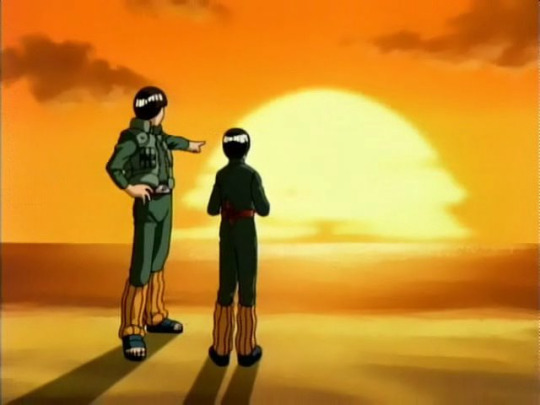
Sitting at the kitchen table, watching Guy and Lee devour the dinner you made, had you feeling nostalgic... You watched with your head rested on your hand. It was the little family moments that you appreciated more than anything else these days. "Yeah! and then I caught him in a cross block!" Lee said, describing their latest mission, his mouth full of food.
"Haha yes yes (y/n) you should have been there, our Rock Lee is becoming a real force to be reckoned with, much like his handsome sensei" Guy said with a wink in your direction.
"Handsome indeed" you said with a grin.
Thinking back to the days when you were a little more of a workaholic made you laugh. If you told your younger-self all those years ago that you would be Konoha's worst helicopter parent in just a few years, you'd have never believed it. Guy was a perfect match for you in that regard. You two were a well oiled machine when it came to parenting.
While Lee could do no wrong in your eyes, Guy was a bit heavy handed in his discipline of Lee's skills as a shinobi. You kissed every bruise and scrape, while Guy was teaching him how to prevent them in the first place.
Rock Lee has had more than his fair share of the short-end-of-the- shit-stick his entire life. BUT One could be forgiven for not recognizing the true level of hardship the boy has overcome in his short tenure as a shinobi. Lee is a true underdog.
Lucky for him, you've always been a bit of a sucker for an underdog.
You thought back to those early days......
Even before Lee evolved to a mini version of your childhood crush, you felt the need to protect him. Watching him fumble and practice jutsu in vain day after day.....early in the morning and into the night. You would watch him from a distance while training your own team. One early morning, you decided to check in on the boy with long black hair. He kicked at a post, counting off as you looked on...10....11.....12.....his kicks were weak even for his young age. As he got closer to 50 he fell back, overwhelmed by the pain of repetitively beating his shins into the wood without chakra to safeguard his bones.
Clearly angry at his situation, the thought occurred to you that maybe he wasn't using chakra because he couldn't....the boy had tears streaming from his eyes. It broke your heart to watch a kid who couldn't be more than 10, cursing his life.
"A kid working that hard shouldn't have to feel that defeated..." you said to yourself.
You felt conflicted. Torn between wanting to step in and takeover his training...but feeling the weight of responsibility that would come with encouraging a child to chase a pipedream that would only lead to disappointment. You knew all too well what happens to weak ninja. The reality was that it would be cruel to encourage the boy to peruse a life as dangerous as that of a shinobi. You were no slouch when it came to taijutsu but ninjas are able to compete with one another because of the advantages that come with developing kakai genki.
Could a boy with no use of chakra stand a chance against the generations of those families of ninja who use fearsome jutsu and tactics like lightning...wind....wood or even hereditary gifts like the dreaded sharingan or byakugen? The real answer was sad and harsh. No. He couldn't.
You wouldn't be so irresponsible as to tell the boy he could be anything but a failure.
If he perused that path, he would die young.
So you stood back, restraining the desire to comfort and nurture the little boy out of what you told yourself was mercy. Day after day, week after week....you watched on....until it became too much. You couldn't sleep anymore, couldn't function on missions the same way. Always thinking back to him still out at those training grounds.....always struggling.
....
One morning it was pouring rain. You called off training that day for your team and headed out to the place you knew he would be. He was there of course. He was doing his best to catch a cold while practicing hand signs to no avail. After watching him for a few minutes you finally asked, "What's your name kid?" speaking loud to project over the rain. Startled he looked up to where you stood, perched on a post a few feat away. "I...Im Rock Lee" he said timidly. You laughed at his shy but sweet face, "Im y/n" you said.
"Your kicks look like they could use some work", holding your palm about chest high, to show him where his blow should be landing. The boy grimaced...clearly angry with his lack of direction in training. You laughed and the both of you worked on his kicks for the duration of the morning.
"I think you'll be a splendid ninja someday" you said as you offered him a bit of lunch you packed. The boy looked up at you with the most heartbreaking fear in his eyes, "I can't use chakra" Lee said barley above a whisper, clearly ashamed to tell you the truth.
You ruffled his hair. "Look kid, life is shitty sometimes. But I can tell you are someone who will never quit. No matter the odds, and that is something worth more than all the talent in the world." He instantly smiled up at you, melting your heart for what would be the first of a million times. Laughing and showing you also first time you saw that shiny smile that you would come to love more that anything on earth.
From then on he was your responsibility. Your chest burned with pride in his concrete determination. Feeling instantly the protective burn and feral instinct to insulate him from anything that would hurt him.
....
It was about a year later when things evolved. You and Lee had become close. He, being an orphan as you found out he was, had taken your invitation to live in your spare bedroom. It wasn't long before you were nagging him to be sure and eat breakfast before class, take baths every night. You were often hearing your mothers voice echo in your own as you guided the child to a structure he lacked.
You even went to his parent meetings at the Academy, much to the surprise of Iruka (because he himself was 2 years older than you and had known you since you were smol) laughed when you asked to see Lee's reports.
----
Then one hot summer day you got the order... your team was dispatched on your first extended mission with your new genin. 3 months on a C rank mission to Suna. Your heart sank as you remembered Lee's graduation exam was in just a few days. Before you left, you kissed his forehead and promised a tearful Lee who had become just as attached as you over the last year, that would bring him back a graduation present.
You just knew he would finally pass.
....
Returning to the village near midnight you couldn't wait to see Lee. After giving report to Lord Third, you quickly made your way home. Quietly cracking the door to his bedroom, you peaked in to see his sweet little face. The snoring boy looked peaceful.
"He cut his hair?" you thought puzzled..."he must have done it himself, it looks a little odd." You laughed at the thought of him using a bowl to cut his hair.
Then your eyes traveled to the headband still around his forehead, "He passed!!!" you quietly celebrated, careful not to wake him up. You placed the promised gift on his dresser, a brand-new set of num-chuks you'd had made in Suna.
The next morning you were up before sunrise making a celebratory breakfast when an extreme round of knocking came from the apartment's front door.
You quickly answered, immediately flustered when on the other side was none other than Might Guy....the same Guy you'd had the hots for over a decade.
"Y/N!, I must have the wrong address! I was looking for one of my students!" Guy said in his familiar boisterous cadence. Laughing nervously you started to respond, when behind you Lee pushed his way through the doorframe. Your eyes widened at the sight.
The haircut made sense now, Lee stood side by side with his sensei. He was wearing Guy's jumpsuit... they could have been father and son.
Looking at the two of them standing side by side in front of you for the first time gave you the most jarring sense of dejavu.
"Guy sensei! Look what Y/N brought me from her most dangerous mission!" Lee brandished the weapon, beaming up at his teacher who laughed and winked in your direction. "Ah, a great choice! Only the most skilled ninja know how to use such a fine weapon! We must enlighten you at once Lee my boy!" With that the handsome jonin and your sweet Rock Lee were off to train.
You had known Guy since he was still struggling to gain entrance to the Academy, you knew that the man who radiated confidence today, only earned that ability through blood, sweat, and tears.
You apprehensively accepted that Might Guy was a good match to be Lee's sensei.
"Be careful!" you called, more than a little apprehensive at the thought of your sweet baby boy training with such an admittedly impulsive man. Feeling a small tug of sadness as you watched the two of them disappear down the street.
"Lee's getting tall..." you though as you closed the door.
....
Over the next few years Lee had grown into a strong young man. You felt such extreme pride in everything he did. Even though you being in your mid-twenties were not nearly old enough to be Lee's mother, he had taken to occasionally calling you mom.
Lee was never embarrassed of you as he grew into a teen like some of the other kids his age. He was always just as willing to give you a hug before a mission as the day you met him.
It would be a lie to say that the relationship you and Guy shared hadn't also matured along the way. Although you weren't Lee's biological parents, anyone would be forgiven for thinking that you were. Everything you had admired about Guy, his hot-bloodedness, his devotion to youthful perseverance, his love of his village had been passed down to your surrogate son.
It was only natural that you and Guy would become a team in raising Rock Lee. Over time after a few years of dinners, training sessions, birthdays, holidays etc...Guy decided to propose to you.
It was a literal dream come true. You couldn't say yes fast enough. But as required when two shinobi become married, when you went to sign the paperwork to make your marriage official, requesting a stamp of approval from Lady Tsunade....she extended to you a folder with a second set of forms.
Guy beamed as you read the contents. Adoption papers with Lee's name printed at the top in bold.
"He will always be our son. Since we are making it official... why not add one more?" Guy said with a laugh. The tears began welling in your eyes. "He's 17" you laughed, "I love you" is all you could think to say in response to the most kind gesture you have ever witnessed.
Guy held his trademark thumbs up high as he replied, "Lee will always need his mom, no matter how big he gets!" His words like music to your heart...
You'd never felt so complete as you walked hand in hand with Guy, on your way home to surprise your sweet son with the news.
Upon telling Lee what the two of you had done, he looked from the papers back to you. Confusion spread across the sweet ravenette's features. "But I do not understand" Lee said with a hand rubbing the back of his neck. "Have you not always been my mom?"
The innocent look in his eye and profound sincerity in his voice made tears well in your eyes for what felt like the tenth time that day. You laughed and swept he and Guy into a hug that didn't last long enough. "What's for dinner?" the two men asked in unison and in that moment you knew you were the luckiest person in the world.
#rock lee#might guy x you#might guy relationship#naruto imagines#naruto#naruto fanfiction#might gai imagine#might guy fanfiction#rock lee fanfiction#parenting with maito#rock lee's mom#maito guy#rock lee imagines#rock lee x y/n#team gai
70 notes
·
View notes
Text
gold rush + iwaoi
so several days ago i made a post (also copied below) about gold rush and iwaoi, specifically iwaizumi’s pov, and. since then i have had Many More Thoughts....
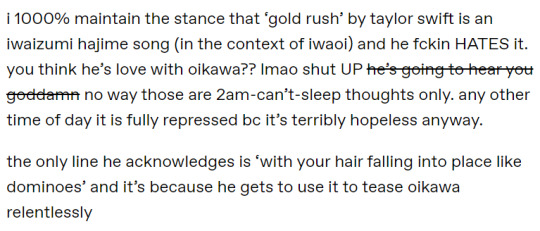
an expanded version of the tags on that original post:
'i don't like anticipatin' my face in a red flush' you're trying to tell me this ISN'T iwaizumi's mood when he spends time with oikawa?? he absolutely loves hanging out with him and it's something they've always done. they spend more time together than not. and YET. he hates that he knows he'll get flustered because of his feelings and oikawa doing dumb half flirty things. it’s EMBARRASSING getting all blushy especially when oikawa Absolutely Cannot Know about his feelings. but he's not going to NOT spend time with oikawa. firstly because oikawa would kick up the biggest fuss and secondly because again. he genuinely enjoys being with oikawa. so. he’s just gotta live like this now ://
also oikawa is CANONICALLY like. i dont want to say playboy. but he gets a lot of attention from girls. and iwaizumi is canonically both super aware and super tired of that. which........ 'everybody wants you/everybody wonders what it would be like to love you'...... THAT’S HIM... CANONICALLY..........
'i see me padding across your wooden floors/with my eagles t-shirt hanging from the door' the DOMESTICITY of this!!!! if the two of them ended up like. staying near each other for college. you KNOW this would happen. replace 'eagles' with university/v-league merch. im RIGHT. you KNOW IT. i would have liked to see it. *shakes fist at sky* furudate WHY
'At dinner parties I call you out on your contrarian shit' ok this is just their canon relationship iwaizumi also hard relates to this except it also happens outside of dinner
'My mind turns your life into folklore/I can't dare to dream about you anymore' THIS ISN'T TIMESKIP IWAOI???? YOU DARE TRY AND LOOK ME IN THE EYES AND TELL ME THAT ISN'T A TIMESKIP IWAIZUMI MOOD? SEEING HIS BEST FRIEND DO GREAT THINGS HALFWAY ACROSS THE WORLD. KNOWING OIKAWA'S IN A DIFFERENT ORBIT NOW. KNOWING WHATEVER HOPES HE HAD FOR THE TWO OF THEM ARE LIKE. CLOSE TO IMPOSSIBLE NOW. AND YES HES SO DAMN PROUD BUT GODS FORGIVE HIM IF HE'S JUST A LITTLE HEARTBROKEN, BECAUSE 'IT COULD/WILL NEVER BE'..! i have many a feelings about timeskip iwaoi, can you tell?
he FULLY resents all of this, by the way. he hates that it fits his situation so much. partly because he cant believe his life is a stereotypical crush song. partially because god d a m n did it have to call him out so strongly??? did it really????? unFAIR!!
and now for new thoughts.
“And the coastal town/We wandered round had never/Seen a love as pure as it/And then it fades into the gray of my day-old tea/'Cause it could never be”
miyagi is a coastal province.......... uc irvine is also pretty damn close to the coast...................................................... san juan not so much but shh. GOD. had never seen a love as pure as this!!!!!!!!! whether romantic or platonic their BOND.. it is just so Strong and like. literally everyone can see it. they were introdUCED as a pair by kageyama if i’m not mistaken. i need to rewatch hq hweklsdjfl for fun if not for anythign else
AND THEN IT FADES INTO THE GRAY OF MY DAY-OLD TEA ‘CAUSE IT COULD NEVER BE ALWAYS HITS SO HARD. i cried about this earlier in conjunction with ‘i can’t dare to dream about you anymore’ but.... iwaizumi hajime (26), athletic trainer, waking up in the morning to get ready for work, making breakfast. wondering.. maybe, if things had turned out differently, would he have set out a second plate? wondering if there would finally be a use for that stupid coffeemaker oikawa bought him as a housewarming present, when the asshole knows he doesn’t even DRINK coffee??? he doesn’t know why he even keeps it anymore. might be put to better use with someone else. but then he dumps the tea leaves into the sink and leaves for work and Does Not Think About It Anymore.
in the reprise when it changes to “the coastal town we NEVER found”...... as of canon, they never did find a place where they could both settle.. together..... HMM
“I don’t like slow motion double vision in rose blush” i have this hc that iwaizumi... very much likes to have things in control. whether like, being on top of all his assignments, or emotionally. he likes being settled. he likes knowing what’s up. but nOW. with this stupid crush? love? whatever? his heart is pounding and he can’t stop looking at oikawa and the worst part is that he’s BLUSHING all the damn time?? absolutely TERRIBLE!!! terrible, i tell you!
also like. oikawa has a monopoly on his free time, his personal space, his physical belongings, and now on his goddamn FEELINGS too?????? this should be illegal.
“Eyes like sinking ships on/waters so inviting/I almost jump in” god knows that if Oikawa had asked, Iwaizumi might have actually followed him. and that’s all I have to say
based on a brief listen-through of evermore i feel like willow, dorothea, and tis the damn season might also be iwaoi songs....... i might do a dissection of those songs as well if there’s interest/if i get the vibes
#iwaoi#iwaizumi hajime#oikawa tooru#haikyuu!!#haikyuu#hq#gold rush#taylor swift#ugh. brainrot#i have not been able to stop thinking about this for SO long#emmas thots#disclaimer that i haven't finished the manga so there might be some stuff that contradicts canon#these are just my thoughts based on the hundreds of fics ive read and also based on the manga spoilers i've seen
19 notes
·
View notes
Text
Best Misaki Moments (imo)
will do an usage and romantica version next
warning: very long post, lots and lotssss of large images

the moment where misaki became my fave character

misaki found him hawt in a suit ovo

vol 1 misaki is best misaki tbh nakamura what have you done

hahahahahahahaaaaa
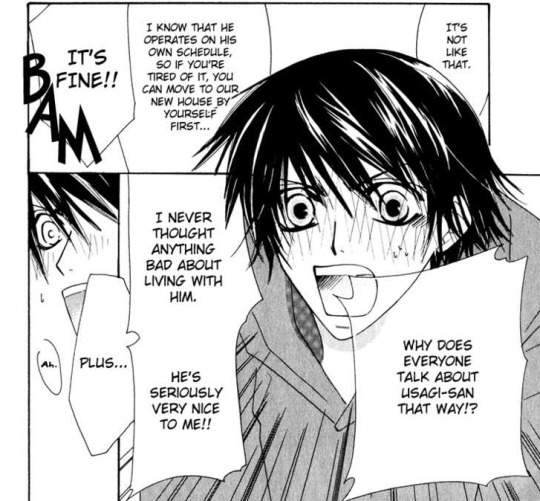
nobody badmouths hubby! >:(
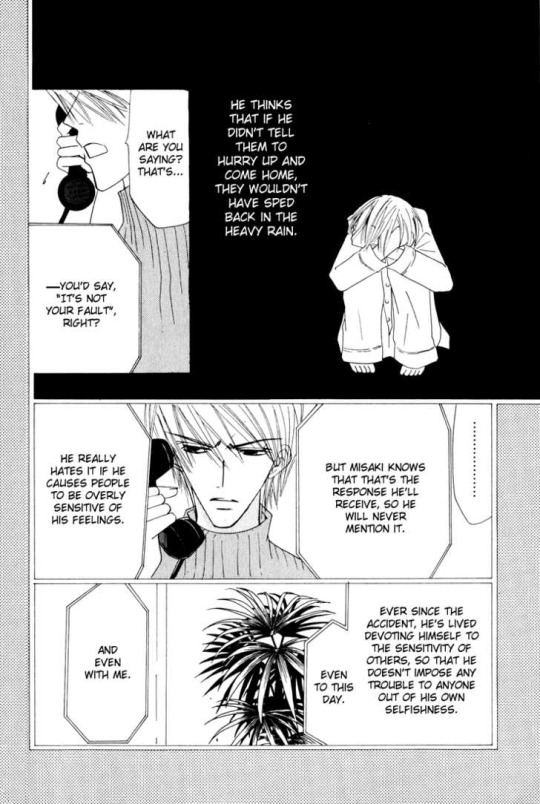
the scene that made 13 year old me shook and cry ;-;
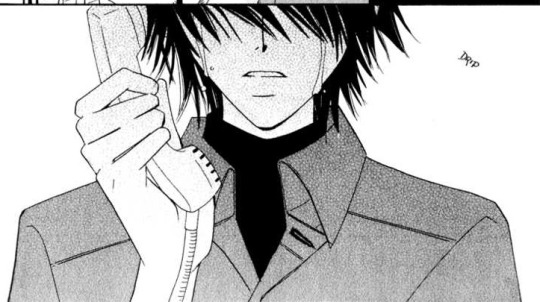
BABY CRY ME CRY TOO :”(

misaki when hubby said it’s his first time going for a trip with someone for fun mann can i include the whole train chapter it’s sooo good
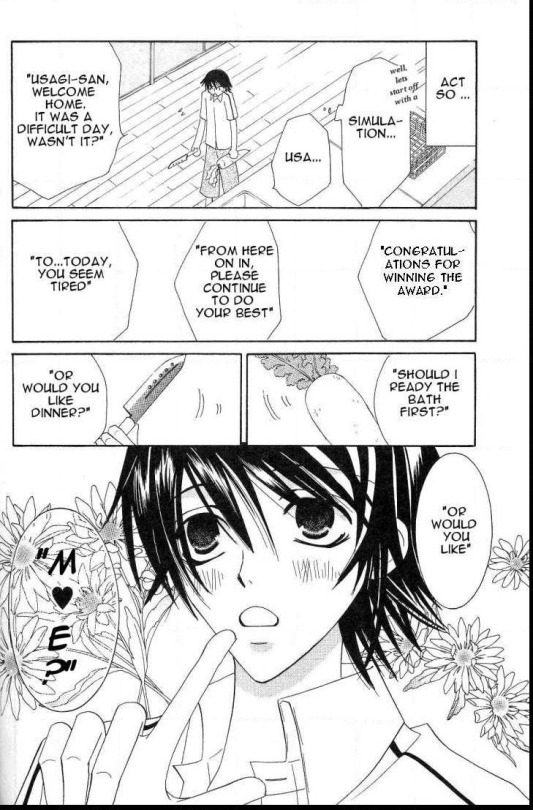
misaki’s subconscious hahahaha

OwO

misaki just spent a whole chapter thinking how to reward his hubby and his final decision was this
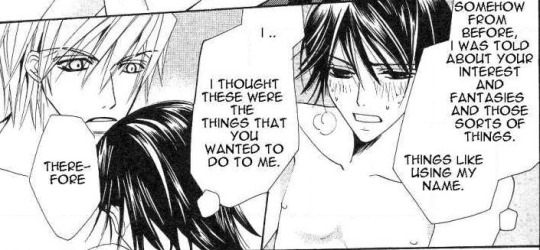
THEREFORE I SHALL OFFER MAH BODY
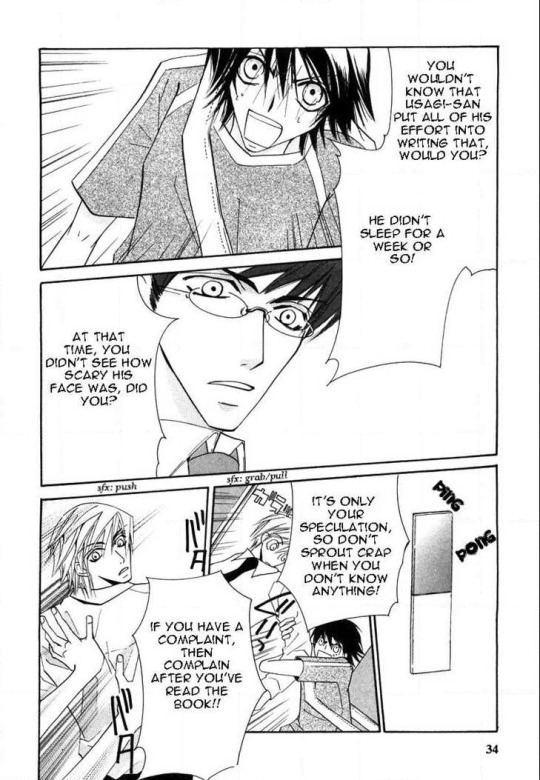
you tell him misaki! >:D
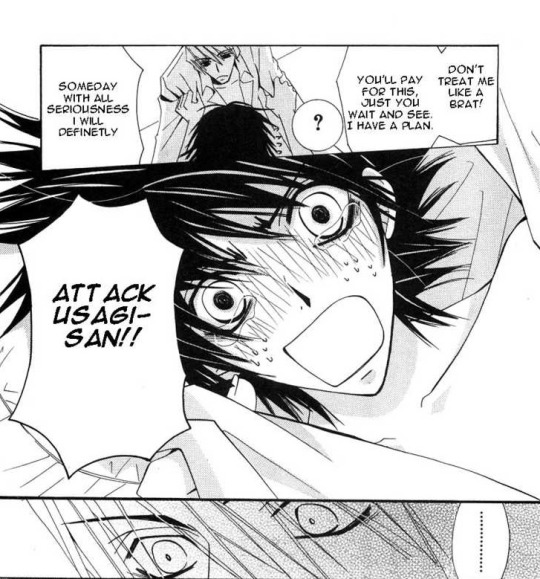
many ppl wanted misaki to top for once after this scene but me? POWER BOTTOM MISAKI

U NO TOUCH MAH MAN HES MINE #OAO
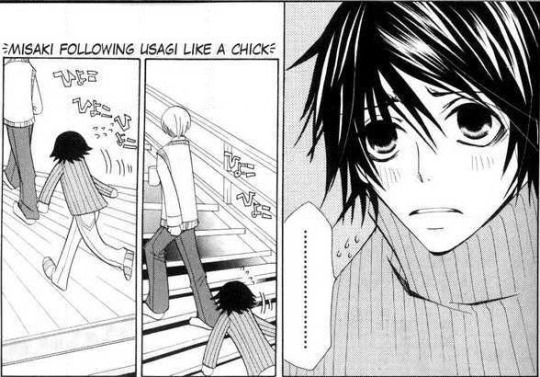
notice meeee :”(
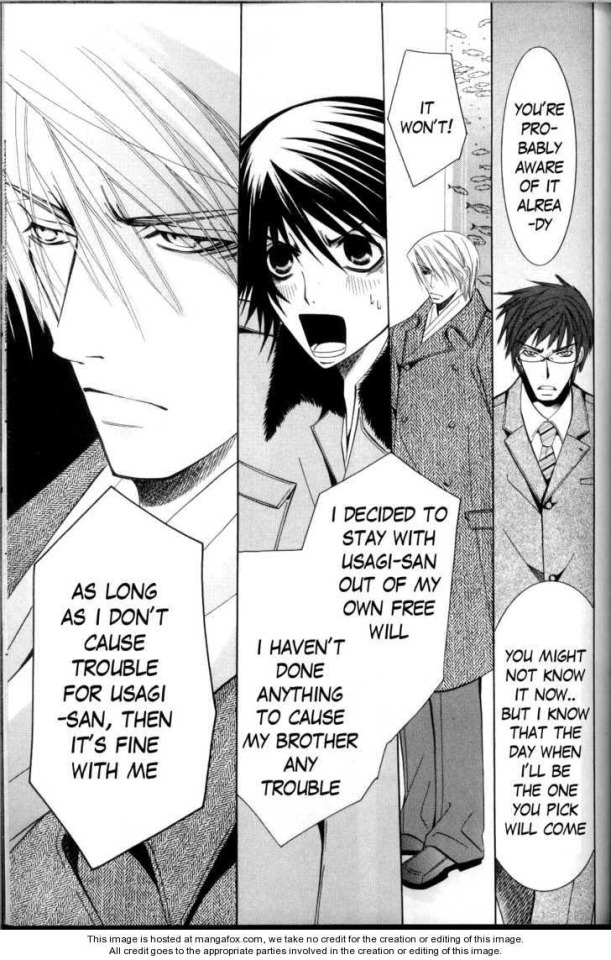
usagi-san did nothing wrong I WANT TO STAY WITH HIM! DD:< (i noticed alot of ppl wished misaki would reject ijuuin in this fashion back then)
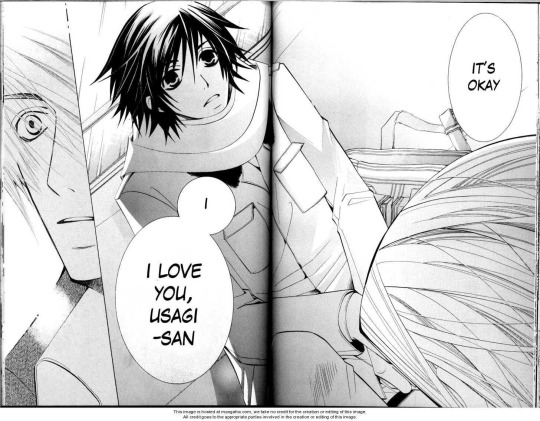
i love how nakamura ended this arc on a perfect note :”““)
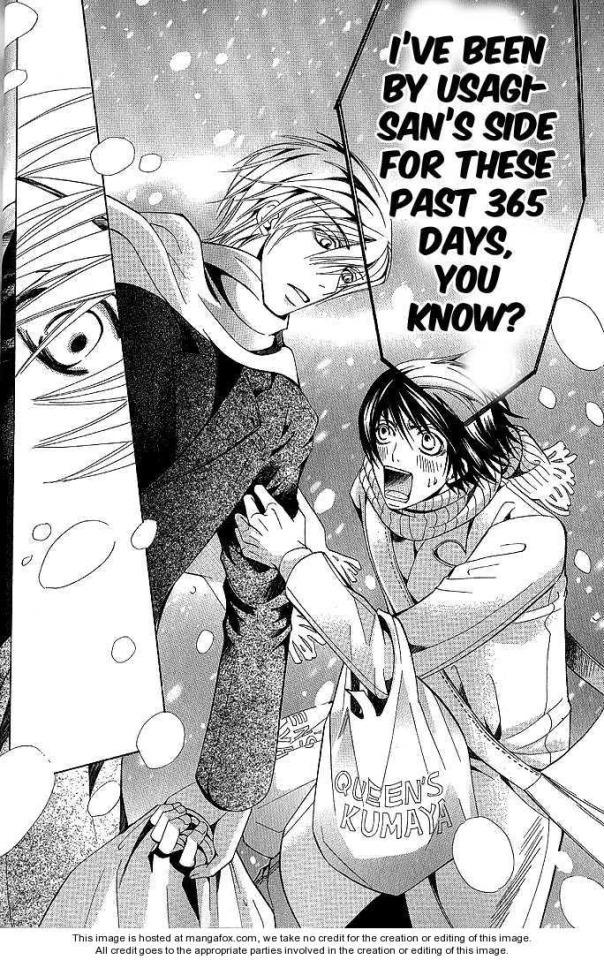
usage: ive known takahiro for 15 years
misaki: AM I A JOKE TO YOU?! >:U
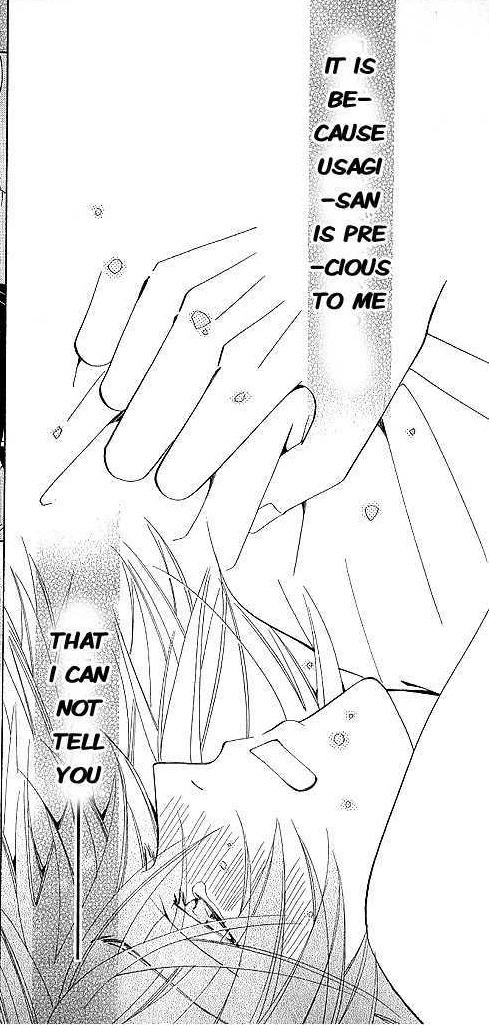
I HATE FUYUHIKO >:”“““(

the reason why misaki chose usage over haru :”“(
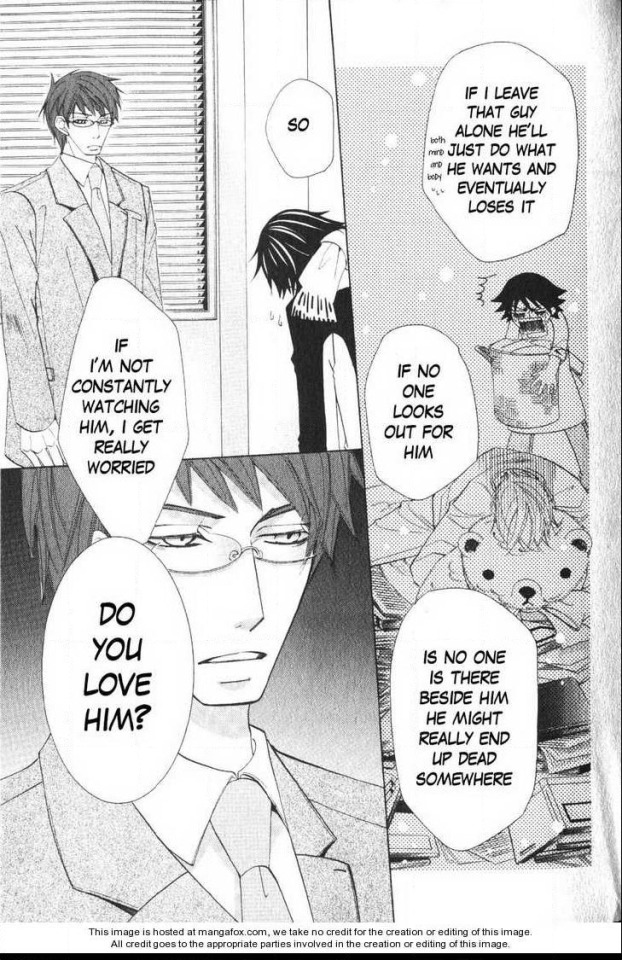
y no one loves me like misaki loves hubby :”“““““““(

misaki saved hubby!!! (a rare scene where the anime did it better, but welll hardly the anime did the manga justice)
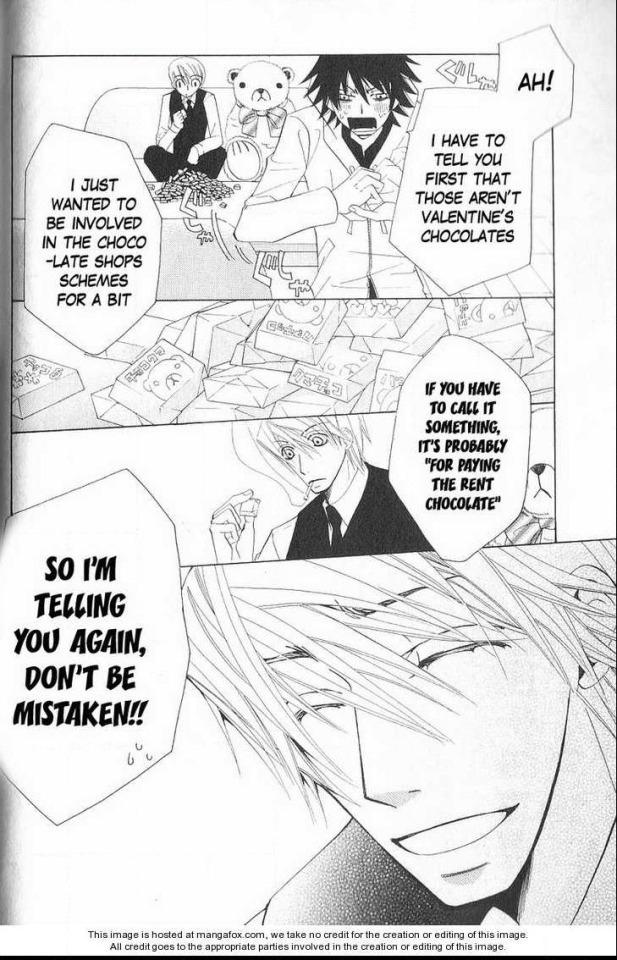
giving someone chocolate during valentine’s day? yeahhh, totally doesnt mean anything :^)

if someone’s going to say misaki is a bad character im gonna stab them

i realized there is not a single fave moment in the mizuki arc even tho i didnt skip it while rereading (aka the WORST arc and the WORST COUPLE tbh the cousins are soooo annoying EVEN IN THE LATEST ACT 51 and everytime they appeared im having a second-hand embarrassment) finally a fave moment came right after they left nakamura istg if they are going to appear again in the future i hope their plane will crash
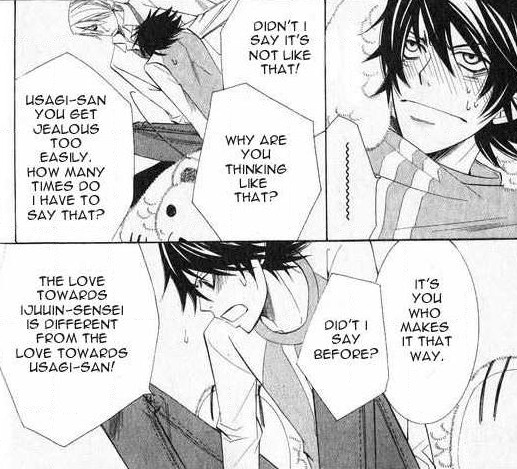
(i acknowledge this scene as the beginning of ijuuin arc and nothing have to do with mizuki arc)
annnnnnd misaki will repeat himself for many times regarding who he truly loves but guess who’s going to listen to him in-universe and in fandom
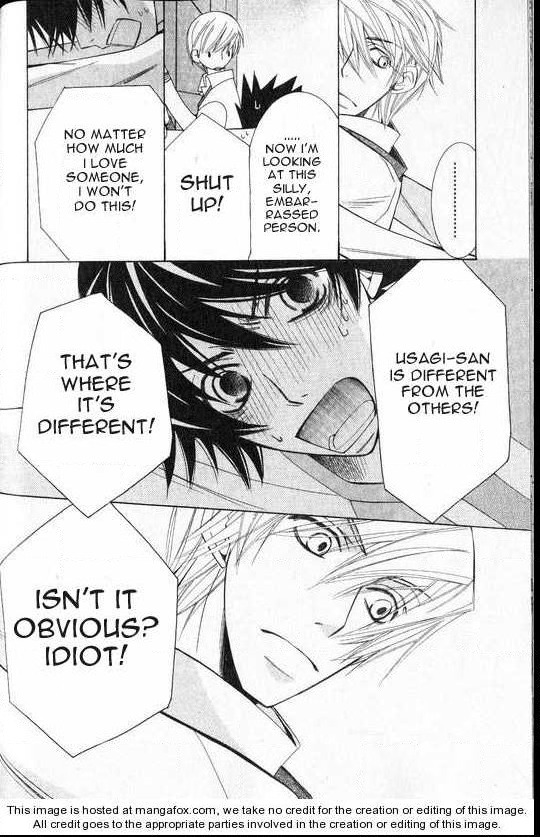
if nobody wants to listen then you say it with your body then b^w^b (it’s not a question abt who misaki loves anymore. it’s abt who’s misaki gonna BANG)

MISAKI’S DOMINATING ...not
(but nakamura pls fulfill misaki’s wish someday poor him)

misaki decided to thank usage by offering his body to the perv bunny
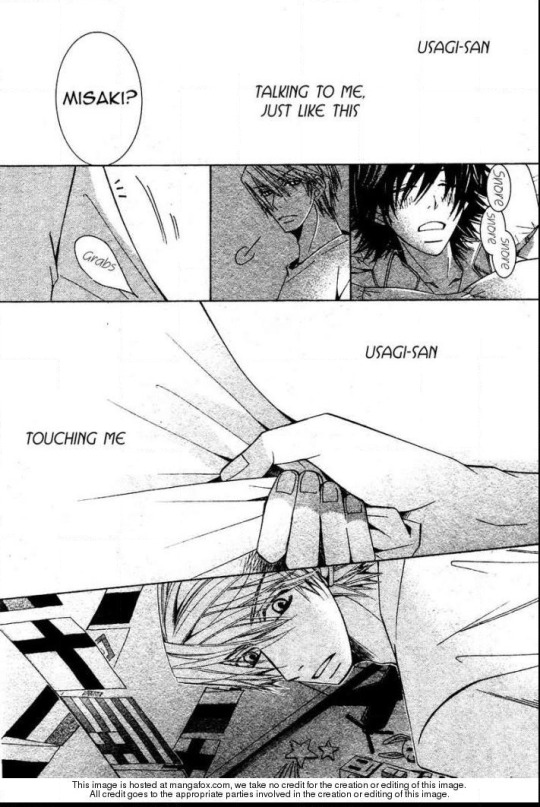
dont you think you can steal hubby away while misaki sleeps

usagi-san is S P E C I A L
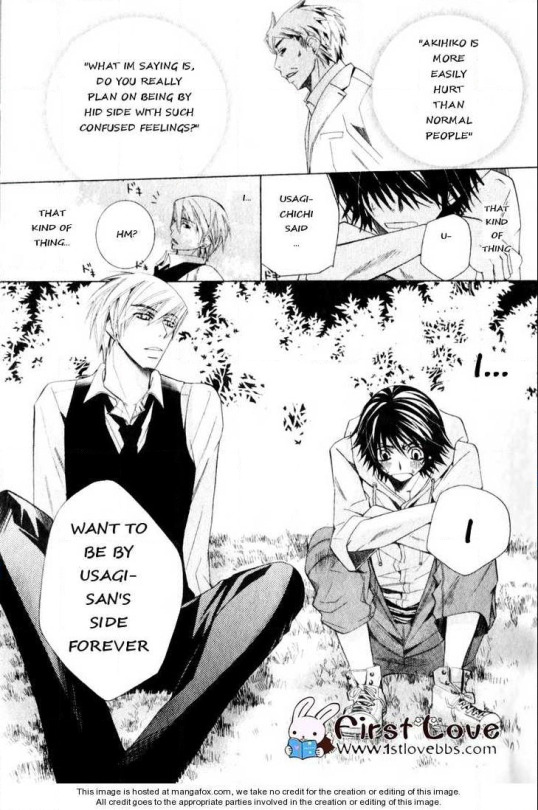
:”0
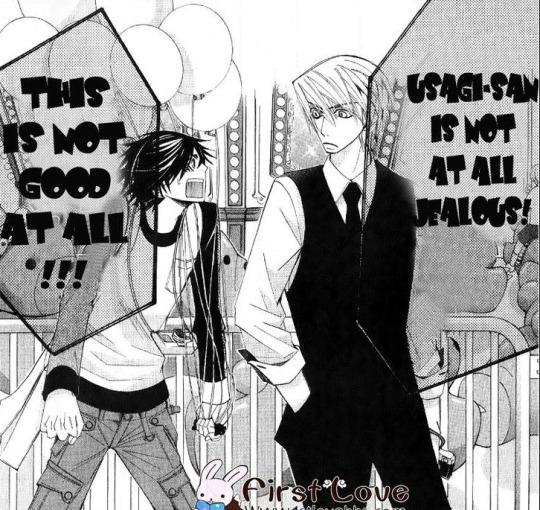
hubby not jealous. misaki triggered D:<<<

MISAKI IS PRECIOUS BABY
when s3 was airing i was looking forward for this scene the most. i was confident that sakurai will deliver this scene perfectly... URGHH STUDIO DEEN I WILL NEVER FORGIVE YOU FOR DOING MISAKI DIRTY

best kiss scene eva lol i love their banters xD

misaki being sweet

misaki pampering the hubby
misaki in this arc: rejected ijuuin many times, making love with usagi 24/7, fanboyed over ijuuin only for the goodies, made love with usagi, came to ijuuin’s house only bcs of work, and did i mention making love with usagi
some ppl: OMG MISAKI LOVES SENSEI MORE THAN USAGI!!!! D:<

i still remember how legendary this chapter is. too bad the anime failed to convey the feels just like in the manga

say what you want abt junjou but this is top notch writing
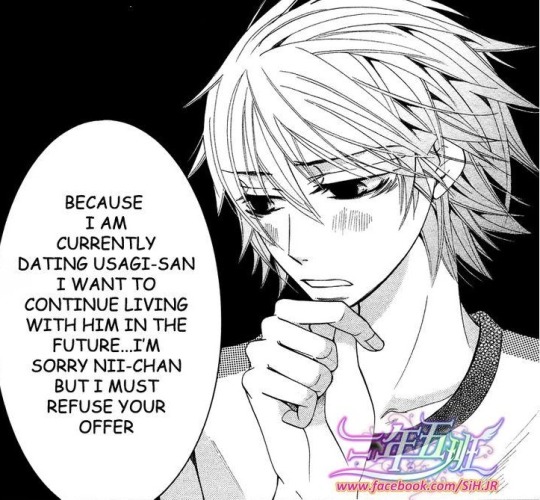
( ͡° ͜ʖ ͡°)

when ur landlord is brought up and the first thing you do is ask abt a couple struggling to stay together yeaaaahhh totally not suspicious misaki
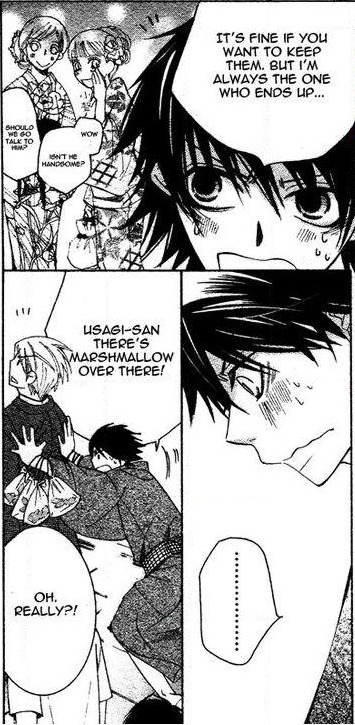
bish what u say abt mah man hes mine >:(
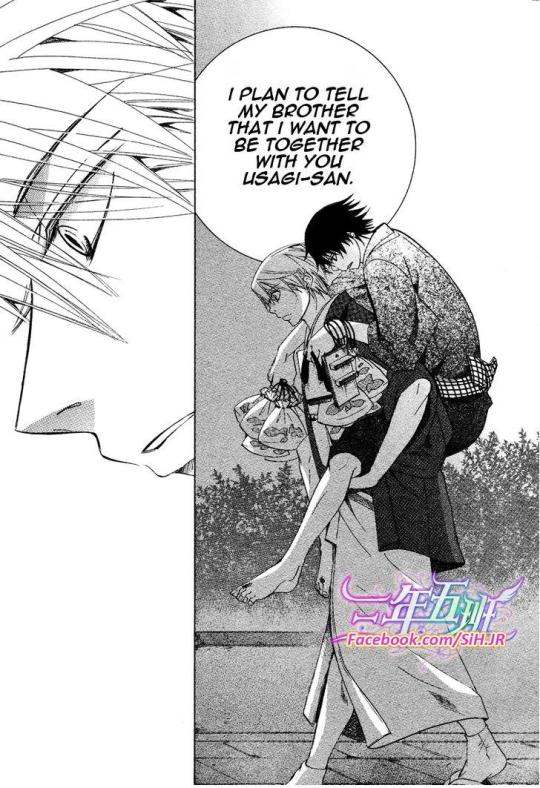
prepare for me screaming in 3... 2... 1... AAAAAHHHHHHHH

AAAAAAAAAAAAAAAAAAAAAAAAAAAAAAAAAAAAAAAAAAHHHHHHHHHH

AAAAAAAAAAAAAAAAAAAAAAAAAAAAAAAAAAAAAAAAAAAAAAAAAAAAAAAAAAAAAAAAAAAAAAAAAAAAAAAAAAAAAAAAAAAAAAAAAAAAAAHHHHHHHHHHHHHHHHHHHHHHHHHH
serious from this point 95% of misaki’s pov will consist of him angsting abt getting apart from his hubby in every chapter onward

misaki rejecting ijuuin for the 9749294694214692746829487th time

misaki hugs back :”O
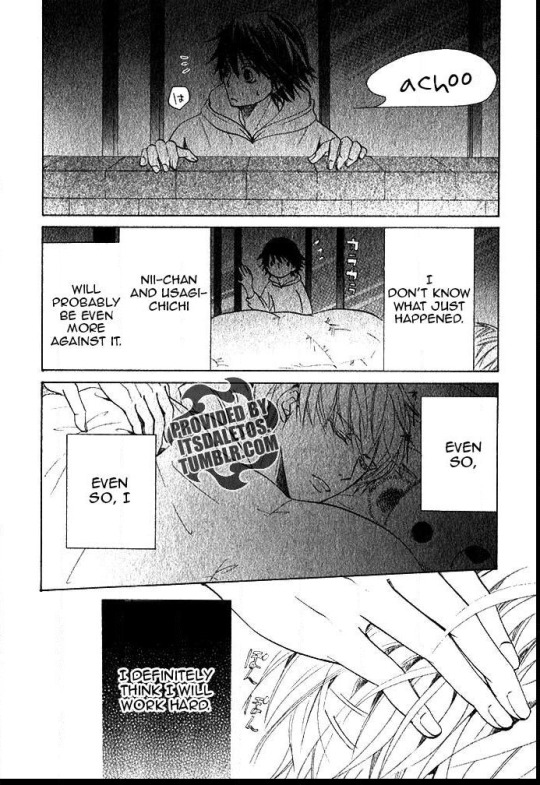
tucking the hubby he cold :”““(
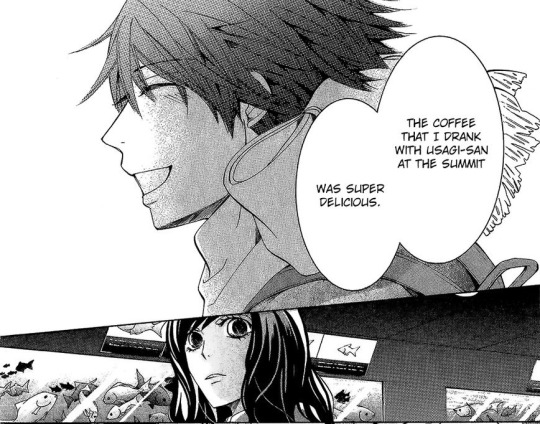
yea, totally not obvious ( ͡° ͜ʖ ͡°)
i love how blatantly in love misaki is with usage and everyone can see it. even ijuuin himself noticed

baby doesnt want to lose hubby :”“““( baby is scared
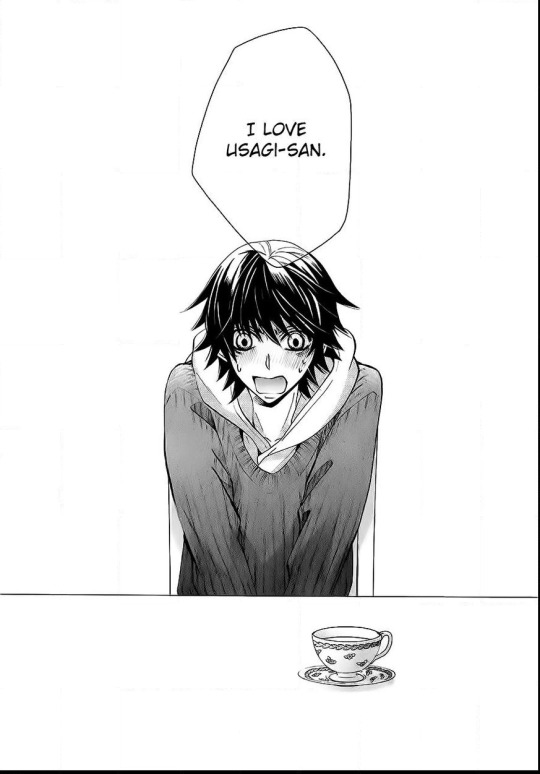
S H O O K
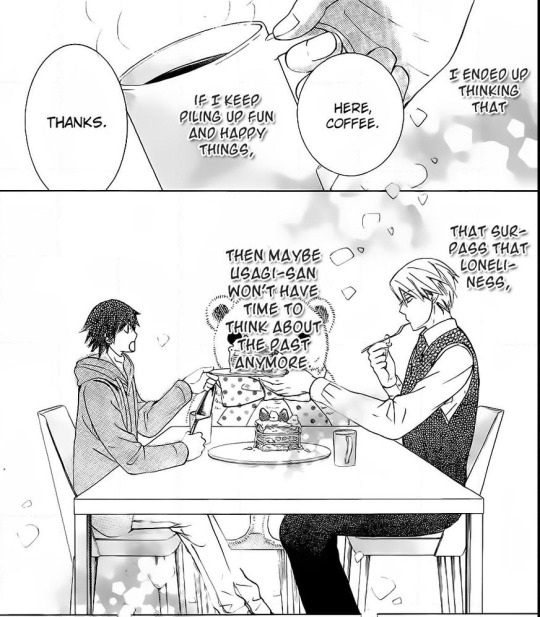
if you dont find this heartwarming you’re heartless

smart way to make him not spend more money ^v^
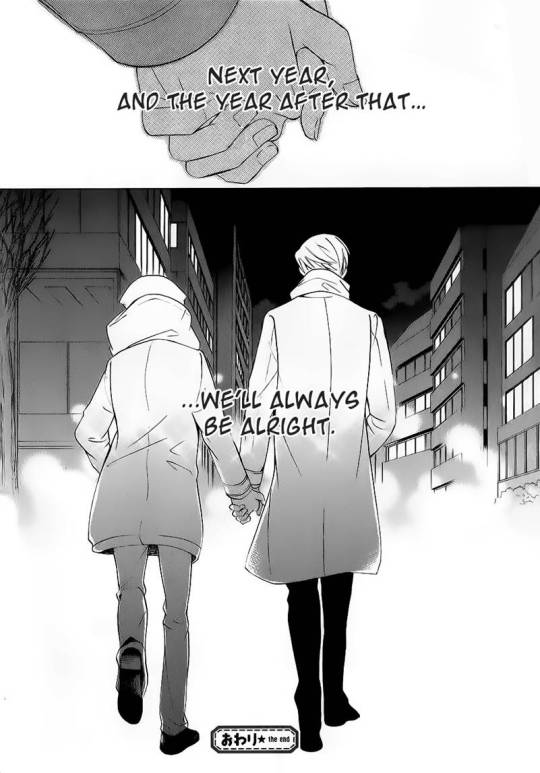
D”“““““““““““““““: me ded again

misaki being a badass >:D from someone denying his feelings for akihiko in the beginning to straight up telling the parents he’s going to stay with hubby that’s some awesome character growth bravo bravo
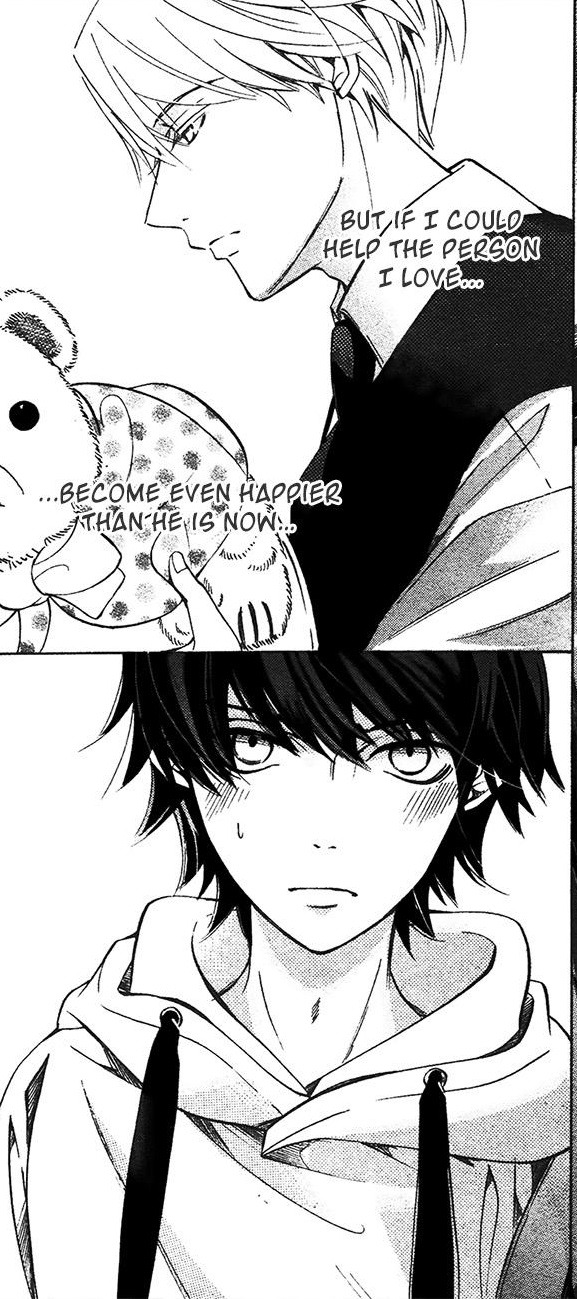
that’s some determined shonen mc resolution OvO
aanddd finally...

AND IIIIIIIIII WILL ALWAYS LOOOOVE YOUUUUUUUUUUUUU -
76 notes
·
View notes
Text

hey hey everyone! this is my first time in seongnam and i’m super excited to be here. it’s kind of late for me, but i wanted to throw up an intro for my boi before i head to bed, so here we are! this is noh joowon, twenty two year old junior. he’s an animation major and a pretty popular BL webtoon author, but that last part is a ~*secret*~. he’s pretty loud and outspoken and often times annoying but he’s a... well... not good boy but a fun boy? anyway! i have his ABOUT, BACKGROUND, and PLOTS pages up if you’d like to take a look, but i’ll drop some info and wanted connections under the cut! and if you’d like to plot, please hit like on this post and i’ll pop into your ims, or you can reach me on TWITTER if you’d prefer to plot there! ♥️
QUICK FACTS !
so tl;dr - 22, a junior, majoring in animation with a minor in art. wanted to do things the other way around but he fucked up his registration forms and went with it
is also a pretty popular BL webtoon author under the pen name byungari (you can find more info about his webtoons here). only a handful of people know about this... it’s a Big Secret, he’ll have to end you if you find out
basically, entered a webtoon contest online in freshman year - didn’t win, but the company asked him for a story outline and quickly sent a contract over for a serialized webtoon to be published online. it did well, and then he got a contract for another one which was also well received/ranked
long story short, he just recently started publishing webtoon #3 which takes some heavy inspiration from the seongnam campus, so you’ll probably see familiar landmarks and faces if you follow it closely... honestly, he’s not all that subtle
anyway! he has a makeshift studio in the student centre and an assistant to help out with meeting deadlines and such. even then most days he barely submits his work on time and he’s always drawing in class instead of paying attention
considered a campus cryptid because he barely attends class and yet manages to pass most things... actually he’s there, just tucked in the back napping or quietly taking notes. he doesn’t participate much unless whatever’s going on is ‘interesting’
it’s just weird because he’s v. loud and opinionated otherwise - will get into debates right in the middle of class when it’s a subject he’s passionate (and right) about. some of his classmates are just straight up scared of getting into it with him
part of the art club (nominally; he joined because he felt obligated to but he doesn’t participate much), the cooking club (kinda; he’s just there for the food and also never like... ‘officially’ joined), and the paranormal club (this one’s legit. he loves paranormal stuff)
is the baby of his family; has 2 older siblings but they have a significant age gap with him so they were never close while growing up. they’re both like... very academically aligned with ~respectable careers~ (professor and doctor) so sometimes joowon feels like the odd one out with his focus on animation/art
his parents are divorced - dad has a whole other family that joowon has complicated feelings about!! he doesn’t like to think on it too much. was raised primarily by his mom while his dad really just pays for his education and stuff. compared to most kids from divorced homes he feels like he’s pretty well adjusted
his family isn’t super elite or wealthy, but they’re probably like... very comfortable but also very well connected with people who are considered elite (dad’s a lawyer and mom is the chairman/director of a elite private academy)
incidentally, went to that private academy before attending seongnam. it was very academics focused even though joowon was... not. but his parents are like whelp we did it right with the first two kids so it’s okay if kid #3 is into art and shit as long as he graduates from a good uni! hence him being at seongnam
really, his post graduation plans are just ‘i am going to make more webtoons and then maybe work in animation’ and he’s pretty happy with that
he’s very... hm... very blunt and straightforward in most of his dealings with people. super loud and confident and doesn’t hold back even if there’s a risk he might offend someone. he’s also pretty impulsive and short tempered so it doesn’t take much for him to go off. like, he’s passionate about a lot of things and sometimes that explodes out of him in a not-fun way
but he’s also like a very open, easy-to-befriend kinda guy, super supportive of his friends and generous where it counts. he’s very loyal and the kind of person who’d fight you but also fight FOR you in a heartbeat. he hates unhappy endings so he’s always trying to low key look out for his friends even if!! admitting he cares is embarrassing!!
he’s a cute kid who can be a lot sometimes. please be his friend anyway
WANTED CONNECTIONS !
friends!! some super casual friends to spend time with in between classes or grab a bite to eat with - he’s honestly pretty friendly when it comes down to it and even if you don’t know him well, he’ll probably consider you a pal. maybe you got paired for some activity during freshman orientation and stuck together, shared classes in the past, etc. you just know joowon as an entertaining dude
fellow animation / art majors or minors!! classmates, people to get stuck doing group projects with, we always work on our assignments together, looking for an empty studio to write and found you there so uh can we share. or on the flip side, department rivals?? getting into arguments / heated debates in the middle of class and getting sent out? always competing to see who’s better but they’re both good!
art club members who are like please come to a meeting please please come to just one meeting - or, y’know, forcibly drag or trick him into participating. someone who recruited him into the art club to begin with and now they have regrets. someone who finds an old exhibition piece he did for the club or something and is like omg please come back sunabe i want to learn from you--
cooking club members who he kind of follows around because they make really good food. people who don’t realize he’s not officially in the club and try to get him to participate but he’s like these hands are not made for cooking. someone who does realize but is like aw he’s harmless let him hang around. let him lick the spoon--
paranormal club bros... it’s the one club he’s actually serious about for reasons unknown (actually, it’s known: he wants to fuck a vampire) so members who share similar interests or just like his intensity or just think he’s a riot. maybe they try to film their own version of buzzfeed unsolved and hit up a bunch of supposedly haunted places or chase paranormal activity idk
people who read / have read his webtoons! whether they’re fans of him or antis... maybe someone he’s friends with irl who reads every update but doesn’t know he’s the author, or someone he’s friends with irl who hates the webtoon and joowon has to stop themselves from fighting them. or like... interacting on twitter about the webtoons, someone who writes fic or draws fanart and always dms it to him, idk, someone who leaves hate comments whom he fights with on a sock account??
he has a weird relationship with sunbaes in the sense that he can get really needy / attention-seeking around them (maybe he craves the close older sibling figures he’s never had in his life!) so sunbaes he can bother / be cute around. whether they tolerate him, shoo him away, or take care of him... idk
enemies?? for various reasons - maybe they’re rivals, maybe they just pissed joowon off or vice versa, maybe they just made eye contact and challenged each other to a fight pokemon style, maybe he just can’t stand the way they act, but enemies are fun...
some romantic connections like exes? hasn’t dated much recently maybe a few people in the past, or like people who have confessed to him but he turned them down pretty callously. or someone who falls in love with his art and thinks that means they like joowon but when they try to get to know him they’re like oh... oh no
i know i missed a bunch of stuff but i have more specific plots here if nothing sparks your interest + and i’m always open to brainstorm something as well!
10 notes
·
View notes
Text

Ivy Fairchild (Aisha Dee), 26, Female, Bisexual ━
( hi hi, I’m tasha! and this is my daughter ivy fairchild! it’s been a couple months since I rp’d her skdkdoa This is tech an alt. version of her since the og version does not necessarily fit with the rp. you can IM me here, on tumblr, or message me on my discord dumbass#9361 )
bare with me, this is gonna be a long mess akdkdka, I’m sorry
ivy fairchild was raised by her grandparents
her mother died when she was 2 years olds from a car accident and her father was deployed into the army
her mother, sophia, had a one night stand with a married man. she didn’t know at first until she saw his ring on his finger the next morning.
sophia was disgusted and left, wanting to forget that night but ended up finding out weeks later that she’s pregnant
she didn’t know what to do, she was was only 23 and she didn’t want to tell the guy she was pregnant. she didn’t want to ruin a marriage and she didn’t want to raise a child alone. so she went to her best friend and begged him to help her.
her best friend, luke, was heart eyes over her so he agreed to help her with the baby and telling everyone he was the father
so she did and here came along ivy woooo ( I’m a messsss )
after Ivy’s mother passed she moved in with her grandparents who then moved back to Australia to be with family. They came back to Frostford when Ivy was 8 years old
luke was deployed into the army. she only got to see him during the times he was allowed to have vacations visit
ivy grew up helping her grandfather with the family’s farm ( since she an only child and it was getting hard for him to do it alone )
ivy loved anything that had to do with flowers, painting/drawing, and animals
ivy would constantly asked stories about her mother whenever her grandfather wasn’t busy
when she was 12 luke came back home, he was on two years of inactive, which she didn’t fully understand what that meant but all she knew was that he was home, for what she thought, permanently.
there was a lot adjusting to do for everyone
it wasn’t until a year after luke has been home that when she found out the truth about her biological father
everyone was mourning the loss of ivy’s grandfather. it was a hard time for ivy, but she was trying to be strong for her grandmother
she helped packed her grandfather’s stuff away with luke a couple month after he passed.
her grandfather seemed to have a few boxes of things that belonged to sophia that ivy didn’t know he had
ivy found her mothers journal, keeping it hidden so she could take it with her to her room when she was done helping luke. she read every single page. including the one where she talks about how luke wasn’t her biological father ( dun dun dunnnnnn ) ( aejkgr;i ignore me )
ivy was angry and confronted luke, because a part of her was really hoping what her mother wrote was a lie
but alas it wasn’t and young ivy did not respond well to any of this. her emotions were everywhere. she basically gave him the silent treatment for a long time.
ivy’s grandma tried to talk some sense into her, but she was too stubborn to listen. it wasn’t until she heard that luke was going to be redeployed due to some conflicts that she regrets not talking to him.
that was the only day ivy ever skipped school. she went to luke’s apartment instead to apologize before he left town, very emo moment
Ivy left town in August after senior year for college Auburn University
Ivy and her best friend Lucinda decided to start their own business of using honey to make candy. She majored in business and minored in social work in Auburn University
Two years after graduating Ivy noticed that her grandmother’s health was starting to become questionable. She was living on her own but she decided to move back in with her grandmother until they figure things out
They found out that her grandmother was diagnosed with Alzheimer
Ivy has completely taken over the family’s small farm while helping around the house and taking care of her grandmother
Luci moved in to help out with the farm so that Ivy can have more time looking after her grandmother
Ivy refused to let her grandmother go into a nursing home, even when she started getting worse. She believed she can take care of her. But after having a long talk with Luci, she finally decided to place her in a nursing home ( she still thinks about this decision and a bit of a mess b/c of it )
luke, now working with Frostford’s fire department, does what he can to help ivy take care of things when he’s not on duty.
She’s someone who tells everyone she’s fine when she is clearly struggling. She’s a mess but she tries to come off as if she’s not
She a mix of the outgoing-fun friend and the grandma friend
She has a southern and Australian accent
She is a sweet girl, very caring and silly. She can come off as shy in a way. She’s an active person and up for an adventure ( sometimes argsfd ) but doing thing in from of people makes her want to kermit ( she’s working on that )
Wanted Connection:
BEST FRIENDS [1/2] -NAME UTP & LUCINDA MAE BENNET — these three have been friends since they were kids. they weren't exactly the kind of people you would expect to be as close as they were. all three different as can be, but somehow together they worked. luci was reckless and always looking for an adventure, ivy was quiet but thoughtful and rather nurturing of the others, and [open] was the glue the held them together. they kept luci in check and made sure ivy never felt left out. no matter where life takes them, they know without a doubt that they have each other and always will.
HIGH SCHOOL SOMETHING? - This muse was someone that everyone thought had a crush on Ivy or had something going on with ivy. More so the latter when they both came to school with poison ivy. Ivy didn’t know there was a secret spot for kissing ( and where the poison ivy was ) in the riverbank. Why your muse had poison ivy is up to you. There was probably something between them but after those rumors started Ivy distanced herself. Especially when the rumors turned from something innocent to slut-shaming.
FIRST SERIOUS RELATIONSHIP - this muse met ivy when they were going to Auburn University. These were two pairs that no one would’ve thought would be together. The fact that they worked was a surprise to most, considering the fact they were the opposite of each other. However, they were the same for things that mattered. After graduating they moved in together. Things started to become complicated, with her trying to start her business with luci and with whatever your muse wanted to do with their career. They did find a way to work through it, but then her grandmother’s health started to change. Her focus was completely on her grandmother, which left your muse to feel neglected. Their relationship ended when ivy came back home and caught them cheating. Your muse could’ve stayed in the apartment or moved somewhere else but Ivy moved back into her grandma’s house
ONE NIGHT STAND - someone she could hook up with
FWB/FLING - with everything that is going on, Ivy does not really want anything serious. But she would love to have a distraction. Would that opinion change? who knows. However, the other person can also just see it as a fling and nothing serious. If they were to gain feelings is up to you.
CHILDHOOD FRIENDS/ACQUAINTANCES - Ivy grew up in frostford, for the most part. and since this is a small town, she would most likely know who a lot of people are. She was not popular like Luci was in high school. She never really felt like she fit in this town, so she tends to keep to herself. She’s outgoing and she will get along with mostly everyone, but she never lets them in the way she lets Luci in. That can start to change.
NEIGHBORS - if anyone wanna live next to farm! kefsgasgdfs this person probably sees the embarrassing parts of ivy since she forgets other people can see her when she's working on the farm. she most likely dies inside from embarrassment every time she sees them.
ENEMIES - ig anyone that does not like ivy sadfja;gasdg or whoever ivy does not like
ART STUFF - ivy loves drawing/painting! most of her paintings/drawings vary but she does focus on drawing/painting people of color since there is such a lack of it. especially with growing in a not-so-diverse town, this was her way of drawing others that looked like her. and posting it online for others to see themselves as well. But she does/can help anyone who would like to learn to draw or paint. Also, if someone wanted their wall decorated a certain way or wanted some type of logo she wouldn’t mind helping out.
#intro#// tis is long#// and the fact that i actually wrote some wanted connections#// im proud of me
12 notes
·
View notes
Photo

Here’s my next entry for @badthingshappenbingo! Just one prompt left after this!
I AM NO LONGER ACCEPTING PROMPTS! The single-bone marks on the card indicate which prompts I have received and am going to write, and I finally have prompts that will earn me a bingo once they’ve been posted (but they’re not posted yet)!
This fic has also been posted to FFN and AO3, so you can check it out on my Assortment of Broken Bones collection on there if you like!
This prompt was suggested by @actingwithportals! I went with a slightly different interpretation, since I don’t really want to hurt Miguel. XD; Hope you enjoy!
Prompt: Outnumbered in a Fight Characters: Miguel, Abel, Abuelita (post-movie, pre-epilogue)
---~~~---
"Abel?"
Miguel's cousin looked up from his textbook—he was studying for a big test, and Miguel hated to bother him, but he was pretty sure this was going to drive him crazy if he didn't ask for help. "Um... could you... help me with a computer thing?"
Abel made a face, tossing his textbook across the table. "Sure. Can't be worse than studying for history, I guess."
Grinning, Miguel hurried off to the living room where an old computer sat in the corner, a pair of more modern headphones hooked up to it. The latter was a very recent addition, purchased shortly after the music ban was lifted. Before then, their computer had no sound at all—the speakers had immediately been tossed as soon as they'd acquired it. Now that it was equipped with headphones, many of the Riveras had been taking advantage of it... which was the problem.
"Look at this," Miguel said, waving a hand at the monitor as he scrolled through Youtube.
Abel squinted at the monitor. "Okay... What am I looking at?"
"Look, it's all history videos... I think those are from Papá, and... and a few music things I like, but there's also..." Miguel made a face. "Makeup tutorials." He scrolled past several recommendations with particularly atrocious thumbnails—clearly things recommended to their Tía Gloria.
"Huh. So...?"
"Could you... show me how to sign up? So it can recommend me the things I want? I think I'm gonna go crazy if I have to see another makeup tutorial."
"That's all?" Laughing, Abel gently shoved Miguel away from the computer and took a seat. "Sure, if that's what you want. But uh..." He glanced around the family room—no one else was there at the moment. "Don't let anyone know I did this for you, all right? You're kinda slightly too young to sign up."
"Pff, just by a month," Miguel argued.
With that settled, he watched as Abel guided him through making an email address (Miguel chose the name "GuitarraYZapatos05"), and, through there, set him up with an account. "And... there," Abel said, slipping off the stool. "You're all done. Just log off whenever you're done."
"¡Gracias!" Miguel slid back onto the stool, and Abel left him to browse the site.
Eagerly he put the headphones on and typed a song into the search bar—he'd known how to navigate the website for some time now, even before the ban had lifted, thanks to his friends showing him videos on occasion when he visited their houses. It was a lot nicer to be able to do it whenever he wanted—looking up songs he'd heard in the plaza and watching videos of people playing them. It was a great way to learn to play the songs, since he'd taught himself to do it by sight. Not to mention, he was discovering a lot of new songs this way (though he sheepishly had to skip over songs every so often—ones he was pretty sure if Abuelita ever heard the lyrics to, she would re-ban music... or at least computers, anyway).
For a good hour or so Miguel listened to different songs, at first paying attention to the videos, and then simply losing himself to the music, shutting his eyes and letting the next videos autoplay. This worked out fine for a while, but then...
"What color is the sky, ay mi amor, ay mi amor!"
Miguel jumped back, nearly tipping backwards off his stool, headphones going askew as his heart hammered in his chest. Even then, he could still hear the familiar voice, and the face on the screen was...
It was a friendly looking face, singing on a stage in front of many adoring fans. Occasionally the man would stoop down to sing a particular line to a girl in the audience, who would swoon over him as he winked. But the last time Miguel saw that face, saw that person, he hadn't looked nearly so friendly.
You're not going anywhere!
He could still feel himself held up by the front of his shirt, yanked closer as the eyes of the man—the one who had once been his hero—glared poison into him.
I am the one who is willing to do what it takes to seize my moment... whatever it takes.
"The loco that you make me, it is just un poco crazy!"
The fact that both the terrifying skeleton in his memory and the friendly-looking man in the video were the same person made Miguel feel sick, panicked, and very, very angry. Frantically he clicked several times on the screen to get the video to pause, and scrolled away so he didn't have to look at the man's face anymore. He wrapped his arms around his stomach, shuddering, wishing he could make the memory go away. If anyone deserved to be forgotten, it was Ernesto de la Cruz.
Once the panicked pounding of his heart finally calmed, he looked back at the screen. At first he'd thought that he should sign off for now—that was certainly enough videos for the day, and he felt like playing the real versions of his Papá Héctor's songs so he could get Ernesto's voice out of his head. But then something caught his eye, something he hadn't been paying attention to until now:
OMG, I love Ernesto! he's so flirty here lol
73 people got a bell dropped on their head
this is my favorite DLC song! he has so many good ones though, what a legend
I still have this one on a record. Ernesto himself signed the sleeve! It's my prized possession.
Comments—hundreds of comments, nearly all of them praising Ernesto for his looks, for what a great person he was, for "his" songwriting talent. Miguel felt his face flush in anger as he read more and more of them, all of these people who thought that Ernesto was the songwriting genius, and not his Papá Héctor...!
A part of him recalled that it had only been a month since Dia de Muertos, and the word hadn't gotten out to everyone yet, but it didn't make him feel any less angry. Seeing all of these people praise the man who had killed his great-great-grandfather and then tried to kill him not once, but twice was unbearable.
Unable to stand all the positive comments directed at this man, Miguel quickly found where he could leave a comment of his own, and began typing (a slow process with one finger—he hadn't learned to type properly yet):
Ernesto is the worst musician!! He stole all his songs! Theyre not his! Hes not a real musician!!!
Still fuming, he hit the reply button, and sat back on his stool. One comment probably wouldn't do a whole lot against the hundreds of people fawning over Ernesto here, but he'd thought it might make him feel better to say something.
A notification popped up at the bottom of his screen—someone had... replied to his comment?
Lol, what? Chill out. I'm sorry you don't like the greatest musician of all time.
What? No, that wasn't...! Frustrated, Miguel typed up another reply: Hes not!!! Hes a fraud!!! Hes not a real musician at all!
To his surprise, even more comments came in, this time from several people within moments of each other:
sure, Ernesto is a fraud, just like Elvis, right?
you!!! need to use more!!!! exclamation points!!!!!!
lmfao did you create this account just to troll a DLC video uploaded 7 years ago?
Great, now everyone was making fun of him... but it wasn't funny—Ernesto really did steal all of his songs, and... He shook his head—this wasn't fair. He typed up another reply to the thread (making sure to use fewer exclamation points, if they were going to make fun of him for it): Im telling the truth! He stole all his music from my greatgreat grandpa. He wrote all the songs Ernesto sang including this one.
OMG. OMGGGGG.
no actually dcl is my great great uncle and he told me hmself he wrote all these songs and that if I ever met youtube user ""guitarrayzapatos05" i should tell him that he screwed ur mom
Guys I think this is a kid......
Geez I always hear people say they're related to DLC (wouldn't be surprised, the man supposedly slept around like a rabbit) but this is the first I've heard someone say he stole from their relative. We've got a new nutjob conspiracy theory, fellas.
Adsfjsdflasjfsda;lfjlsajslfdjlds;adj
Miguel wasn't entirely sure what some of this stuff meant, but he did know all these people were mocking him, and with every new reply he felt the anger build in his chest, though his cheeks also felt hot with embarrassment—why was everyone ganging up on him like this? Your all making fun of me! But Im telling the truth!! Ernesto is a bad person and a bad musician! He really did steal from my greatgerat Grandpa!!
He stole from my greatgerat Grandpa too.
Lol how long do you plan to keep this up kid?
Listen, if DLC really did steal his music, we would have heard about it by now. He died almost a century ago. You don't think people haven't looked into this?
he ded 75 years ago moron
omg do u ever shut up
At least one person was being civil with him, but even then they were wrong. Still, Miguel had no idea what to say—his family was still fighting to get this case to the news, but with Mamá Coco having recently passed and his baby sister nearly here, they hadn't had a lot of time to work on it. But maybe he could bring something else up. He typed as fast as he could, tears stinging at the corners of his eyes:
I know he stole it! I found out when I went to the Land of the Dea—
The screen went dark.
Miguel sat there for a moment, stunned, before he heard a slobbery chomping noise coming from beneath the desk. Looking down, he spotted a familiar tail poking out near his stool. "Dante!" he cried, hopping down to yank the dog away.
As he suspected, the power cord was in the dog's mouth, and he was chewing on it lazily.
He was normally used to Dante getting in the way of things, but he felt angrier than normal at the dog. "No! No! Bad dog!" he cried, and swatted Dante on the nose.
The dog whined, immediately dropping the cord and squirming away from Miguel's grasp.
"S-stupid dog, wha'd you do that for? I was just trying to tell them about—!"
"What's going on in here?"
Both Miguel and Dante turned around to see Abuelita hurrying into the room. "I-it's nothing, Abuelita," Miguel said, and frantically wiped at his face.
Abuelita crossed her arms, looking from Miguel, to Dante, to the computer. "Nothing, huh! Is that computer box giving you trouble?"
"I—no, it's... it's not that..." He winced as Dante licked at his face and pushed him away.
"Don't give me that. It must be something, if it's got you so upset."
Abel's voice came from the hallway: "Ummm... did something happen?" Stepping into the room, he blinked at the monitor. "Huh, why's it—WOAH!" Quickly he got down on his hands and knees, grabbing the partially-chewed power cord and plugging it back in. Hitting the "on" button on the machine, he heaved a sigh of relief when the computer began to boot up again. "Geez, I thought you'd broken it."
"Oh, is that all?" Abuelita chuckled. "See, it's fine, mijo."
Dante looked up at the computer and barked at it, and Miguel frowned, using the stool to push himself back up to his feet. He rubbed the heel of his hand into his eyes. "Yeah, I... guess."
"Wait... what did you do on there?" Abel asked, suddenly worried. He quickly glanced from Abuelita and back to Miguel, biting his lip.
Sighing, Miguel, wrapped his arms around himself. "I just... saw some dumb people talking... about de la Cruz," he mumbled.
"Ugh, that man?" Abuelita said, shaking her head. Miguel wondered if she realized she said it in the exact same way she used to refer to Papá Héctor.
"People talking about... oooh, you read the comments, didn't you?" Abel asked, and laughed. "Never read the comments, Miguel!"
Feeling his chest constrict, Miguel balled his hands into fists and held them at his side, glaring at his primo. "It's not that! They were—they were talking about how great de la Cruz was, and—and when I told them he wasn't great, he was a thief, they... they just made fun of me!"
"¡¿Qué?!" Abuelita shouted, then shot an accusatory glare at the monitor. "I will not have people mocking my grandson! Where are they?"
"No, no, Abuelita, it's not like that." For a moment it looked like Abel would laugh again, but he saw how serious Miguel was about this, and frowned. "Well... they don't know yet, Miguel."
"But I tried to tell them!" Miguel swung out his hands, and Dante whimpered, butting his head against Miguel's leg. "I—I tried to tell them that they were wrong, but they just... kept making fun of me. And there were so many of them! I just..." Finally he brought his arms down, grasping his right wrist in his left hand and staring down at the floor. "I just felt like I was all alone."
Feeling his Abuelita's arm wrap around his shoulders, Miguel looked up to see her looking at him seriously. "You're not alone, mijo," she said. "Every single one of us here in this family are standing right behind you. We know the truth about Papá Héctor and that man now, and we won't stop fighting until the whole world knows."
"Y... you mean it?" he asked, hope creeping into his heart again.
"Absolutely. He is family, and we won't give up on him."
A huge smile spread across his face as he wrapped both arms around his abuelita, hugging her. "Gracias, Abuelita."
Laughing, Abuelita returned his hug with a bone-crushing one of her own, squeezing around his back until he was left gasping for air. "Now go have fun, mijo, and don't worry about what the people on that computer box say. They'll understand soon enough!" With that, she happily walked back toward the kitchen to start on dinner, leaving Miguel and his cousin alone.
Abel shifted on his feet, glancing from the computer to Miguel before giving an awkward laugh. "I, uh... know we went through the trouble of setting up a Youtube account for you, but uh... maybe you should stick to Spotify."
#miguel rivera#elena rivera#dante#coco#pixar coco#coco spoilers#rivera family#my writing#fanfic#bad things happen bingo#just ONE FIC LEFT after this#and then I will FINALLY BE DONE after like ... a year and a half of working on this challenge
27 notes
·
View notes
Text
Andrew Davies on Les Miserables: ‘I’m rescuing it from that awful musical’
Give Andrew Davies a piece of classic literature and he will show you the erotic desires and deep-rooted anxieties that lurk beneath. Think of the passions he unleashed in the nation’s living rooms when he sent Mr Darcy for a dip in his full-blooded 1995 adaptation of Jane Austen’s Pride and Prejudice, or the consternation he provoked when he inserted a spot of incest into War and Peace in 2016.
Yet even to Davies, a new adaptation of Les Misérables – which he claims “will rescue Victor Hugo’s novel from the clutches of that awful musical with its doggerel lyrics” – posed a challenge. Perhaps the biggest question was how to represent the sexuality of its two principal characters: Jean Valjean, the prisoner who breaks his parole (played by Dominic West); and his nemesis, Javert (David Oyelowo) the policeman who hounds him until the end of his days.
Over tea in central London, Davies tells me that he was surprised to discover that, in Hugo’s 1862 novel, neither character mentions any sort of sexual experience, leaving the 82-year-old screenwriter wondering, at least in the case of Javert, whether it was indicative of a latent homosexuality.
“His obsession with Jean Valjean represents a kind of perverse, erotic love,” Davies says. He doesn’t stop there. In capturing the febrile atmosphere of post-Napoleonic France, he also shows how the innkeeper’s daughter Eponine (Erin Kellyman) expresses her desire for the earnest student Marius (Josh O’Connor).
“One of the best things Hugo does is to have Eponine tease Marius with her sexiness because he is a bit of a prig,” says Davies. “So I have introduced a scene where Marius, even though he is in love with Cosette [Valjean’s adopted daughter], has a wet dream about Eponine and feels rather guilty about it. I think it fits into the psychology of the book.”
Another problem that needed solving was Cosette, “a pretty nauseating character in the book”, whom Davies has made “strong and optimistic, rather than just an idealised figure who doesn’t add anything at all.” In the past, he has spoken about how he has turned the more saccharine depictions of 19th-century womanhood he has found on the page into women with the power “to disconcert men”, by injecting into them a little of his own mother’s character. I ask if she also makes her presence felt in Les Misérables. “I don’t think so. Was she like Madame Thénardier?” he wonders, referring to the sometimes violent innkeeper’s wife, here played by Olivia Colman. “No, that would be awful. Although she was quite keen on smacking people. The women in this book are not terribly complicated.”
I suggest that this might not sit well with modern viewers. “Well, I suppose Fantine goes on one hell of a journey,” says Davies, effecting a cod-American accent. “She develops a sort of animal ferocity and that is all because of how she has been treated.”
Davies’ childhood sounds rosy by comparison. No sooner had he started at his Cardiff grammar than he wrote a naughty poem about two of the modern language teachers, which went around the whole school in samizdat. He recites it for me:
He kissed her, she kissed him
back.
He took her knickers off and put
them in a sack.
She took his underpants and put
them in her bag.
He said: “Excusez-moi, but may I
have a shag?”
After that, his writing career settled into a slow burn. He studied English at University College London, then moved to Kenilworth, where he met his future wife, Diana Huntley (they have been married since 1960 and have two children) and began teaching literature at the Coventry College of Further Education. He wrote the odd TV play and a whole host of radio scripts – sadly, now all deleted. One 1972 play about wife swapping, Steph and the Single Life, received complaints from those who denounced it as “obscene, disgusting rubbish”.
More solid success came to Davies in the Eighties, most notably with his greatest original work, A Very Peculiar Practice, based on his experiences at Warwick. Heavy on existential gloom, it concluded with the campus being sold to a private American company, which turned it into a defence research base. Never has a series ended to quite such a peal of mirthless laughter and its extraordinary scheduling (9pm on BBC One) was, thinks Davies, a mistake.
At that point, it was hard to imagine that Davies would, a few years later, be the person to turn costume drama into sportive heritage TV. His Middlemarch came first, in 1994, and was followed 18 months later by Pride and Prejudice, one of the most popular TV series of all time. I wonder how he feels about Nina Raine’s forthcoming small-screen adaptation.
“I am very excited about it,” he says. Then he adds, “even though I wish her all the best, I hope it’s not as popular as my one. It gives me so much pleasure when people say, ‘I was feeling rotten and so I just went to bed and put on Pride and Prejudice’. People use it to get over bereavements – I’m better than a priest!”
This is not arrogance. Davies may be sharp, naughty and ironic, but he is embarrassed by anyone who makes a fuss over him. He worries that this month’s documentary about his work, Rewriting the Classics, is “a bit effusive”, and he seems too pragmatic to be affected by writerly insecurity. Is he sensitive?
“I am much less sensitive than I used to be. I remember being cast down when I had a play that went to Broadway,” he says, referring to 1980’s Rose, which starred Glenda Jackson as a schoolteacher and closed after only 68 performances. “Column after column was spent saying how terrible it was. I couldn’t eat solid food for a week.”
He had a similarly bruising experience with the film industry. A decade ago, Davies admitted that he was disappointed that his movie career had not been more buoyant (Bridget Jones’s Diary was a rare success). Talking to me now, however, he is more sanguine.
“And that’s because the writer is king in TV. In film, all the stories that people say, that they pay you a lot of money and treat you like s---, are true in my experience. I have been sacked from several movies without being told. You meet someone at a party and you say you are working on a picture and they’ll laugh and say, ‘No, you’re not.’ It’s not terribly nice.”
Two more Davies adaptations will be shown next year – of Austen’s fragment, Sanditon, and of Vikram Seth’s epic A Suitable Boy. He would love to adapt more 19th-century classics (Dickens’s Dombey and Son and Trollope’s The Barchester Chronicles are top of his list) but before that, we can look forward to his version of the Rabbit Angstrom novels by John Updike, an author whose perceived misogyny might not seem an obvious fit in today’s cultural climate.
“There are a lot of grim things said about Updike at the moment, but he is a wonderful observer of how we all behave,” says Davies. “I don’t think writers are there to be role models, they are there to say what the world is like from their point of view.”
If the number of irons he has in the fire makes it sound as though Davies is spreading himself too thinly, he displays an air of toughness despite his advancing years and a recent double hip replacement. “I don’t feel old. I had my one-year check-up yesterday and my surgeon pronounced that he was pleased with his work. My hips are good for another 10 years.”
As well as his prolific adapting, I wonder whether Davies has the desire to tell the story of his own life. “I really ought to,” he says. “I would like to start with my parents’ lives, in the early days of their marriage, because something went wrong there.” I ask why and Davies lowers his voice almost to a whisper. “I think it’s probably something to do with sex.”
Ben Lawrence, The Telegraph, 22 December 2018 (x)
2K notes
·
View notes
Text
One Step Closer
Pairing: Tim Drake/Jason Todd
Rating: Not Rated
Genre: Adventure/Mystery
Words: 100K+
Summary: Tim Drake can’t help it, he’s a sucker for mystery and there isn’t a mystery like Batman and Robin. There’s something taboo, forbidden and thrilling to hiding on rooftops for hours just to catch pictures of them in action -- pictures no one else has ever taken. These misadventures lead him to an odd acquaintance with a tire thief named Jay, who becomes an unexpected constant during Tim’s nighttime escapades.
When Jay disappears and no one will tell him where he’s gone, Tim figures it’s up to him to rescue his friend. But for some reason, amongst his investigations into the strange uprise of human disappearances around Gotham, Robin is there, preventing Tim from getting into too much trouble -- and trying to keep him away from his search for Jay.
The network of kidnappings only seems to keep getting bigger and bigger, until Tim finally turns his sights to the one percenters of the city, because Bruce Wayne is acting suspicious and Tim will find a connection to these human disappearances if it’s the last thing he does. After all, rarely are people ever what they seem, and in Gotham, rich money is always dirty.
CLICK HERE TO READ
Excerpt From Chapter 2:
“I ripped him off.”
They’re sitting on a low rooftop sandwiched between two taller buildings. Beneath them, Tim can feel the pulsing of a nightclub, the beat thump-thumping through his thighs and into his chest. The sun is low in the sky but not yet fallen, though it’s well into the evening anyway due to the summer time hours.
“You ripped your broker off?” Tim asks. Their conversation is oddly quiet despite the loud music. Slow and almost emotionless. That’s fine by him. They’re both still digesting the day’s events. “I thought it’s supposed to be the other way around.”
“It is,” Jay says. “That’s why he’s pissed.”
“Oh.” Silence.
“Y’know, I wouldn’t of done it if he’d give them their fair cut,” Jay frowns. “What he’s doin’ isn’t right. The other kids’ll pick pockets and steal and bribe to get a handful of shiny things or whatever he’s callin’ for and he sends them off with barely half of what it’s worth and they can’t do nothing about it ‘cause he’s the only one in town. Only broker. So I lied ‘bout the tire. Carved in new tread, made it too thin on purpose so it wouldn’t last. Polished over the name, lied about the type. Ripped him off by a couple hundred bucks. He barely gives out hundreds to start, but he thought it was real nice.”
Tim nods.
“And then I threw a bottle bomb in his office. His favourite couch has a hole in it,” Jay finally smirks.
Tim doesn’t even mind. “And of course, I pepper-sprayed him and his buddy.”
“Of course.”
“Twice.”
Jay huffs a laugh. Another moment passes before Tim joins him with a small smile of his own.“Y’know,” he says, finally turning to Tim. “We make a pretty good team.”
“Yeah,” Tim admits shyly, looking down at the muddy toes of his sneakers dangling off the edge of the roof. “I guess we do.”
Tim ultimately decides that the day has been given enough thought and turns his attention to attempting to judge what song is playing based on the beat reverberating through his limbs. He thinks it might be a remix of Mama by David Guetta, not like that song doesn’t have enough remixes, when Jay speaks. Tim almost doesn’t hear him.
“You’re still lookin’ for Bat and brat, right?” he asks innocently. Tim turns to him in surprise.
“I--uh,” he stammers, embarrassed. “Yeah.”
“Cool. Lemme know if you catch ‘em.”
The comment is so absurd that Tim can’t help but hang his head and laugh at it. “I’m not trying to catch them. They’re not Pokemon.”
“They probably were in another life,” Jay shrugs. He’s trying to hide his mirth but Tim can see it in the quirk of his lips. “What are you tryin’ to do, then?”
Tim has to think about that for a moment. “Not sure,” he finally says. “I think I just want to know that I did it. That I figured out who they are. The biggest mystery in modern-day Gotham, solved by the little kid nobody thought anything of. Plus, they’re...kind of my role models. Robin is, anyway.”
A smirk. “You wanna find out who bird brains is so you can ask ‘im out?”
Tim elbows him. Jay winces for a split second, his ribs must be bruised, but he recovers before Tim can apologise. “No. I don’t know. Knowledge is power, I guess.”
Jay nods in understanding. “I get it.”
“You do?” Tim asks. “The people I know don’t. They’re all thinking about...other things. Social status and stuff. What people are posting on Instagram.” He pauses, not sure if Jay wants to hear more, but the boy doesn’t say anything, just looks at him blankly and Tim finds himself talking before he can think about monitoring what comes out. “Like, no one pays attention in my science class, but my teacher loves to talk and he’ll go on about anything, and last week he started talking about what Gotham was like when he was little. He’s really old. And no one was listening, but then he started talking about the abandoned Subway tunnels. So I looked it up, and you wouldn’t believe how big it is. It connects anything and everything and no one remembers it exists. But there’s these pictures on the Newtown construction page. It’s at the very bottom of this 90-something page paper about politics and rules and stuff, but it’s there, and I found it and printed it out and put it in the box under my bed.
“I like to learn more about anything I hear, no matter how useless people think it is, because you never know when you’re going to want it. Sometimes I’ll hear something and my first thought is, ‘That’s useful’, but I don’t know why it’s useful and I don’t know what I’d use it for,” Tim finishes. “But I keep a note of it anyway, just in case.” Jay doesn’t say anything for another moment, just kicks his legs. “It’s not like that here,” he says finally. “I mean, yeah, what’s useful is a bit different, but… If you know these streets, you control these streets.” He looks at Tim, trying to see if Tim understands, and must see that Tim doesn’t because he tries elaborating. “Like Tommy. My broker you pepper-sprayed? He knows the street kids in these parts, and he’s all buddy-buddy with the gangs. He knows where to walk and where to not. He knows who to rip off and who to stay away from, so he can get money in all the right places and no one can stop him because then he puts a stop to them. Gangs don’t bother him because he knows enough secrets that he can hold it over them, make sure they don’t mess with him because he has something in his head they’re afraid of.
“It’s all about the secrets. A street looks like any other street, it’s what’s goin’ on behind the walls that you gotta worry about, that you gotta know, because if you have nothing to take from someone else, someone else is gonna take from you.” Jay nods to himself. “Yeah. Knowing too much is better than knowing nothin’ at all.”
It’s...comforting, hearing Jay say all of that. “There’s a lot I don’t know, though,” Tim says cautiously. “Like how the streets work. You’re the one with the street smarts. I’m just book smart.”
Jay cocks his head curiously. “Yeah? Don’t expect you to. You’re not from ‘round here.”
“Doesn’t mean I should be stupid about it.”
“What’s your point?”
“If I hang around long enough, you’ll teach me, right?” Tim asks. He knows he’s asking for a lot, but he doesn’t know whether or not it’s too much.
Jay frowns. “Teach you?”
“Yeah. Show me what it’s like here. Or at least, how to live here.”
That earns him an eyebrow raise. “You’re gonna have to actually live here for that. But…,” Jay continues before Tim can feel disheartened. “Sure. Hang around me. Shouldn’t be too bad. But I got rules.”
“Like?” Tim prods.
“Like, you gotta listen to what I say. If I say do something, you do it. Even if it seems weird. Also, I do all the talkin’. I can make you look like a rat, but anyone hear the way you talk and they’ll throw you to the wolves. You gotta learn how to not paint a target on your back.”
Tim nods slowly. “I have a rule, too.”
Jay’s eyes narrow. “Yeah?”
“No throwing either of us to the wolves,” he smiles. “You have my back, I have yours.”
Jay looks surprised, like that’s the last thing he expected to come out of Tim’s mouth. Oddly enough, that fills Tim with a sense of pride. He sticks his hand out. Jay looks at it like he can’t figure out what a hand is, and Tim feels a bit comical, but he’s nothing if not determined. He leans forward to whisper conspiratorially: “You’re supposed to shake it.”
Jay scowls and grabs his hand. Tim gives it a single, firm shake. “Then it’s official.”
“What is?”
“Our friendship.”
A sense of victory floods Tim when Jay’s mouth breaks out into a grin. “Whatever, Sherlock.”
They sit in companionable silence before a thought occurs to Tim. “If I’m Sherlock, are you Watson?”
“Isn’t Watson an idiot?”
“Only in some versions.”
“Go figure.”
#fanfic#jaytim#detective tim#robin jason#robin#photographer tim#stalker tim#kid tim#kid jason#pre-slash#happy ending#slow burn#civilian tim#no character death#jason lives
66 notes
·
View notes
Text
70 horrible questions
@mildlineurs thx for the tag nicole :p
01: do you have a good relationship with your parents? um i mean i guess but my mom is the epitome of Tiger Mom™
02: who did you last say “i love you” to? ummmm no one? idk i don’t really say i love u unless i’m fangirling (i nvr say ily to my parents cause in some chinese cultures it means ur not close to them)
03: do you regret anything? hell yeah way too many things (but its ok my life is fine rn)
04: are you insecure? yup but mostly about my looks and my future
05: what is your relationship status? like nicole im too busy shipping (chanbaek kaisoo hunhan) and fangirling
06: how do you want to die? probably in my sleep. but most importnatly i want to die remembered, in which the absence of my life doesn’t just pass with a blink of an eye. either i must have influenced people in some way, or achieve some sort of fame.
07: what did you last eat?
pineapples lol
08: played any sports? idk why this question is phased in past tense but i do a form of military-style dance (aka drill) and it counts as a varsity sport lmao
09: do you bite your nails? hmmm like a few times a yr?
10: when was your last physical fight? w my brother probably last month
11: do you like someone? besides fangirling (both over celebs and over attractive ppl n good debaters), nope! but i like my friends??
12: have you ever stayed up 48 hours? lol nope i’d die
13: do you hate anyone at the moment? hm not hate but definitely dislike
14: do you miss someone? yah i’ve been gone from home for 17 days now ;-;
15: have any pets? my fish died a while ago
16: how exactly are you feeling at the moment? tired, a temporary feeling of serenity, a tinge of ambitiousness
17: ever made out in the bathroom? nope
18: are you scared of spiders? if its not on me and if its not dark, then nah
19: would you go back in time if you were given the chance? if its not permanently, then why not? as long as i don’t change anything im good
20: where was the last place you snogged someone? in ‘murica we don’t use the term “snog”
21: what are your plans for this weekend? its already the weekend so stay up till 3am to prep for db8, then db8ing about deleuze & guattari and implementing a model of the la borde clinic through the poesis of db8 and education experimentation, cosmic artisans who erect a nomadic version of student subjectivity to eventually evisceration microfascism. confused? yeah me too
22: do you want to have kids? how many? um once i get over my fear of childbirth, then 1-2 kids
23: do you have piercings? how many? yeah my ears so 2 i guess
24: what is/are/were your best subject(s)? hm chemistry and ap world history
25: do you miss anyone from your past? sure
26: what are you craving right now? milk tea (without the bubbles)
27: have you ever broken someone’s heart? idk maybe?
28: have you ever been cheated on? no but people do cheat off of my tests
29: have you made a boyfriend/girlfriend cry? no and this q is also very hetero-normative
30: what’s irritating you right now? post modernism
31: does somebody love you? myself
32: what is your favourite colour? cyan, and pastel blue and pink!
33: do you have trust issues? im an open book
34: who/what was your last dream about? lol it was about one of my graduated seniors and shes scary irl but we became friends in my dream
35: who was the last person you cried in front of? LOL this is embarrassing but my friend when i found out that we didn’t get put in top lab
36: do you give out second chances too easily? not rly
37: is it easier to forgive or forget? they’re not mutually exclusive
38: is this year the best year of your life? it’s definitely a revolutionary year, but i think the best year was kindergarten
39: how old were you when you had your first kiss? my mom kissed me straight outta the womb
40: have you ever walked outside completely naked? technically inside is the outside of nature so yup
51: favourite food? BEIJING FRIED DUCK and ice cream
52: do you believe everything happens for a reason? um no some ppl r just dumb
53: what is the last thing you did before you went to bed last night? scroll thru tumblr
54: is cheating ever okay? hmmmmmm if i said no i would be a hypocrite (sometimes i cheat on my bias and once per year maybe i’ll peak at a test)
55: are you mean? i prefer the term savage or aggressive
56: how many people have you fist fought? one (my brother)
57: do you believe in true love? yup
58: favourite weather? either snow (when theres no power outage) or sun!
59: do you like the snow? cross apply the answer above
60: do you wanna get married? yeah
61: is it cute when a boy/girl calls you baby? they’d have to be a lover or a really good (gay) friend
62: what makes you happy? exo, winning, good food, free time, a good book
63: would you change your name? nope i love my name
64: would it be hard to kiss the last person you kissed? idk last person i kissed was a poster so
65: your best friend of the opposite sex likes you, what do you do? that already happened and i feel bad for him
66: do you have a friend of the opposite sex who you can act your complete self around? the person above
67: who was the last person of the opposite sex you talked to? someone in my db8 lab
68: who’s the last person you had a deep conversation with? my best friend
69: do you believe in soulmates? yes but they’re like once in a century
70: is there anyone you would die for? not ONE person in particular...
tagging: @sprouht-studies @focusign @stvdybuddies @julstudies @rhubarbstudies @educatier @eruditekid
21 notes
·
View notes
Note
1-40 for the music asks! :))
did this take all day??? yes. yes it did. AND SOME REMAIN KINDA UNANSWERED BUT MAN I JUST NEED TO POST THIS ALREADY
1. a song from the year you were bornpure shores by all saints(was number one when i was born!)
2. a song that reminds you of schoolfrom nowhere by dan croll it was my alarm for most of year 10 and now whenever i hear it IT (see: THE PAIN) ALL FLOODS BACK TO ME
3. a song tied to a specific moment in your lifepumped up kicks by foster the peopleidk if this is lame but i just vividly remember it playing at the first ever house party i went to it was like a Big Deal for me
4. a song that is not sung in your native languagela boheme by charles aznavourmost songs i listen to rn aren't actually sung in english but this is the one i love the most rn
5. a song over 5 minutes longspiegel im spiegel by arvo partjust beautiful tbh
6. a song under 2 minutes longhorn by nick drakethis track is just so simple but pensive and beautiful idk can u tell i love nick drake
7. an instrumentalnemo egg by thomas newmantell me this song doesn't make u cry just TRY ok
8. a classical piecenocturne in e-flat major by chopintotally well known piece but its one of my faves
9. a song with no percussionamar pelos dois by salvador sobralAKA A WORTHY WINNER OF EUROVISION 2017 (tho i love u 2 francesco)
10. something you’ve heard performed livetime is dancing by ben howardI've seen MANY people live but this was the song that meant the most to me actually hearing it in person
11. something you’d give ANYTHING to hear performed livejohnny belinda by active childhonestly it gives me chills whenever i listen to it so i just rlly wanna hear it live
12. a song by an artist who’s from where you’re from (town/city/state/country)dancing song by little cometsthey're from my county!! i acc rlly love their music too
13. a song made suddenly precious because of a special someonebrown eyed girl by van morrison
14. a song made suddenly awful because of a special someoneready to start by arcade firei mean suddenly awful is a bit far but it was one of my get over my breakup songs so now when i hear it its.. instantly associated w that which is a SHAME but its still a BANGER ok
15. something to BELT SHAMELESSLY tofairytale by alexander rybakno one can stop me,,,,,,, i will ,,, play the air violin,, i will jump up and down,, when that chorus hits,,
16. something to SCREAM ALONG totheme of king jj from yoiim literally so passionate when i hear this song I'm pure screaming along ily JJ
17. a song for ragingpain by jimmy eat worldthis my ANGRY SONG
18. a song that demands lipsyncing into a makeshift microphonehomosapien by pete shelleyhonestly what an iconic gay tune i truly recommend
19. the last song you had stuck in your headblowing like a storm by elephanzMY SUMMER SONG!!
20. a song you’re dying to master all the words tochurch by t-paini somewhat embarrassingly can already sing the chorus BUT I NEED THE VERSES
21. a song that you could SLAY at karaokebohemian like you by the dandy warholsHONESTLY the absolute performance i would make out of this song is2g
22. a song you can’t help but dance todancing with myself by billy idolhonestly i don't think ANYONE can stop themselves dancing 2 this???
23. a song that makes you want to dance on a tabletake ya’ dancin’ by say hiwow there’s a recurring them w dance-y songs and the word dance in the title WHO KNEW
24. a song that makes you wanna STRIPnothings gonna hurt you baby by cigarettes after sexi dont rlly get if this is like strip with PASSION FOR HOW MUCH I LOVE THIS SONG or sensual strip ;))););)) so i went w the latter lol
25. a song with a great music videocome by jaingotta love that #aesthetic lol
26. a song that makes you act out the music video when you hear iti dont know any music videos mannnnn I'm sorry
27. a song with countingseven deadly sins by man with a mission
28. a song with spellingkill v. maim by grimes
29. a song with lots of clappingone, two … one by say hi
30. a song 40+ years older than youcello song by nick drakenot much explanation other than a BEAUTIFUL SONG
31. a song you wish your parents didn’t know the words tocant rlly think of any tbh as my mother and i share a collective embarrassing love for shayne ward so i cant call her out for that one :)))
32. a song whose lyrics shocked you once you were old enough to understand themHMMMM not quite the same but when i found out what enrique was saying in duele el corazon’s first few verses lets just say i was v shocked xxxx
33. a song you have ZERO patience forroar by katy perryliterally i’d just rather not thank u xx
34. a song you’d like your favorite artist to coveri have,,, NO CLUE ,,
35. a great song you discovered thanks to a moviethe big ship by brian enofrom me, earl and the dying girl! honestly it came from such a beautiful scene too id rec the film
36. a great song you discovered thanks to televisiontake me home by aqualunghonestly i thank the oc and one tree hill for so many amazing songs this is just one of like 50
37. a song you’re ashamed to have in your music libraryhonestly i have absolutely no shame for the music i listen to ,, i’ll listen to things unapologetically on spotify WITHOUT PRIVATE SESSION (thats right)
38. ok what’s the song you were too ashamed to even post for #37but if there were to be.. any shame… its probs that i like the song hologram by jedward non-ironically : ))
39. the most played song in your music libraryi have no actual way of knowing (thanks spotify,,) but i know most recently it was amy by the oral cigarettes that id listened to most in like a week
40. favorite disney songyou’ve got a friend in me by randy newman from toy story!!i feel like i love every single aladdin song so much (PRINCE ALIII FABULOUS HEEE) but ultimately this song is just my fave (i also love the spanish version from TS3 lol)
0 notes
Text
n e wayz i saw a post from this blog from way earlier in a rec on mobile and it was a description of one of the LONELIEST summers of my dumb life and the description was so vivid it made me transport over there and remember THAT chelsea and wow was she a little mess
and i feel like a little mess riiight about NOW and am having a similarly horrible summer.......... so i wanted to do something kinda similar and just talk about how i feel right now at this specific time in my life and also “Work in Progress” by Ta-ku is playing and it is the most beautiful, one of the most beautiful songs i could possibly be tapping my keys to right now so why not lets get real (put this song on and lay on your bed and stare at your ceiling and THINK about your life if you’d like to suffer along with me)
so these days I feel my life is all about fear. I think back when it used to be bad bad bad it wasn’t a fear thing as much as it was an insecurity thing, (thats still there too but fear is the Big Boss in charge) or a timing thing, or a misdirection, or a distraction, or some bad choices, or loneliness, or pettiness, or straight up depression. But this is different, because it’s fear all the way through.
Because I want to go to san francisco, I’ve committed to SF, but I don’t have a place to live over there or a job over there and housing for the school is closed and I have to find my own apartment and my own out-of-city-hours-and-hours-away job because i need proof of income to even GET a place to live, and SF is one of the famously most expensive places to live in the whole of CA. the rent is fucking ridiculous and jason and i are planning on moving in together which im excited for but also terrified because he is a college dropout and i am a college-in-process student taking way too long to graduate and besides that i’m going into FILM PRODUCTION, what hTHE FUCK, and besides THAT, in 2 years I will be freshly graduated with no health insurance because i will be kicked off my moms plan and maybe no job and living in one of the most expensive cities in the world? under an apartment contract? so basically im in a constant state of OHH no OH no oh no oh NO
and I was on the phone with jason crying my heart out the other night, and I thought, and then promptly said, “I should just become a teacher”
because my mom is a teacher and has summers off and GREAT insurance that covers her spouse and all her kids and i just thought, thats it, i can just teach, which isnt to say that teaching is the cowards way out or the “easy route” because it would definitely have it’s own challenges, but the path is clear ahead of me to transition from after school program educator to ACTUAL educator if I could just get to safety, if I could just get to where i’m not fulfilled but i’m SAFE and taken care of and i could start doing normal things, like saving for retirement and saving for a house and marrying jason and making babies before my biological clock tells me baby time is over, and I know i’m thinking all of this because im a twenty-something in capitalist hell, and the thought of being someone i could be easily instead of working to be someone i might have to claw myself into sounds so reasonable, it sounds so beautifully EASY, even though thats NOT who i want to be, and it never has been, and I just want to be honest that i want!!!!!!!! MORE
I want to be a creative professional, i want to direct comedy and i want to read boring paperwork about periodic shoots for streaming shit and UNDERSTAND it, and tell people what to do and mean it and believe in it, and be kind and be brave and punch up scripts that need feistier one liners, and i want to walk around in a blazer and smile and host dinner parties with my coworkers where we talk about when our old bosses are gone and how we’ll be running the show in the next couple years, i never want to be rich but i want to be able to have healthcare, and I want to go to the gym before work at 8am and I want to wear lingerie for jason after work and I want to travel to scouting locations in different countries by MYSELF and never feel lonely, and I want to eventually settle into an upper management at an entertainment service where i can work from home a couple days a week and adopt kids at an older age that I’ve been fostering, because I know with my condition i may never be able to have kids of my own safely anyways, and I want to be the best mom that ever lived to them and pass along all the fearlessness that i’ve learned to them, and i can never be that person if i dont just get my shit together and stop being afraid!!!!!!!!!!!!!!!!!!!!!!!!!!!!!!!!!!!
I want to do what i want to do, but i am horrified of myself, i’m terrified of what i want so i self sabotage, and i cry, and i hide, and i put things off, and i purposefully dont check dates and dont meet with counselors because i’m so so so afraid.
after all this, i know it sounds crazy, i know i’m too self aware to let this happen, but i might still lose anyways. i might choose the comfortable because i have to work every single day to NOT choose the comfortable. being a creative professional means constantly making, it means sweating and cursing and bleeding to make, to create, to drag things out of you that might delight another person, and if it doesn’t it has to be shoved back inside of you needle-first accompanied by a flood of embarrassment, and its HARD, and I’m so scared of it that I’m even scared to admit how much i fucking desire a life of doing it.
i think i may have found the best version of me inside of myself and i may never let myself become her, or even get the chance, or even get close to the chance, because i can fuck up my whole life just being. a shittier me
0 notes
Text
Things I’m Loving Friday #242
Hello!! How are you guys!? I had every intention to blog at least one more time this week but things were a little bananas over here. I’m pretty much lighting my to-do list on fire every day but I wouldn’t change it for the world. Life is chaotic and overwhelming and wonderful. Can you believe we officially have a one MONTH old baby already!?
We’ve had lots of friends cycling in and out to meet Ryder and my in-laws arrived early Wednesday evening and will be here through Monday morning. It’s all fun stuff (and very important to me!) but doesn’t leave much time for blogging which I know it totally fine right now, though it admittedly feels weird to not check in as regularly these days. In the meantime, my list of blog topics that I hope to touch on will just keep on growing!
As for this weekend, we will be soaking up some quality time with my in-laws at home and hope to grill out and take them into Davidson as well as our favorite local pizza spot before they have to head back to Sarasota. Chase is in heaven with some extra playmates around here right now and it’s been so nice to have Diane and Les here to hang out with their grandsons. I’m really, really hoping to have a chance to type up a weekend recap to share on Monday morning. My fingers are crossed!!
And now let’s dive right into my weekly Things I’m Loving Friday fun!!!
Things I’m Loving Friday
Key Lime La Croix
I was never the biggest fan of the lime La Croix flavor but on the Fourth of July, I had a can of key lime La Croix at my friend Lauren’s house and I was totally shocked at the difference in the two flavors. I LOVE the new key lime flavor and think it’s so refreshing. It has a stronger flavor that I think would also lend itself well to cocktails and mocktails as well. I’ve only seen it for sale in our area at Target but I have a feeling I’ll be picking up a case whenever I find myself at Target in the near future.
Le Specs Cat Eye Sunglasses
I’ve been on a mission for a quality pair of cat eye sunglasses for months. MONTHS. I have a pair I like from years ago but the side of the sunglasses have a weird pink floral design that looks very teeny-bopper-ish to me and I was determined to find a simple pair of plain black cat eye sunglasses that looked a little more sophisticated but came at a price that wouldn’t break the bank. This was a LOT harder than I anticipated and I ordered at least four pairs online and returned all of them until I found this pair of Le Specs Cat Eye Sunglasses. They are perfect! The frames aren’t too big (I didn’t want to look like a bug) and they’re comfortable without feeling flimsy. It was love at first sight with these beauties!! Though I purchased them in black, they’re also available in a variety of colors including a gorgeous tortoise shell, smoky gray and a mocha brown color.
Zoe’s Kitchen Cauliflower Rice Bowls
One of my friends brought dinner over to our house this week which was so sweet and very delicious! Alexis picked up cauliflower rice bowls from Zoe’s Kitchen and they were fantastic!!! I’ve only ever had hot cauliflower rice but this version was chilled and made with fresh parsley and mint and I am determined to recreate it at home. If I have any luck, I’ll definitely keep you guys in the loop because it was so tasty and a great healthy base for everything from chicken and hummus to shrimp and black beans.
Sean Lowe’s Instagram
I’m semi-embarrassed to admit that I follow former Bachelor Sean Lowe on Instagram but I do and he is hilarious so naturally I had to give his account a shout out. If you are looking for some laugh out loud captions related to kids and parenting give @seanloweksu a follow! He’s all about sarcasm and I love the way he seems to approach parenting with a healthy dose of humor. Plus his family is absolutely adorable!
The Chair
I shared this on Instagram Stories earlier this week but HOW TRUE IS THIS!? One day I will become an adult and abandon use of The Chair but right now it’s pretty much a staple in my life.
Nordstrom Anniversary Sale
I shared a detailed roundup of my Nordstrom Anniversary Sale picks in last week’s post but since the sale officially opens up to the public today, I wanted to give it one more shout out now that the deals aren’t exclusively available to card holders. If you caught last week’s roundup, you’ll notice some repeat favorites!
Here are the items I personally ordered:
Turn on your JavaScript to view content
Free People So Easy Tee (Love this feminine take on a basic tee. I ordered the moss color!)
AG Boyfriend Jeans (My splurge of the sale thanks to a million great reviews. Hoping for the perfect pair of comfy, relaxed jeans to pair with tees and tanks.)
Cocoon Cardigan (I saw a million fashion Instagrammers share this one and nabbed it in the mustard yellow. Planning to throw it over a breezy tank or knotted tee this fall.)
Nike Essential Logo Tank (I opted for the rose pink color for a little feminine flare.)
Adidas Edge Lux Sneakers (These need to hurry up and get here because I am dying to wear them already! I ordered the gray pair.)
Nike Toddler Running Shoes (Chase loves his Nikes so I always advantage of this sale to order the next size up!)
Here are a few items I already own, love and highly recommend:
Turn on your JavaScript to view content
WOMEN:
Barefoot Dreams Cozy Chic Cardigan (My sister and I are obsessed with this cozy cardigan. A fall and winter month staple!)
Moonlight Pajamas (I cannot recommend these enough! So soft and great for nursing/postpartum as well. )
Zella Live In High Waist Legging (You cannot beat this price for the quality and they smooth over everything and hold in your belly.)
Adidas Muscle Tank (Flattering but not form-fitting. A great gym tank!)
Converse Slip-On Chuck Taylors (Staple casual sneaker to pair with everything.)
Longchamp Le Pliage Tote (I’ve had this large tote for years and love it for travel.)
BABY/KIDS:
DockATot (We borrowed this from a friend and are using it for Ryder ALL the time right now! )
The Honest Company Baby Arrival Gift Set
Belly Bandit Labor & Delivery Kit (I received this kit as a gift at my baby sprinkle and loved it. Filled with postpartum essentials.)
Aden + Anais Swaddling Blankets (I use these every day!)
Friday Flashbacks
Greek Yogurt Rotisserie Chicken Salad (A great way to use leftover rotisserie chicken! A creamy, lightened-up recipe perfect for a summertime lunch.)
Butternut Squash Grain Bowl (This one-pot meal is still a staple in our house! It’s creamy, flavorful and tastes fantastic as leftovers, too!)
Question of the Day
What is one thing you are loving this week?
[Read More ...] https://www.pbfingers.com/things-im-loving-friday-242/
0 notes
Text
epiphany and atonement
this post arrives somewhat later than i hoped. it’s long, (too long), maybe four times longer than my first post. so it’s probably best read in shorter segments. i’ve split it into eight parts. this will be my last post of the series. it is likely the most overtly theological of the four posts. some of the things i touch upon here include Camus’ “The Stranger”, Gauguin’s “Yellow Christ”, a thought from the neuroanthropologist Terrence Deacon, a Giotto fresco, Lisa Randall on dark matter, liberation theologians like James Cone and Andrew Sung Park, a poem by Jorie Graham, Judith Butler on eschatology, a Pasolini film, and the relation of meat consumption on ‘third world’ food security. (links to prior posts in this series: 1, 2, 3)
What does it mean when Christians say “Jesus died for your sins”? I won’t pretend to have any definitive answer, but it’s a question I will preoccupy myself with here.
For many Christians this idea called “penal substitutionary atonement” is almost equivalent to the Christian faith itself. Or at the very least it is very central to Christianity, and the primary lens its sacred texts are read through. When you encounter sidewalk Christian proselytizers who ask to share their faith with you, I have found that they often want to share some version of this atonement theory with you.
So what is “penal substitutionary atonement”? At risk of being excessively reductive, I would maybe summarize it as the suggestion that God, being perfectly just, cannot allow sin to happen without consequences. Only ‘perfect justice’ is acceptable to this God, and this ‘perfect justice’ requires punishment in order to even up some type of cosmic tally, which God’s reputation as a ‘just’ God somehow depends on. That is what Christ’s death supposedly does according to this atonement theory. All humans are sinners deserving of divine punishment, but are acquitted of such punishment if they accept Christ’s crucifixion as a ‘substitute’ for the punishment they rightly deserve. Often, evangelical Christians imagine this avoided punishment to be ‘eternity in hell’.
“Penal substitutionary atonement” is a rationalization of what I think to be a rather abstruse assertion New Testament writers make, that ‘Jesus died for our sins’. That atonement was never formalized into the creeds (put together at the major ecumenical councils of Christian history) I think is a testament to atonement’s relative lack of doctrinal consensus, especially as to how atonement works.
Very broadly, atonement in Christianity has come to refer to attempts at making sense of Christ’s death. The etymology of ‘atonement’ however alludes to becoming ‘at one’ with God — i.e. ‘reconciliation’ — which already makes attempts to move towards making Christ’s death more comprehensible.
I: Christ’s Death and the Task of Making Meaning
More ‘liberal’ Christians often emphasize the diversity and multiplicity of ‘atonement theories’ throughout Christian history. I imagine this is often done in an attempt to minimize the predominant hold ‘penal substitutionary atonement’ has on Christian imagination, because these Christians feel relatively embarrassed by such an explanation of Christ’s death. (Andrew Sung Park gives a fairly good overview of these atonement theories in his book, “Triune Atonement”.)
While one should not invest too much stock into thinking these ‘theories’ to be rigidly bounded systems of explanation (as many of these theories overlap and theologians are often purveyors of more than one theory), what I do think the multiplicity of ‘atonement theories’ gets at is this: since there are so many different explanations of Christ’s death, there is also implied to be a certain initial incomprehensibility regarding Christ’s death. If Christ’s death was initially comprehensible in an obvious way, I would think there would more likely be a single central explanation for such an event. But already as early as the New Testament (basically the earliest documents we have of Early Christianity) there are a variety of explanations for Christ’s death. They are not wholly contradictory with one another, yet they don’t quite fit together as perfect puzzle pieces either. They form more a mosaic of collective theological perspectives.
Such initial incomprehensibility suggests Christ’s death, first encountered, to be in a sense ‘absurd’. ‘Absurd’ in the sense that Early Christians certainly saw Christ as innocent (even under Roman law) and therefore saw his death as a senseless murder, just like how Camus’ protagonist in The Stranger senselessly murdered an Arab man, because he saw such an act as equally meaningless as any other daily activity. Victor Brombert, in summarizing Sartre’s thoughts on ‘the absurd’ regarding Camus’ novel, writes:
“The stranger, then, is man facing the world, man realizing the gap between the eternal nature of the universe and his own finite nature, and perceiving how much his worries are out of proportion with the futility of all his efforts. Even worse, man is not only a stranger facing the world, but a stranger also in relation to himself. That is what Sartre calls the divorce between the physical and the spiritual nature of man. Sometimes the stranger sees himself in a mirror, but does not recognize his own face. Such a realization of the absurdity of man's fate inevitably leads to rebellion. If God does not exist, if nothing makes sense, then everything is permitted. All scales of value disappear. All experiences become equivalent and are to be measured quantitatively. To smoke a cigarette or to kill a man, to desire a woman or to gobble a meal, amount to the same thing. All these actions have the same value or lack of it, for all are equally devoid of real significance.”
In the gaping vastness of the universe in relation to the tiny negligible event of Christ’s death in a backwater Roman colony, how did Early Christians come to believe that such a death was of cosmic significance?
We construct meaning collectively. Often without realizing, we are always in the midst of constructing interpretations of the world around us. It is a human habit with a long history. Yet Camus never believed there was an objective meaning to existence. He believed the universe to be silent about such matters, and what he referred to as ‘absurdity’ was a conviction he held that we would never arrive at a fully adequate answer regarding this ‘meaning’. As Ronald Aronson writes:
“Camus’s understanding of absurdity is best captured in an image, not an argument: of Sisyphus straining to push his rock up the mountain, watching it roll down, then descending after the rock to begin all over, in an endless cycle. Like Sisyphus, humans cannot help but continue to ask after the meaning of life, only to see our answers tumble back down.”
This is in some sense how I see the tasks early Christians faced when confronted with the horrible execution of their Messiah. Yet Jesus somehow left them with the interpretive resources to make sense of something as terrible as his state-sanctioned murder. And each new generation of Christians are also faced with the task of making sense of Christ’s death. It is a continuing endeavour draws communities together over food and over good conversation to argue over old texts which have been argued over for millennia.
I think a work of art that beautifully reflects such an approach to atonement is Gauguin’s “Yellow Christ”, which renders Christ on the cross in the style of ‘primitive’ aesthetic tropes local to Brittany in Northern France, especially derived from the Tremalo Crucifix near Pont-Aven.

The crucified Christ is framed by devout Breton women gathered around him, as if their intense piety itself is conjuring up a vision of Christ as tangible as the Breton landscape around them.
It is an honest recognition of what Gadamer referred to as a ‘fusion of horizons’. Our own experiences will inescapably and deeply colour our understanding of profound events, just as contemporary experiences will inevitably shape the way Christians understand Christ’s crucifixion today.
Even the bright yellows and figurative shapes jar the viewer out of any assumptive artifice that misunderstands this painting as somehow a ‘replication’ of history.
I think this notion which Gauguin makes explicit here, was most often never made explicit enough in the history of Western Art. A lot of the deep racism that pervaded a lot of Western Christianity can be traced back to artistic portrayals of Christ as White, as detailed in Blum’s and Harvey’s book, “The Color of Christ”.

That’s why I think that, in a way, works like Jae-Im Kim’s “Who is Greatest?” (above) and “The Lord’s Supper” (below) continue the work of Gauguin by again jarring its viewers out of their unchallenged presumptions.

Yet I believe Gauguin was not only fusing the horizons of the crucified Christ and the pious Breton women, but also his own strange and incomprehnsible experiences that must have been troubling him. Gauguin had visited Brittany in the North of France, both before and after the period he spent with Van Gogh in Arles. This painting was done shortly after Gauguin left Van Gogh in Arles. His departure followed the rather disturbing incident where Van Gogh (at least according to Gauguin’s diaries) cut off his ear (or a part of his ear).
There are biblical resonances here of Peter who cut off the Roman soldier’s ear shortly before Christ’s crucifixion. For Peter this event was a traumatic moment of desperation as all his hopes and anticipation for the coming of God’s kindom were crumbling around him.
Did Van Gogh see himself as the Roman soldier who was taking Christ to his crucifixion? Or as Peter who cut off the Roman soldier’s ear, before ‘betraying’ Christ three times? Or possibly both?
Cutting off one’s ear is a fairly senseless thing to do, and I like to think Gauguin was trying to make sense of Van Gogh’s disturbing actions as he was putting together “The Yellow Christ”. He was trying, I believe, to enter the psychology of these Breton women who stood within their farm fields ‘as if’ God existed, and of all things, existed as victim of such terrible human cruelty. Such an attempt at making sense of the ‘absurd’ through painting Christ on the cross recalls for me Brombert paraphrasing Sartre:
“If God does not exist, if nothing makes sense, then everything is permitted.”
That for Sartre, was the starting point of existentialism. He is recapitulating Dostoyevsky’s question (via Dimitri):
“‘without God… All things are lawful then, they can do what they like?”
That is the question at stake in Camus’ “The Stranger” when Meursault murders an Arab man with little explanation beyond that the heat and sunlight were bothering him. It’s the same chill you get listening to Johnny Cash sing, “I shot a man in Reno just to watch him die.” Yet if meaning does not exist in such a world, why would such events be any more shocking than sitting at a table eating a carrot. This question in the Brothers Karamazov about all things being lawful is probably from 1 Corinthians 6:12, where Paul says:
“All things are lawful for me,” but not all things are beneficial. “All things are lawful for me,” but I will not be dominated by anything.
Zizek provocatively titled an article he wrote “If there is a God, then anything is permitted” after something Lacan said. He briefly acknowledges the way such a statement is true for fundamentalists who use God as a means of justifying things like terrorism or oppressing women, but also mentions the Grand Inquisitor section where Christ is accused of caring too much about freedom, which undermines the great mission of the Inquisition to control people. And so when Paul says that all things are “lawful” but not all things are “expedient” as the Authorized Bible translates it, because different ‘laws’ refer to different authorities. By saying “I will not be dominated by anything” I understand Paul as suggesting that how we choose to live has everything to do with the way we locate power as a society.
And so meaning and value, like Foucault would suggest, has everything to do with power. That’s why the question of “meaning” for Sartre has everything to do with God’s existence, which more fundamentally is a question about power. And so the question naturally arises that if God who is so powerful really does exist, and is the source which sustains our systems of value and meaning, why does such meaningless suffering exist in the world?
Philip Clayton, as a process theologian and theist, approaches the question of God’s existence from “the probability that there is no God”, and works out from there. It’s like when Bonhoeffer said,
“And we cannot be honest unless we recognize that we have to live in the world etsi deus non daretur [translation: "as if there were no God"].”
Slightly different from Pascal’s Wager to “live as if God exists”. How would we live life differently if we lived ‘as if’ there were a God or ‘as if’ there were not a God? Both I think are helpful thought exercises. Here we enter the register of imagination, central to the theology of Walter Brueggemann. This is what Ricouer called the world of the ‘as if’. Margaret Atwood alludes to this thought exercise beautifully in her recounting of a story told in Yann Martel’s “Life of Pi”, concluding afterwards:
“So we like the story with the tiger better. We like the story with God in it better then we like the story without God in it. Because it's more like us, it's more understandable, it's more human... More human with God because the story without God is about atoms. It's not about somebody we can talk with in theory, or that has any interest in us.... Whereas the universe, with an intelligence in it, has got something to say to us because it's a mirror of who we are. How about that? ...I like the story with the tiger better than the story without the tiger... It’s a better story.”
Whether God exists or whether the ‘meaning of existence’ exists, such questions are inexhaustible, because these words are so ambiguous — they refer to so many different things. Which might suggest that even if ‘meaning’ or ‘value’ does not exist, we certainly act “as if” it does, and the assumption that meaning exists probably helps us to move through life more productively and less like the cold-blooded murderer that Meursalt was in “The Stranger”. We do believe that some things mean something. Killing someone means something. It is not a ‘meaningless’ act. Terrence Deacon, the neuroanthropologist at UC Berkeley, poses some interesting thoughts about the ‘absential’ quality of ‘meaning’ in the opening to his book, “Incomplete Nature: How Mind Emerged from Matter”:
“Consider the following familiar facts. The meaning of a sentence is not the squiggles used to represent letters on a piece of paper or a screen. It is not the sounds these squiggles might prompt you to utter. It is not even the buzz of neuronal events that take place in your brain as you read them. What a sentence means, and what it refers to, lack the properties that something typically needs in order to make a difference in the world. The information conveyed by this sentence has no mass, no momentum, no electric charge, no solidity, and no clear extension in the space within you, around you, or anywhere. More troublesome than this, the sentences you are reading right now could be nonsense, in which case there isn’t anything in the world that they could correspond to. But even this property of being a pretender to significance will make a physical difference in the world if it somehow influences how you might think or act. Obviously, despite this something not-present that characterizes the contents of my thoughts and the meaning of these words, I wrote them because of the meanings that they might convey. And this is presumably why you are focusing your eyes on them, and what might prompt you to expend a bit of mental effort to make sense of them. In other words, the content of this or any sentence—a something-that-is-not-a-thing—has physical consequences. But how?”
And here is what I’m getting at: whether you are a Christian or not, the Christian doctrine of atonement probably matters, in the sense that it effects how many Christians relate to the world. The meanings Christians ascribe to Christ’s death has physical consequences, just like Deacon suggests sentences have physical consequences. The meanings within sentences (including those about atonement, like “Jesus died for our sins”) change and transform people, for better or for worse. And words like ‘better’ or ‘worse’ presume ‘meaning’ and ‘value’ both somehow ‘exist’, even if only heuristically. James Cone said that:
“The cross can heal and hurt; it can be empowering and liberating but also enslaving and oppressive. There is no one way in which the cross can be interpreted.”
Christ’s earliest followers had to make sense of Christ’s death, because there was no one obvious way to interpret it. Maybe the most obvious explanation that the ‘subjects of the Roman Empire’ might have had for Christ’s death was social and political: Caesar was in power, and they were not. If Christ was a political dissident who in any way threatened the peace, order, or stability of the Roman colony by subverting local leaders they put in charge there, the Roman empire would snuff him out without blinking an eye. In short, this is what Cesar thinks of the so-called ‘King of the Jews’. You can have your title, we retain our monopoly over violence. That is what ‘real power’ consists of.
II: Narrative Resources Behind Atonement Hermeneutics
Yet early Christ followers did not ultimately accept this meaning of Christ’s death, nor of ‘power’, because they resisted the idea that Caesar was truly the one in charge. By reframing Christ’s death as a divine act of ‘redemption’ (a Passover/Exodus word referring to liberation from slavery), marginalized followers of Christ were communally participating in an act of imagination that itself redeemed the very state-sanctioned execution of their Messiah. This was not a fruitless escapist act that ignored the reality of defeat. It was one interested in transforming reality, by reassigning power and authority from Caesar to God instead. To them Christ was not merely a passive victim, but his crucifixion for early Christians was somehow seen as a divine act. A divine act that shared some continuity with the great ancient tradition they were a part of as Jews, and a sort of revelation, that helped clarify the ancient texts they regularly gathered around. Like Richard Hays suggests, these early Christians were involved in the practice of “reading backwards”. In his book “Reading Backwards”, Richard Hays elaborates on this notion by way of Rowan Williams who elaborates on how Christ’s crucifixion was such a radical epiphany (‘revelation’) for his followers:
“In the opening chapter of The Wound of Knowledge, Rowan Williams writes: “Christian faith has its beginnings in an experience of profound contradictoriness, an experience which so questioned the religious categories of its time that the resulting reorganization of religious language was a centuries-long task.” The “experience of profound contradictoriness” is, of course, the crucifixion of Jesus as the event that somehow brought God’s salvation to the world: “the paradox of God’s purpose made flesh in a dead and condemned man.” The “reorganization of religious language” to which Williams refers is the subsequent process of retrospective reinterpretation of Israel’s traditions and of the earliest stories about Jesus, in dialogue with one another, and in light of the events of the cross and resurrection. It is, in other words, a process of reading backwards in light of new revelatory events. We see the beginnings of this “reorganization” within the NT itself in the NT writers’ reinterpretations of Israel’s Scripture.”
Therefore the meaning of Christ’s death, for early Christians, was made comprehensible by way of the Hebrew Bible (or the so-called ‘Old Testament’). There is a constellation of images in the tradition that were integral in bringing meaning to Christ’s death for these early followers of Christ — resources for them to divert authority from Caesar to God. Their worship of God was at the same time a negation of Caesar’s authority.
We have as one of these images what is frequently called the “The Binding of Isaac”, a frankly horrifying story (especially in Kant’s interpretation of it) with which Kierkegaard wrestled in his great existentialist work “Fear and Trembling”. For Jewish interpreters like Jon Levenson, the story about the near-sacrifice of Isaac is the founding legend on which the Jerusalem Temple is built upon for Jews, the archetype by which Christ’s death is understood for Christians, and an act of heroism recounted in the Qur’an in which the son remains unnamed (and is thought to be Ishmael by some Islamic exegetes). Ultimately Levenson sees the story as part of a broader category of “first fruits offerings”, which include things like the first sheaf of barley at Passover or the first first-born of a flock. They are acts of gratitude towards God, and a recognition that all belongs to God, and is but a gift from God. Still, “The Binding of Isaac” is very unsettling for secular modernist ears.
The Passover lamb then is seen as a substitute for the first born child, as the angel of death ‘passed over’ each first-born Israelite in Egypt because of the lamb’s blood on the door posts, just as the ram was a substitute for Isaac on Mount Moriah. Passover again, was about reassigning power from Pharaoh, the enslaver and oppressor of Passover’s observants, and on towards God. Recognizing God’s power was an act of negating Pharaoh’s. “First fruit offerings” (such as Isaac in the Moriah narrative) functioned as a way of reminding observants of the three Abrahamic faiths that everything belonged to God, not Pharaoh. Especially power.
It has been frequently recognized that Christ’s cruxifixction, while often primarily perceived as an act of atonement, was situated at Passover time, not Yom Kippur (the Day of Atonement). And therefore, as N.T. Wright has suggested, the primary lens by which Christ’s death is to be parsed through is that of liberation from slavery, before it is then understood by way of ‘atonement’ (i.e dealing with sins). Yet Christ’s death in the New Testament is processed through an intermingling of both of these themes: the liberating event of Exodus and an atonement for sins. The main way this is done is by personifying sin as a slaveowner like Pharaoh. This still rings true thousands of years on as we continue to be slaves of war-mongering and state-sanctioned violence, of social injustice and inequality, unbridled consumption and wealth accumulation.
So when the Gospel of John says, “Behold the Lamb who takes away the sin of the world”, there exists an undeniable allusion to the Passover lamb — to some yearning anticipation for an Exodus from our enslavement to sin — that is a liberation from our collective enslavement to the ways of oppression, violence, injustice, inequality, environmental degradation — all of which lead to death. As Andrew Sung Park points out, this ‘salvation’/’liberation’ is meant of course for the sinner (oppressor) who is enslaved to their sin but also of course for the victims of such sin, whose enslavement and oppression are far more tangible. Park defines sin in an anti-oppressive framework that does not only liberate the oppressor from their habits of oppressing others, but relieves and heals the victims of such horrible oppression.
The Passover lamb is the narrative image from which the ’substitutionary’ aspect of Christian atonement is derived from. A lamb died in the place of each first-born Israelite son, yet Pharaoh confronted by such a traumatic tragedy of losing his own first-born son sets off a chain of events that liberate the Israelite slaves from Egypt. Yet even from the source material of the Exodus story, we get the sense that there are problems with this theory of atonement. For example, why are the Egyptian first-borns (basically innocent children) killed in the Exodus story? This is of course an allusion to the slaughter of innocent Israelite children at the time Moses was a baby. It’s quid-pro-quo violence. I think it’s subject to moral inquiry and challenge. (And I think while Jesus eludes another infanticide, as alluded to in the Epiphany lectionary reading of the Magi, and though we find a strong parallel between this New Testament infanticide and the one during Moses’ infancy, we find that there is no quid-pro-quo counteraction this time in the same way as preceding the Passover, although there is still perplexing violence on the cross, which is not wholly unrelated.)
Because this Passover imagery is appropriated in Christian atonement theories, we must again re-ask the question: is it not unjust to punish the innocent? This goes into traditional forms of ‘penal substitutionary atonement’ where Jesus, who is thought to be innocent, is punished by ‘God the Father’ for what others did. Is that not unjust? And, related to what Sarah Coakley refers to as the gift/sacrifice disjunction, is not ‘penal substitutionary atonement’ an erasure of God’s true forgiving nature? Why can’t God forgive people without violently punishing them or a substitute? There are many examples throughout the biblical text of God and Christ forgiving people without punishing them or anyone else. And, as many feminist theologians have pointed out: is not violent punishment a model after which domestic violence flourishes? And doesn’t the innocent Christ submissively suffering under such punishment suggest that other victims suffering under domestic violence or child abuse should silently and submissively suffer for and forgive their oppressors? This theory of atonement offers important connections to the Exodus narratives, but runs into many of these sorts of problems, which I don’t think Christians should too easily dismiss.
Secondly, the Exodus as a liberation from slavery is the image from which the ‘ransom theory of atonement’ is derived. The word ‘redemption’ refers to the purchasing of slaves from a slaveowner, in this case for the purpose of liberating these slaves. In the context of Christ’s death, the ‘payment’ metaphor also highlights how costly of an endeavour this was for God to redeem people from the slavery of sin. Yet, some theologians like Zizek do not find this a satisfying answer, as Zizek claims: “The death of Christ, is not any kind of redemption of commercial affair in the sense of Christ suffers to pay for our sins. Pay to whom? For what? And so on.” There have been many answers to this such as the payment was to Satan, to God’s self, or to some higher sense of justice, all of which are unsatisfying for Zizek. (Zizek elaborates on this in his conversation with the mythic Jack Miles.) There appears to be a breakdown of the metaphor here.
David Graeber, who’s written what I consider to be a seminal history on debt, highlighted how entangled debt is with slavery. Graeber wrote that the majority of persons in the 18th century who ended up as victims of the Atlantic Slave Trade were people who had fallen into debt they could not repay. And so while, I agree with Zizek that we need to move past the calculus of sin and God as some calculative accountant, I do think the imagery of ‘payment’ or ‘ransom’ points towards the liberatory action of God (in the archetype of the Exodus narrative) and how costly of an endeavour it was for God to do so. It was not an act of sheer force or fiat, but a radically enormous non-violent expenditure on God’s part. And while Jubilee and debt forgiveness is also an enormous expenditure, as well as social structures and institutions that ensure a dignified existence for all persons are as well, we have an example to follow in the atonement narrative.
Yet still, there exist many of these critiques of various atonement theories lurking about, demanding to be dealt with. I think that’s a good thing in the sense that, as Walter Brueggemann has suggested, we have to hold all of these so-called ‘theories’ or images together and recognize there’s still more metaphors to generate and think through as each new generation of the Church and each new Christian faith community wrestles to make sense of Christ’s death.
III: Epiphany As a Way Into Atonement
And so this time of Epiphany offers a very great opportunity to try reparsing and thinking through how Christ’s death makes sense for Christian communities today. I think the lectionary readings during this time of Epiphany are a resource to turn to, just as the New Testament writers were pouring over the Hebrew scriptures to make sense of Christ’s death two thousand years ago. At least three stories are widely associated with this time of Epiphany for Christian churches.
1) The first is Christ’s first miracle in the Gospel of John, when Christ turns water into wine at the Wedding at Cana. In my last post, I mentioned Dostoyevksy’s “Brothers Karamazov” and how the protagonist, Alyosha, had an epiphany of his own about joy and how Christ’s first miracle was about “helping human gladness”. Ian Oliver, a chaplain at Yale, mentioned that wedding feasts were “the one truly over-flowing celebration of a poor Israeli peasant's life.” This reminded me of the way Alyosha’s oldest brother, Dimitri, spent all of his money lavishly and invited all the peasants to celebrate with him before walking away to what he planned should be his death. Dimitri, was one of the most unlikable characters in Dostoyevsky’s novel for me, yet is somehow redeemed filtered through the eyes of Alyosha while pondering the Wedding at Cana:
“‘He who loves men loves their gladness, too’ ... He was always repeating that, it was one of his leading ideas.... ‘There's no living without joy,’ Mitya says.... Yes, Mitya....”
Here Dimitri (Mitya) seems almost Christlike. He’s what Nadia Bolz-Weber might call an ‘accidental saint’. Setting Alyosha’s vision along side the shadowy funerary rites for Father Zosima’s dead body in the dark of night, I think Dostoyevsky rightly reminded his reader how the joyous and celebratory event that was the Wedding at Cana inescapably signified something Eucharistic. Yet it is remarkably strange how such beautiful joy is entangled with such unspeakable tragedy.
2) Secondly, during Epiphany, another lectionary text that is commonly read is that of Christ’s baptism by John the Baptist. In my first post, I briefly alluded to how Pauline theology casts baptism into the narrative arc of the Exodus (i.e. liberation from slavery):
“all were baptized into Moses in the cloud and in the sea,” (1 Corinthians 10:2)
as well as Christ’s death and resurrection:
“Therefore we have been buried with him by baptism into death, so that, just as Christ was raised from the dead by the glory of the Father, so we too might walk in newness of life.” (Romans 6:4)
That is, in some way for Paul, Christ’s death and resurrection embodies a way that recalls the ancient narrative of Exodus. Both these events of wine-making and baptism allude to what has become synonymous with Christianity: the cross. It’s one of the most perplexing things that such a gruesome imperial instrument of torture has become such a widespread symbol of faith. The season of Epiphany marks a certain closure to the Christmas season, and anticipates the coming of Easter.
3) The third and likely most principal of the narratives that Epiphany calls attention towards is a brief passage from the Gospel of Matthew about the Magi. The Magi have been immensely generative within Christian imagination throughout the centuries. They show up in various forms in the Christmas carols sung during the past season. There’s even a 3rd century apocryphal Syriac text called the “Revelation of the Magi”, which Brent Landau says, imagines these sages from Shir, a distant and mysterious land that was at times identified with China.
The Magi often symbolize an outworking of God’s love pouring out to include Gentiles as well as Jews. Or rather, a reminder of God’s radical inclusivity. The apocryphal “Revelation of the Magi” takes this notion even further saying: “And now he has appeared in the world in a body, and the forms with him are seen in every land, because he has been sent by his majesty for the salvation and redemption of every human being.”
This is a rather fascinating statement that believes in the ‘universal revelation’ of Christ (i.e Christ is implicitly present in traditions outside of Christianity) as well as ‘universal salvation’. Just an interesting reminder that there’s quite a diversity in thought throughout Christian history, and again also with respect to Christian atonement. With Christianity in a position of power, it is of course risky to say that Christ is in every faith, because it implies Christianity to be the universal underlying reality which is at the heart of all faiths. That of course is to my mind an assertion of power. It reminds me of the critiques people have put forward for John Hick’s work. Yet I think there’s still some fascinating things this sort of stuff opens up. It especially reminds me of Julian of Norwich saying:
“they that be heathen men; and also man that has received christendom and lives unchristian life and so dies out of charity: all these shall be condemned to hell without end, as Holy Church teaches me to believe. And all this so standing, I thought it was impossible that all manner of things should be well, as our Lord shewed in the same time. And as to this I had no other answer in Shewing of our Lord God but this: That which is impossible to you is not impossible to me: I shall save my word in all things and I shall make all things well. Thus I was taught, by the grace of God, that I should steadfastly hold me in the Faith as I had beforehand understood, and with it that I should firmly believe that all things shall be well, as our Lord shewed in the same time.”
This always recalls for me Hans Urs von Balthasar’s “Dare We Hope That All Men Be Saved?” or the eschatology of Barth. While this is relevant to ‘salvation’ and atonement, this is likely a diversion from what I do want to say about the Magi, and not the sort of thing I mostly want to preoccupy myself with regarding theology or atonement.
IV: Beauty Amidst Suffering
I do want to bring attention to a beautiful 14th century Giotto fresco cycle at the Scrovegni Chapel in Padua, which contains a rendering of The Adoration of the Magi. I love this painting not only because Giotto is among my favourite artists, but also because the star in this painting has some interesting speculations behind it. This of course is the star that the Magi were said to have followed in the Gospel narrative, and it’s rendered here as a shooting star.

Lisa Randall, the Harvard cosmologist, believes that it is likely Halley’s Comet, which would have been a spectacular sight in Giotto’s part of the world from September to October in 1301 with an enormous tail that would have extended across a significant portion of the sky. Halley’s Comet is a short-period comet in the inner solar system that appears around every 76 years. The earliest record we have found for this comet is from 240 BCE.
Halley’s Comet is a reminder that, with or without our notice, throughout the centuries, all sorts of fascinating things are unfolding in our Solar System along vast timescales that are hard to wrap our minds around. The Magi are emblematic of people who showed a radical attentiveness to these things unfolding quietly in the background. They were ‘good listeners’, receptive to divine beauty unfolding all around them, in the expanse of the universe and within the intimacy of their dreams. They were sensitive to ‘revelation’. It’s quite incredible cosmologists are beginning to comprehend the complex dynamics behind these sorts of celestial bodies. Lisa Randall explains that:
“The Sun’s gravity binds the comets there only weakly so that even small disturbances can send objects out of their orbits, plunging inward toward the Sun. Even short-period comets, such as Halley’s comet, might have first been kicked out of a more distant long-period orbit into a shorter-period one in the inner Solar System.”
She goes onto describe how the mass of planets like Jupiter can be responsible for pulling comets into our inner solar system, and how all these rather contingent events lead to celestial bodies we see every few decades, generation after generation. A thread that connects us to Han Dynasty astronomers, Giotto, and Kepler. Yet underlying this fascinating and beautiful phenomena of cosmological processes is a long history of violent explosions and collisions. One of the speculations Lisa Randall is known for is the idea that:
“dark matter could effectively sling comets out of the Oort cloud so that they periodically catapulted into Earth, possibly even precipitating a mass extinction.”
Randall believes that dark matter may have been responsible for the Cretaceous–Paleogene (K–Pg) extinction event that wiped out the dinosaurs and an estimated 75% or more of all species on Earth. Scientists believe there is a thin disc of dark matter spread throughout the galaxy, which they refer to as the galactic midplane. It is believed that our solar system bobs up and down as it orbits around the centre of the Milky Way, and each time it passes through this galactic midplane of dark matter there seems to be a higher frequency of meteoroid collisions on Earth. There also seems to be a periodicity to our passing through this galactic midplane, estimated to be around 30 to 35 million years, marked out by the peppering of our planet with meteoroids. And while Lisa Randall is hesitant to claim there is a relation, there is also a curious periodicity for mass extinctions of around 26 million years.
So while it’s fascinating to ponder the grandeur of our cosmos like the great Romanticist poets did, we also recognize the great violence underlying evolutionary history. If the dinosaurs didn’t go extinct, we probably wouldn’t be here, maybe mammals wouldn’t be here. It’s hard to tell. As Christopher Southgate writes about his book “The Groaning of Creation”:
“…we can no longer blithely or simplistically assert that creation is ‘very good’, as we heard in the passage from Genesis. Creation is a profoundly ambiguous place, full of beauty of all sorts of diverse kinds, full of ingenious strategies for being alive, but also full of disvalue, of creatures parasitized from inside, or subject to violent predation, living and dying in profound distress. Creation seems to be, then, both good and groaning. Now for most of Christian history people have tended to think that the groaning of creation was the result of the fall, of human sin corrupting the creation. One of the most important implications of evolutionary theory for theology is that this cannot be the explanation of the groaning. There was predation, and creaturely suffering, long before there were humans. Antelopes were being caught glancing blows by sabre-toothed predators, and dying in slow festering agony, long before our species existed.”
So while our ecosystems and their biological life, and all the cosmological, geological and chemical structures that compose the tapestry of undeniable beauty that is our universe, there still remains a terrible amount suffering which shaped that beauty. Christopher Southgate again:
“The American naturalist Holmes Rolston has a wonderful phrase to summarise this: he writes that ‘the cougar’s fang has carved the limbs of the fleet-footed deer, and vice versa’ – predation has sharpened the abilities of creatures to an exquisite degree, giving rise to the grace of the cheetah, the skill of the peregrine, the power of the killer whale, and all the avoidance strategies by which their prey survive. Suffering is not a by-product of the evolutionary process – it is one of the main drivers by which creaturely faculties are refined.”
So does the beautiful nature of our ecosystems and cosmos justify all the suffering that precedes it throughout the universe’s long history? The sacred texts don’t seem to provide us with any easy answers to this troubling theological question. A text like the Daodeching seems to provide a more reflective image of ‘Creation’ than the Genesis account. Laozi writes:
“Heaven and earth are not benevolent: They treat the myriad things as a straw dog.”
The straw dog being the thing that was burnt on the altar of Chinese ritual. The lines following read:
The Sage is not benevolent: He treats the common people as a straw dog.
This recalls for me the parable of the unjust judge in Luke 18:1-8 in which a widow pesters an unjust judge so persistently that he gives in to her, not because he cares for her, for justice or for God’s will, but because she’s so bothersome and he just wants to get her off his back. Many people place God in the role of that judge. Christians often claim he is that judge, but just, while others more skeptical of Luke’s sentimentalism might say God is the very unjust judge of the parable who is so indifferent and distant from such suffering, yet infinitely more deaf to the pleas of any such widow. Just like Laozi’s Sage. A congregant in my local church proposed: What if God is the persistent widow, trying to make demands of justice from the creation She birthed in such unfettered freedom. A creation which seems so indifferent to that suffering — humans of course themselves a part of that creation.
So while, the Bible does not directly explain why suffering exists in God’s creation, what the Bible does seem to be deeply preoccupied with conveying is God’s presence in that suffering, and God’s solidarity with those in suffering. For theologians like Zizek, God is a God in pain, in the midst of Creation, trying to give birth to a new world. The apostle Paul recognized such suffering in the cosmos, saying:
We know that the whole creation has been groaning in labor pains until now; (Romans 8:22)
And in the midst of such suffering and vulnerability, Paul recognized what Sarah Coakley refers to as the ‘impossibility of prayer’. In the midst of our silent and inadequate prayers — our groans — comes the very groaning of God’s Spirit — a wordless prayer on our behalf:
“Likewise the Spirit helps us in our weakness; for we do not know how to pray as we ought, but that very Spirit intercedes with groans too deep for words.” (Romans 8:26)
And so Paul asks a question near the end of Romans 8, and proposes an answer that is certainly relevant to how Christians are to understand atonement:
“Who will separate us from the love of Christ? Will hardship, or distress, or persecution, or famine, or nakedness, or peril, or sword? As it is written, “For your sake we are being killed all day long; we are accounted as sheep to be slaughtered.” …For I am convinced that neither death, nor life, nor angels, nor rulers, nor things present, nor things to come, nor powers, nor height, nor depth, nor anything else in all creation, will be able to separate us from the love of God in Christ Jesus our Lord.” (Romans 8:35-39)
Paul himself certainly hoped this to be the case as he was one of the perpetrators of violent persecution of Christians earlier in his life, and these verses give a glimpse of what life must have been like for many early Christians who Paul was addressing here.
Epiphany’s narrative also alludes to some of this pain and suffering, especially as we learn of the “Slaughter of the Innocents” where Herod in the gospel narrative orders the murder of all the male infants throughout Bethlehem, and Jesus happens to be spared just as Moses was spared in Egypt. For Jesus was to lead an Exodus one day too, from the perspective of Christians. Yet here Mary and Joseph flee to Egypt, and hence Jesus only survives this slaughter by becoming a refugee.
In reference to this human capacity for the sort of violence and cruelty which Herod exhibited, Thomas F. Torrance wrote that:
“We must also say that in the very act of assuming our flesh the Word sanctified and hallowed it, for the assumption of our sinful flesh is itself atoning and sanctifying action.”
The main thing I get from Torrance here is that not only was Christ’s death an act of atonement, but so too was Christ’s incarnation, especially if we understand atonement as becoming ‘at one’ with God. For Christ so well embodied the peace, justice, and love of God, that the Gospel writers call him Emmanuel, ‘God with us’. Therefore Christ’s entire life too must be seen as atoning in nature.
And so God chose to be with us, as a poor refugee fleeing from infanticidal violence, at the time of greatest fleshly vulnerability. And so what does it mean to love God and seek to be ‘at one’ with God in a world with 22.5 million refugees and 65.6 million people who have been forcibly displaced from their homes (UNHCR 2017)? This is the flesh Christ hallowed and sanctified, because these people are to be the very site of devotion and holy contemplation. This is where Christ is present. It is no wonder that Jesus said,
“for I was hungry and you gave me food, I was thirsty and you gave me something to drink, I was a stranger and you welcomed me, I was naked and you gave me clothing, I was sick and you took care of me, I was in prison and you visited me… Truly I tell you, just as you did it to one of the least of these who are members of my family, you did it to me.’” (Matthew 25:35-40)
V: The Form of a Slave
Morna Hooker, speaking on Philippians 2:7, a verse from the great text on kenosis, said:
“Christ did not cease to be ‘in the form of God’ when he took the form of a slave, any more than he ceased to be the ‘Son of God’ when he was sent into the world. On the contrary, it is in his self-emptying and his humiliation that he reveals what God is like, and it is through his taking the form of a slave that we see ‘the form of God’.”
These are important pieces for Christians to take consideration of as they wrestle with trying to make sense of Christ’s death on the cross. With the long legacy of slavery in mind, I think James Cone’s hermeneutic move regarding racism in America strikes the heart of what it means to make sense of Christ’s death for our contemporary communities:
“Until we can see the cross and the lynching tree together, until we can identify Christ with a “recrucified” black body hanging from a lynching tree, there can be no genuine understanding of Christian identity in America, and no deliverance from the brutal legacy of slavery and white supremacy.”
And so I return to an important verse that began my first Advent contemplation, where Paul, asks: “do you not know that your body is a temple of the Holy Spirit within you, which you have from God” (1 Corinthians 6:19), and also remarked in the same epistle: “If anyone destroys God’s temple, God will destroy that person. For God’s temple is holy, and you are that temple.” (1 Corinthians 3:17)
I think the immensity of this language has too frequently slipped past me without adequate consideration. I think the way Julian of Norwich speaks of Mary carrying Christ in her womb helps us feel the gravity of speaking in such a way that Paul does about our bodies:
“I understood the reverent beholding in which [Mary] beheld her God and Maker, marvelling with great reverence that He would be born of her that was a simple creature of His making.”
As Christ (whom Christians think of as the Maker of the universe) dwelt within the womb of Mary, so the Holy Spirit dwells within the created bodies who choose to welcome God there. I think that’s a perplexing and vertigo-inducing notion. Meister Eckhart expanded on this, and John Caputo described it quite beautifully in his book “The Insistence of God”:
“Whatever the liturgical season, Meister Eckhart’s sermons are all “Advent” sermons, which take as their subject the advent of God into the soul, the birth of the Son in the soul, and hence the readiness of the soul for this coming. Advent takes place on the plane of the "event," of the insistence of God, which Eckhart stages as a scene of the hospitality the soul extends to God… That... is my complaint with the vocabulary of the "death of God" theologians, who need to consider becoming birth-of-God theologians. In my vocabulary the death of God would mean the desistence of insistence, the resistance to insistence, the refusal to come to its assistance. So God needs the soul, needs a little town in which to be born, even as the soul needs God.”
Caputo’s notion of Eckhart shares deep resonances with Rumi’s poem “The Body is Like Mary”, which opens by saying:
The body is like Mary, and each of us has a Jesus inside. Who is not in labour, holy labour? Every creature is.
King Solomon, in a sense, maybe recognized this paradoxical tension of God’s infinitude dwelling in the small particularity of a temple ‘he built’. In 1 Kings 8, the narrative has Solomon say:
“But will God indeed dwell on the earth? Even heaven and the highest heaven cannot contain you, much less this house that I have built!” (1 Kings 8, NRSV)
However, maybe it wasn’t merely just wonder. Could Solomon’s conscience have felt uneasy, even skeptical that God’s presence could dwell in a temple built under the type of unjust socioeconomic circumstances that he (Solomon) enforced? Solomon claims he ‘built’ the House of the Lord, but did he build it, or did forced labourers (i.e. slaves) build that temple?
“This is the account of the forced labor that King Solomon conscripted to build the house of the Lord and his own house, the Millo and the wall of Jerusalem, Hazor, Megiddo, Gezer” (1 Kings 9:15, NRSV)
When a country like Canada announces its agricultural GDP for the year, it often forgets the temporary migrant workers from Mexico and Latin America that work the fields and greenhouses, yet receive no permanent place in this country, after they are no longer ‘valuable’ to our economy. Each time I visit Singapore to see family, I recall how often people both inside and outside Singapore remark at how impressively ‘advanced’ and clean Singapore has managed to keep itself, often failing to mention the millions of migrant labourers who toil away constructing Singapore’s vast buildings and sweeping its floors, with little to no chance of every being welcomed permanently onto the island and enjoying the same dignities as others who happened to be born within its borders.
And how different are the so-called ‘highly developed’ countries from Solomon in their self-congratulation and ignorance of the suffering on which their comfortable lifestyles depend upon. In fact, we get a clearer idea of how Solomon treated his slaves when after his death, the people beg his son (who succeeded him on the throne) not treat them like his father Solomon did:
“Jeroboam and all the assembly of Israel came and said to Rehoboam, “Your father made our yoke heavy. Now therefore lighten the hard service of your father and his heavy yoke that he placed on us, and we will serve you.” (1 Kings 12:3-4)
To which Rehoboam responds:
“Now, whereas my father laid on you a heavy yoke, I will add to your yoke. My father disciplined you with whips, but I will discipline you with scorpions.’ (1 Kings 12:11)
Yet the whips of Solomonic power are little different than the whips deployed across fields of cotton and other cash crops, which not so long ago undergirded what has become a hegemonic global super power — a so-called ‘Christian nation’ according to some. Yet Jesus made Isaiah 61:1-2 his mission statement in Luke 4, in direct contradiction to American history:
The Spirit of the Lord is upon me, because he has anointed me to bring good news to the poor. He has sent me to proclaim release to the captives and recovery of sight to the blind, to let the oppressed go free, to proclaim the year of the Lord’s favor.”
So despite Solomon’s ability to tap into the wonder of recognizing an infinite God dwelling in the finitude of a temple (albeit one built on the backs of exploited slaves), and despite Christians who tap into such wonder, Solomon (just like many Christians today) was not able to recognize the trace of God in the slaves and labourers themselves, who he exploited. He could not see the divine presence which dwelt along side the oppressed and within their very bodies.
In 1 Chronicles 16, as the Ark of the Covenant (which signifies the presence of God) is returned to the Tabernacle, David has his poets and artists and liturgical ministers sing and perform various Psalms, some slightly modified. One verse from Psalm 105 (verse 5) that was sung then goes:
“Remember the wonderful works [God] has done, [God’s] miracles, and the judgments [God] uttered,”
Some liberal Christians think the God of their faith is a non-interventionist God (e.g. Gretta Vosper). A God who lacks agency. This is obviously not the conception of God, David has. Part of liturgically reflecting on God’s presence dwelling among God’s people means remembering God’s deeds and actions in history, which for God’s people centred on God’s liberatory action in the Exodus from Israel. The way David’s son Solomon cruelly exploited slave labour reveals that he did not adequately remember God’s divine act in the Exodus, because he was too preoccupied with the policy advice he was receiving from his father-in-law Pharaoh.
And so atonement (a supposedly ‘passive’ death of a Messiah, which early Christians reinterpreted as some sort of ‘divine action’), and the task of making sense of Christ’s death, can only be done in light of the mission statement Christ announced for himself from Isaiah 61. It hearkens right back to the Exodus. Christ’s death can only be understood by way of knowing that what we do to the ‘least of these’ (who are the very people of which Christ’s family consists of), is what we do to Christ. And we recognize the terrible suffering of Christ, when we recognize the terrible suffering of ‘the least of these’ around us. And we worship and love God, only to the extent that we love and care for these victims of violence, injustice, and neglect in their great suffering, and doing all that we can to make it stop. To hope and work for a world where “all oppression shall cease”. And what a circumspect way for “the Lamb to take away the sins of the World”. To show us that all our violence and cruelty we heap upon our own family (any human, animal, or any part of our planet’s wider ecosystems), we are heaping upon God’s very self.
VI: The Inadequacy of Omnis
All this being said, it’s a perfectly reasonable to wonder whether it could have been done another way? Why God would create creatures capable of such cruelty in the first place? I believe these questions have no easy answers though there exist a lot of these out there. I would speculate that these questions become less central when one does not invest too much in God’s omnipotence, which itself is not a word we find anywhere in the biblical text, but a philosophical extrapolation of poetic language and rhetorical flourish.
Zizek has joked about the ‘ontological incompleteness’ of reality by way of quantum theory, and compares God’s creation to a video game where there are these parts of the map that are not fully constituted. For example, in a video game, there might be a lake you can’t jump into or a building you cannot enter, because the programmer doesn’t have time to program every single aspect of reality, especially when it is not relevant to the game. Zizek suggests that this is in fact how reality itself is, when we get down to the quantum level. Zizek’s joke goes that God just got lazy, and didn’t expect humans to reach the sub-atomic level, so God didn’t bother programming every particle’s position and momentum, and therefore we can never really be sure where sub-atomic particles are, because they are the edge of the video game map of reality that God didn’t finish programming.
Walter Brueggemann has more seriously and articulately challenged notions of God’s omnipotence, omniscience, and omnipresence as Greek philosophical categories which have been imposed upon a more elusive and strange Hebrew God. A God which Harold Bloom calls an “outrageous character” belonging to a rich and complex narrative. A God who is in no way subject to such philosophical domestication.
Yet I don’t think these moves are a simple way of eluding theodicies and the great problem of evil. Many theologians have tried to hold onto a God that is on one hand omniscient, omnipresent, and omnipotent, while also being perfectly good and loving on the other. I suspect that some of these theologians might consider monotheists who drop some or all of these ‘omni-categories’ as simply finding an easy way to explain away suffering as something God is incapable of dealing with or as something that God could not adequately foresee as Creator of the universe. While I don’t think challenging these ‘omni-categories’ as necessarily implying such conclusions, I do think that we don’t have a fully fleshed out theodicy in the biblical text. And making sense of evil is as much a task for Christians every generation as making sense of the evil perpetrated on Christ as he was crucified on a cross. Even Christ himself while on the cross cried out, “My God, my God, why have you forsaken me?” taken directly from Psalm 22:1. This recognition of God’s absence is an important part of a Christian faith that takes seriously the Hebrew faith tradition.
Challenging God’s omnipresence is common practice in the Psalms, which often seem to be written in the midst of great suffering at the hands of evil. The Psalms, in articulating God’s absence, never pretend that evil is not a problem. In fact the Psalms can only address evil by recognizing God’s absence. Marc Ellis whose Jewish background certainly brought the great Psalter themes to his attention also explores this notion little when he says:
“Once named, the Holocaust pervaded every corner of Jewish life including my own.. What did this event say to the order of worship where God is invoked with an unthinking regularity? If God has chosen us and promised to be with us, where was God in Auschwitz? And if Jesus is the saviour—the redeemer of all humanity—and is present to those who are suffering, where was Jesus, himself a Jew, during each moment of loss?”
Ellis asking where God is in this suffering is a valid question because suffering within the Priestly strains of the Hebrew Bible are deeply preoccupied with God’s absence too. This is at the heart of the sacrificial system (in Leviticus and Numbers, for example).
VII: The Aporia of Divine Presence and Absence
Christine Hayes at Yale speaks on the work of Milgrom, who is a seminal Jewish scholar on this biblical theme:
“Jacob Milgrom has argued that there’s a kind of Archimedean principle at work here: every sin creates an impurity that encroaches upon the realm of holiness and displaces a certain amount of holiness. And eventually, God will be completely displaced and the community will be left in a godless state, without blessing or protection. So Milgrom sees the symbolic function of the purity system this way: if the sanctuary symbolizes the presence of God, and if impurity represents the wrongdoing of persons, then by saying that impurity is anathema to God and pollutes his temple, the priests are able to graphically convey the idea that sin forces God out of his sanctuary and out of the community. Jacob Milgrom sees a moral message at the base of this complex, symbolic picture. And that is that humans and humans alone are responsible for the rein of wickedness and death or the rein of righteousness and life. Human actions determine the degree to which God can dwell on earth among his people. So the goal or the objective of the Priestly construction or representation of Israel’s impurity laws was, in Milgrom’s view, to sever impurity from the demonic and to reinterpret it as a symbolic system reminding Israel of the divine imperative to reject sin, to behave in ways that attract the presence of God and do not repel him.”
Our socio-economic arrangements reflect in some sense God’s presence or absence. And so the oddity of this sacrificial system, is something that we cannot be too scornful of, as Walter Brueggemann has said:
“We should not… denigrate the ritual proposal because it strikes a modern person as primitive, for we have learned, even in contemporary communities of therapy, that guilt, estrangement, and alienation have a primordial force to them that does not lend itself to rational resolution.”
I’ve also had a particular prejudice against the Levitical texts which no doubt informed my resistance in the Advent post I made last year against the line from “Hark the Herald Angels Sing”, which goes: “Peace on earth and mercy mild, God and sinners reconciled.”
I argued against the idea of a God at war against us, and against the Puritan notion we get from Jonathan Edwards that we are ‘sinners in the hands of an angry God’. I do think there is a place for holy anger at the injustices humans perpetrate against each other and against creation. But I think the Book of Job was deeply revealing for how mistaken one would be for reading any particular tragedy in the world as signifying divine punishment from God, as an act stemming from this holy anger. Of course there are tragedies that are anthropogenic from genocide to climate change, yet I find it difficult to read them as ‘divine punishment’. So I still don’t believe that “peace on Earth” and “reconciliation” can be read in such a way as appeasing an angry God. What I do think Milgrom shows us is that God’s presence and absence are notions that signify the presence or absence of justice and peace on Earth. Anticipating full ‘at-onement’ with God means anticipating an earth where peace and justice reign, and oppression and sin is no more. The lack of such a world filled with peace and justice in which oppression and sin are no more is not what we see around us, and therefore, we get the sense that God is absent in a very important way. A way very similar to what the priestly tradition in the Hebrew Bible was concerned with.
Therefore, what the priestly tradition helps us realize is that fostering God’s presence requires intentionality. And such intentionality unfolds in the context of community. As Christ says in Matthew’s gospel:
“For where two or three are gathered in my name, I am there among them.” (Matthew 18:23)
For theologians like Zizek, it is this intentionally egalitarian community which constitutes the Holy Spirit. Or to put it less radically, there is a vital connection between communal gathering, and the fostering of God’s presence. God’s ‘with us’-ness functions not only by way that God is in the heart of the world’s pain and suffering, but that “in Christ” we also share Christ’s suffering, and therefore the suffering of the world Christ took upon himself. What we might call ‘compassion’ (‘suffer with’) a word in direct reference to the Paschal lamb. N.T. Wright has remarked that even with our modern sensibilities characterized by a strong aversion to violence, things like art exhibitions on Christ’s crucifixion continue to draw large attendance because there is something deeply compelling about the cross, even if it is not clear or obvious why that is the case. Not unlike a wonderful meal whose gastronomic intricacies and genius might slip past the average person, yet still remains an immeasurably enjoyable experience. I speculate the image of the cross continues to be so compelling, because we are physiologically wired to care about suffering, and we also relate to deep suffering in others because of our own experiences of suffering. Suffering is something that is universal, and hence we should maybe not be so surprised that we find God situated in such a universal domain in Christian imagination.
The New Perspective on Paul has been a very important discourse for highlighting the ‘participationist’ aspect of Pauline theology. The way Christ is read into Hebrew Bible passages from Isaiah and the Psalms (often originally interpreted to be about the people of Israel by Jewish exegetes) shows how Christ (the Greek word for ‘Messiah’) stands in for the ‘beloved community’. Julian of Norwich actually is a wonderful proto-New Perspectivist when she wrote:
In the Servant is comprehended the Second Person in the Trinity; and in the Servant is comprehended Adam: that is to say, All-Man... When Adam fell, God's Son fell: because of the rightful joining which had been made in heaven, God's Son might not be parted from Adam. (For by Adam I understand All-Man.) ...God's Son fell with Adam, into the deep of the Maiden's womb, who was the fairest daughter of Adam; ...By the wisdom and goodness that was in the Servant is understood God's Son; by the poor clothing as a labourer standing near the left side, is understood the Manhood and Adam, with all the scathe and feebleness that follows. For in all this our good Lord shewed His own Son and Adam but one Man.
The ‘participationist language’ of being ‘in Christ’ or the Church being the ‘body of Christ’ reveals how such a hermeneutic move is pervasively woven into the Christian Testament writings. In such a light, Zizek’s theological emphasis on Matthew 18:23 (“where two or three are gathered”) marking the community as the Holy Spirit makes more sense, that it is the members of such an egalitarian community that make up the “body of Christ” (that is God’s presence in the world). Paul identifies the crucifixion as the site by which we find ourselves “in Christ” to participate in Christ’s mission for the world “to bring good news to the poor, release for captives, freedom to the oppressed, Jubilee for the indebted” (Isaiah 61:1-2). So crucifixion is the site by which Christians are invited to abandon their old way of life and find new life “in Christ” for the purpose of fulfilling Christ’s mission as the body of Christ. As Paul writes:
“I have been crucified with Christ; it is no longer I who live, but it is Christ who lives in me. And the life I now live in the flesh I live by faith in the Son of God, who loved me and gave himself for me.” (Galatians 2:20)
And so as Christ in his divine generosity loved us and ‘gave himself’ for us, we find the grace (the divine resources) to participate in the ‘giving of ourselves’ for God’s beloved children too as an expression of love. So as two or three gather, acting as the body of Christ, fostering God’s transforming presence here on earth, new life is to be the result. And it should be noted that Christ’s claim in Matthew 18:23 (“where two or three gather, I will be among them”) is derived from precedents found in the Psalter. The Authorized Bible’s translation of Psalm 22:3 goes: “But thou art holy, O thou that inhabitest the praises of Israel.”
Meaning God does not dwell in the praises Christians have of American empire, military prowess, national security, sexual conquest, free markets, economic growth, corporate power, or technological spectacle. God does not dwell in the such a liturgy of idolatry. That is to say Christians cannot imagine God dwelling among them while they pay deference to such idols. The fact that idolatry (the underlying force behind all sin) is possible, means God’s absence is also possible. To revisit what Hayes writes of Milgrom: “by saying that impurity is anathema to God and pollutes his temple, the priests are able to graphically convey the idea that sin forces God out of his sanctuary and out of the community.” There is not room enough for both Mammon and God. Milgrom’s notion regarding the fragility of God’s presence in the face of sin, brings to mind a passage Bonhoeffer wrote about the “weakness of God” (which is language Paul uses in Corinthians). Bonhoeffer wrote in one of his prison letters:
“The God who lets us live in the world without the working hypothesis of God is the God before whom we stand continually. Before God and with God we live without God. God lets himself be pushed out of the world on to the cross. He is weak and powerless in the world, and that is precisely the way, the only way, in which he is with us and helps us. Matt. 8:17 makes it quite clear that Christ helps us, not by virtue of his omnipotence, but by virtue of his weakness and suffering.”
In contradiction to Dostoyevsky’s Grand Inquisitor, the strain of scriptural tradition that Bonhoeffer is drawing on imagines God as granting radical freedom, insisting that God does not coercively force divine presence upon people, but God’s weakness allows God to be “pushed out of the world”. God’s presence is only fostered by consensual intentionality of a community. By this logic, God persuades but does not coerce. And furthermore, according to Bonhoeffer, God’s ultimate alienation from God’s people is on the cross where God is “pushed out of the world”. And this alienation is not only felt between God and humanity, but within the Godhead itself, when Christ cries the great Psalter line: “My God, my God, why have you forsaken me?” Regarding this moment during the crucifixion G.K. Chesterton said:
“When the world shook and the sun was wiped out of heaven, it was not at the crucifixion, but at the cry from the cross: the cry which confessed that God was forsaken of God. And now let the revolutionists choose a creed from all the creeds and a god from all the gods of the world, carefully weighing all the gods of inevitable recurrence and of unalterable power. They will not find another god who has himself been in revolt. Nay (the matter grows too difficult for human speech), but let the atheists themselves choose a god.They will find only one divinity who ever uttered their isolation; only one religion in which God seemed for an instant to be an atheist.”
This is a quote that Zizek loves, but it does speak towards a deep recognition of God’s absence. Yet also God’s paradoxical presence in that absence. If one looks up that Psalm that Christ quotes on the cross, one will find the subsequent verse say: “Why are you so far from helping me, from the words of my groaning?”
And here we may recall how Paul writes that all Creation is “groaning”, and also the Holy Spirit’s prayers on our behalf are wordless groans offered to the Creator. So too Christ is in the midst of this groaning. It is only by recognizing God’s absence, that we recognize the power of Christ’s presence in that absence, and therefore for Christians, God’s presence in that absence.
One way one might approach this aporia between God’s presence and absence by contemplating the “Commemorative stelae of Nahr el-Kalb”, a UNESCO “Memory of the World” site. Historically massive statues have been a way imperial rulers have reminded their colonial subjects of the presence of their power in the far-flung territories they conquered. Stephen Wright says:
“Because travel was harder, it was especially important that rulers should be able to remind subjects in far-flung parts of their territory who was really in charge.”
Among the statues that once stood at this UNESCO site was one of Ramses II. His statue in Lebanon was an assertion of his power as Pharaoh and made his presence in this territory very tangible to the people living there or passing through. This is little different in my mind than enormous advertising billboards or logos of massive corporations that orient consumer subjects to the power of these corporations, and their ubiquitous presence.
Yet at the same time such a statue of Ramses II was a reminder that in different sense Ramses II was not there, and consequently needed a statue to remind the people of this distant land of his power.
A radical Jewish idea imagined their God to be the real ruler rather than a Pharaoh like Ramses II. This Jewish God did not have statues of stone constructed in Divine likeness in distant lands. So where could God’s images be found in the world? The Jewish idea was that God’s images could be found in God’s creatures – human beings – made in the likeness of God, to remind anyone anywhere the presence of God’s authority. It was this notion that became a revelation for Father Zosima, after contemplating the violence he had perpetrated on his military inferior:
““Yes, am I worth it?” flashed through my mind. “After all what am I worth, that another man, a fellow creature, made in the likeness and image of God, should serve me?” For the first time in my life this question forced itself upon me.”
When Zosima saw this victim of violence suffering at his own hands, he finally saw that he was destroying the very likeness of God. Each time a Christian sees another human, neighbour or stranger, they are to recognize them as bearers of God’s image. It was here that Zosima had his road-to-Damascus moment (his ‘Ultralight Beam’) and renounced his ways of violence and oppression. It was here he recognized the egalitarian ground at “the foot of the cross” where there is no hierarchy that positions some people as slaves and others as not (Galatians 3:28).
However just like when the ancients saw Ramses II’s statue, Christians might also paradoxically be reminded of God’s absence when they glimpse at a human body, particularly in both its suffering and its capacity for indifference to such suffering which constitutes the human condition. In Christ, Christians find an answer to this suffering and indifference, as Colossians 1:13-15 reads:
“He has rescued us from the power of darkness and transferred us into the kingdom of his beloved Son, in whom we have redemption, the forgiveness of sins. He is the image of the invisible God, the firstborn of all creation;”
Here we find an affinity that links Christ (“the image of the invisible God”) with human beings (“created in the image of God”). And Christ for Christians is a strange paradox that identifies with the suffering found in God’s absence on the cross, and Christ embodying God’s presence in such an absence. Etymologically, ‘epiphany’ comes from the Greek word for ‘reveal’. The crucifixion ‘revealed’ (or rather ‘re-revealed’) how God was present in the midst of such terrible suffering. And ‘revealing’ must suggest a prior ‘absence’. N.T. Wright memorably critiqued an aspect of panentheism, which he thought did not adequately recognize this absential quality of God in the midst of suffering in the world. In “Surprised by Hope”, Wright says:
“But this image-bearing capacity of humankind is not in itself the same thing as divinity. Collapsing this distinction means taking a large step toward a pantheism within which there is no way of understanding, let alone addressing, the problem of evil.”
Wright’s more liberal interlocutor Marcus Borg was a well-known advocate for panenthiesm (God pervades every part of the universe) based on Acts 17:28 (For ‘In him we live and move and have our being’). Wright believes that panentheism is an ‘over-realized eschatology’, in the sense that God’s fully realized presence is only something that is to come, and the presence of Evil signifies the absence of God. What Wright is alluding to by using the term ‘evil’ is, I believe, our human capacity both for cruelty and violence on the one hand and indifference to such cruelty and violence on the other. Yet there is something to Borg’s panentheism in as much that it both:
1.) erodes any arrogant presumptions that Christians have a monopoly over God, ‘the divine’, or ‘the spiritual’, (and neither do Americans)
youtube
2.) and also, signifies the solidarity that God displayed with human suffering to bring attention to such suffering.
VIII: Faith, Doubt, and the Slow Epiphany of Eschatology
But what panentheism might appear to lack for theologians like N.T. Wright is an eschatological dimension. Here we enter the faith-doubt paradox regarding whether this hope and anticipation ever be fully realized. I believe that a faithful reading of the Hebrew Bible locates ‘faith’ not in the domain of ‘ontology’ (God’s existence or non-existence) but rather covenantal eschatology (the fulfilment of divine promises for a more peaceful and just world). Yet if we are indeed free and the future is open and uncertain, then we cannot help but find a paradoxical mixture of both faith and doubt regarding a more just and peaceful future. Certainty does not allow for faith, but it is doubt which constitutes the possibility of faith in the first place.
Even in secular sociological discourse we find this tension between pragmatic doubt on the one hand and stubborn faith in some seemingly impossible ideal on the other. Davina Cooper in her book Diversity and Equality suggests that we
“contemplate equality of power as an unattainable, but nonetheless necessary, aspiration, whose contradictions and tensions offer a productive surface for debate. One of the errors, in my view, of certain strains of anti-perfectionist poststructuralism was taking the claim that power and inequality would never end as a reason for binning ideals judged to be unrealisable.”
This orientation towards eschatology can be found in one of the seminal texts of social gospel theology. In Christianity and the Social Crisis, Walter Rauschenbusch wrote:
“At best there is always but an approximation to a perfect social order. The kingdom of God is always but coming. But every approximation to it is worthwhile.”
Rauschenbusch understood that we could never reach our ideal society of peace and justice, yet that was not a sufficient reason to give up trying. Rauschenbusch wrote:
“It is true that any effort at social regeneration is dogged by perpetual relapse and doomed forever to fall short of its aim. But the same is true of our personal efforts to live a Christian life; it is true also of every local church, and of the history of the Church at large. Whatever argument would demand the postponement of social regeneration to a future era will equally demand the postponement of personal holiness to a future life.”
And maybe this attitude derives from Christ saying “The poor will always be among you.” It’s fairly obvious Jesus does not have a notion of absolute poverty in mind, but a relative conception of poverty which has everything to do with inequality. (That should say something to economists’ self-congratulation over growth and decreasing absolute poverty at the expense of equality. Foucault also believed equal power relations were impossible, because power relations were always present, implying some inequality of power. One might say the ‘genealogy’ of this notion leads back to Jesus, back through all the way to the Pentateuch.
It is easy to see how Christ’s remark might have appeared cynical. I only noticed after watching Pasolini’s cinematic rendition of Matthew’s gospel that right after Jesus makes that remark, Judas goes to betray him. (This happens in Mark’s gospel also.)
youtube
Yet Jesus’ remark about the poor is actually a quote from Deuteronomy, the great social gospel book of the Pentateuch, which goes:
“For the poor shall never cease out of the land: therefore I command thee, saying, Thou shalt open thine hand wide unto thy brother, to thy poor, and to thy needy, in thy land.” (Deuteronomy 15:11 KJVA)
This was not a cynical remark by Christ, but a recognition of the women with the expensive ointment in the alabaster box who poured it over Christ’s head, as an exemplary example of such open-handed generosity that Christ’s followers would do well to follow. It was an affirmation of living open-handedly as Deuteronomy taught despite the perpetual nature of inequality.
Maybe Judas was just one of those anti-perfectionist poststructuralists Davina Cooper was talking about, who thought we should throw away all unrealizable ideals. Or maybe he was a utilitarian like Peter Singer. Either way, one might see this sort of move implied when Judith Butler (in Parting Ways: Jewishness and the Critique of Zionism, p. 40) speaks of how Levinas offers us a way to push this ideal outside of history:
"For Levinas, then, messianism seems linked with this fact, that judgment does not and cannot occur in history... we cannot regard historical events, no matter how terrible or felicitous, as enacting or revealing moral judgments of some kind... If messianism is engaged with a form of waiting, a waiting for the Messiah and, indeed, a waiting for justice, it also is precisely a kind of waiting that connot be fulfilled in historical time. Messianism is distinguished from eschatology."
I think this idea Levinas has upholds the thesis we find in the Book of Job that some suffering does not have some deeper meaning to it, but is just meaningless, and one most often cannot read tragedy as some sort of divine punishment. Yet we can read some causality into the suffering of others such as the way climate change can be linked to war or famine. So in that sense ‘judgement’ can be read into history.
Secondly, separating this unrealizable Messianism from realizable eschatology is of course of interest for Butler because it offers an eschatology divorced of militaristic Zionism as carried out by the state of Israel.
The problem to my mind with the Zionism that Butler critiques has less to do with its place in history and more to do with its injustice in history. And therefore there is still some sense of waiting for justice that has to be oriented towards historical time even if never fully actualized, or what sort of justice does Levinas refer to? A justice that remains wholly in the realm of the ideal, and does not spill over into temporality?
This Messianism that places some ideal outside of history but is somehow also related to history can be found in some Islamic eschatologies according to Hamid Dabashi:
“The Shi’is believe that their charismatic leaders are infallible (or Ma’sum) and thus outside the cross-current of materiality and history. By far the most revolutionary aspect of Shi’ism, however, is their doctrinal belief in ghaybah, or occultation, or simply the belief that the last of their charismatic leaders is well and alive but out of sight. He is present but absent, evident but invisible. The doctrine of ghaybah is constitutional to Shi’ism and its sense of insurrectionary expectation. They are always waiting for their Hidden Imam to arrive, and that expectation gives their attendance upon history a critically anticipatory disposition.”
This fascinating theme between being both “present but absent” is at the heart of Christian eschatology also, as well as Jewish conceptions of God. Paul Tillich wrote that:
"Inherent in anticipation is a temporal image of a perfect consummation that is coming. This temporal image is a symbolic form essential to all eschatological thinking; it cannot be dispensed with, although its directness can be broken."
What I gather from such a statement is that we never quite have direct unbroken access to this “perfect consummation”. This is important because many fundamentalist eschatologies claim an almost direct access to such ‘perfect consummation’ whether it is militaristic state Zionism, millennial dispensationalism of the Left Behind series, or the Dabiq hadith ISIS has laid claim to as elaborated on by Suleiman Mourad in “The Mosaic of Islam”. Leaving eschatology up to such fanaticism does no justice to the very people who need and hope for such eschatological healing, peace, and justice. So such a gap of uncertainty is required between our eschatological hopes and the yet unknown reality that will unfold. Therefore this is a matter of faith not certainty. We don’t know exactly what form eschatological peace and justice should or will take. But eschatological peace and justice are symbols that point to something beyond the inadequacy of the status quo.
But if our eschatological goals of peace and justice are merely unrealizable ideals whose continued mention are merited for heuristic reasons alone, and if the “kingdom is always but coming”, we might get the idea that we are paralyzed here by some reiteration of Zeno’s paradox and believe once again in the impossibility of movement.
Kierkegaard joked that a disciple of Heraclitus wanted to take his teacher’s idea one step further and deny movement itself:
"One must go further, one must go further." This urge to go further is an old story in the world… Heraclitus the obscure said: One cannot walk through the same river twice. Heraclitus the obscure had a disciple who did not remain standing there but went further—and added: One cannot do it even once. Poor Heraclitus, to have a disciple like that! By this improvement, the Heraclitean thesis was amended into an Eleatic thesis that denies motion, and yet that disciple wished only to be a disciple of Heraclitus who went further, not back to what Heraclitus had abandoned.”
At the beginning of Repetition, Kierkegaard takes this theme up again, joking:
“When the Eleatics denied motion, Diogenes, as everyone knows, came forward as an opponent. He literally did come forward, because he did not say a word but merely paced back and forth a few times, thereby assuming that he had sufficiently refuted them.”
Kierkegaard believes in movement, but he does so within the peculiar framework of repetition. The poet Jorie Graham colours this archetypal repetition of death and resurrection as a mending of the earth—a type of healing, as Christ’s death and resurrection was for Christians. If that’s not a wondrous eschatological image that does not deny motion I don’t know what is. In her poem “I Watched a Snake” from her poetry collection “Erosion”, there is this gorgeous passage that goes:

And this hunger, this deep yearning desire, we feel at a very bodily and physiological level is site of eschatological hope. Yet beyond hope is something possibly more difficult, that of ‘faith’. Kierkegaard challenged the detached theological liberalism of his time as well as any purely otherworldly eschatology by insisting faith to be oriented towards a temporally actualized fulfilment against all impossible odds:
“Yet Abraham had faith, and had faith for this life. In fact, if his faith had been only for a life to come, he certainly would have more readily discarded everything in order to rush out of a world to which he did not belong. But Abraham's faith was not of this sort, if there is such a faith at all, for actually it is not faith but the most remote possibility of faith that faintly sees its object on the most distant horizon but is separated from it by a chasmal abyss in which doubt plays its tricks. But Abraham had faith specifically for this life—faith that he would grow old in this country, be honored among the people, blessed by posterity, and unforgettable in Isaac, the most precious thing in his life,”
This insight by Kierkegaard was revelatory for me. I had not realized prior to this that when Paul defines faith he defines faith according to Abraham’s faith, which is not an ontological faith but an eschatological faith.
“Abraham believed God, and it was reckoned to him as righteousness... For the promise that he would inherit the world did not come to Abraham or to his descendants through the law but through the righteousness of faith.” (Romans 4:3, 13)
This is not a credal faith of God’s ontology, but it is focused on God’s promise that Abraham would ‘inherit the world’. Early Christian Jews were picking up on these promises. One example comes directly from Christ’s beatitudes: “Blessed are the meek, for they will inherit the earth.” Christ sees the gentle and non-violent of his followers as emblematic of such an eschatological future, directly in line with what was promised to Abraham. Yet it was not only Christ, but the Psalmist who Christ draws on, who wrote:
But the meek shall inherit the earth; and shall delight themselves in the abundance of peace.
(Psalm 37:11, Authorized Version)
Christ is reaffirming an old vision that sees the future world as one that is ultimately peaceful and one where exclusive hierarchies no longer exist. That is why Paul in using participationist language of being “in Christ Jesus” identifies such members of Christ’s body as “Abraham’s offspring”:
“There is no longer Jew or Greek, there is no longer slave or free, there is no longer male and female; for all of you are one in Christ Jesus. And if you belong to Christ, then you are Abraham’s offspring, heirs according to the promise.” (Galatians 3:28-29)
And so participating “in Christ Jesus” means embodying in the present a future where hierarchy is no longer a thing (justice and the cessation of oppression) and people are meek (peace). In this way, Christians can faithfully pray: “Thy kingdom come on earth as in heaven.”
This promise of God is about hope, and about living in prefigurative community, which lives out the peace and justice it both yearns for and anticipates to come. Christ’s resurrection is thought to be the first fruits of God’s promise to set the world right, and restore justice and peace in this world of violence and injustice. That’s the promise God made to Abraham, and which Christians are to have faith in. Not about escaping to heaven, while all the godless people Christians tolerated on earth burn in hell. Colossians 1:20 reads:
"through [Christ] God was pleased to reconcile to himself all things, whether on earth or in heaven, by making peace..."
For Christians, Christ’s death was God’s act of reconciliation performed by entering a world of injustice and becoming a victim of that injustice so as to expose that injustice with a divine gravitas and importance. And Christ’s resurrection was seen as the ‘first fruits’ of New Creation and an inauguration of a new arrangement of peace. And so Christians are to be a prefigurative community that anticipates that fully actualized world of peace and justice. Cornel West highlights this prefigurative attitude that liberation theologians share with Councilist Marxists:
“The Councilist stream, often labeled left-wing Marxism, derives from Rosa Luxembourg’s Social Reform or revolution (1899) and “Organizational Questions in Russian Social Democracy” (1904), Anton Pannekoek’s “Marxist Theory and Revolutionary Tactics” (1912), and Karl Korsch’s “Fundamentals of Socialization” (1919)… The Councilist position endorses the doctrine of prefigurativism: the notion that the revolutionary organization of workers which seizes power should prefigure the kind of socialist society to be created. It views workers as producers who educate and cultivate themselves—on technical, cultural and ideological levels—for the coming (peaceful or violent) takeover of society… This normative commitment to prefugrativism, along with an adamant anticapitalist and anti-imperialist stance, is the distinctive feature of Councilist stream in the Marxist tradition. Coucilism is to Marxism what liberation theology is to Christianity: a promotion and practice of the moral core of the perspective against overwhelming odds for success.”
And this future of peace and justice by all accounts seems completely at odds with the reality of suffering, inequality, injustice, environmental degradation and war we find all around us. Yet a voice calls out an invitation to act out and perform just such a community of peace and justice, here, right now, in anticipation of its full arrival. We learn more of a promise God made to Abraham, after the Binding of Isaac, which would become the heart of Early Christian eschatological thinking:
“By myself I have sworn, says the Lord: Because you have done this, and have not withheld your son, your only son, I will indeed bless you, and I will make your offspring as numerous as the stars of heaven and as the sand that is on the seashore. And your offspring shall possess the gate of their enemies, and by your offspring shall all the nations of the earth gain blessing for themselves, because you have obeyed my voice.” (Genesis 22:16-18)
This promise is in part quoted in Acts 3:25, and so it was certainly on the minds of early Christians. It was the promise they were eagerly waiting to be actualized. Acts has a very generous and inclusive orientation to God’s love that seems to be all encompassing. Like the God imagined in Genesis, it too wanted God’s people to be a blessing to all the nations. To everyone, friends and strangers alike. Yet it was the author of Colossians who arguably gives us an even more encompassing claim that: “God was pleased to reconcile to himself all things.” (Colossians 1:20)
Andrew Sung Park’s ‘triune atonement’, following such a generous notion, provides one of the most overflowing atonement theories I’ve ever encountered, which preoccupies itself not merely with sinners, as most traditional atonement theories have done, but also with direct victims of sin; and not just humans, but all of creation:
“When we talk about Jesus’ blood, we usually think of it as being shed for sinners. As a matter of fact, the Gospels tell us that Jesus primarily lived among the marginalized, served them, and experienced their deep agony. He suffered with them and opposed the exploitation and oppression of the religions and political authorities and died for the causes of justice and divine rule for the sake of the downtrodden. Jesus’ life and death can be explained with the Korean term han… In Korean, han is a deep unhealed wound of a victim that festers in her or him.
...Beyond human han there is the han of animals and nature, who suffer from abusive treatment by humans yet are unable to protest against it… Presently the whole creation is groaning under sin and han. According to Worldwatch Institute report, we have crossed one threshold—the limit of nature. If we cross a second threshold, there will be an unprecedented and irreversible change in climate. We can still avert that happening. Crossing these thresholds creates nature’s han. Nature tries to cope with all the stress it has received, but when it is unable to bear the burden any more, it will collapse. That is han.”
And these issues of ecological suffering are not unrelated to human suffering, as humans are a part of the ecosystem. We are a part of nature. What results in ecological suffering will result in human suffering. How can we better understand the consequences of our interactions with ecosystems? One approach point would be our diets, for food is the bounty which our ecosystems provide for us. We could not eat without the natural processes unfolding to generate food we eat each day. Paul West et al. in an article for Science wrote:
“Meat and dairy consumption is increasing globally and generally increases with wealth… Although crops used for animal feed ultimately produce human food in the form of meat and dairy products, they do so with a substantial loss of caloric efficiency. If current crop production used for animal feed and other nonfood uses (including biofuels) were targeted for direct consumption, ~70% more calories would become available, potentially providing enough calories to meet the basic needs of an additional 4 billion people. The human-edible crop calories that do not end up in the food system are referred to as the “diet gap.”“
Philip McMichael, a professor at Cornell, in his book Development and Social Change writes:
“Consumption of animal protein became identified with "the American way of life;' as meat came to account for one quarter of the American food bill by 1965… By 1966, feed grains were the biggest single earner of export dollars for food companies. …Animal protein consumption reflects rising affluence in the Third World as the people of these countries embraced First World diets beyond those staple (grain, primarily wheat) diets promoted directly through food aid. The German statistician Ernst Engel formulated a law correlating the dietary move from starch to grain to animal protein and fresh vegetables with rising incomes. But instead of just reflecting individual choice and mobility, the difference in diets reflects who holds the power to produce certain fods and how patterns of consumption are distributed among social classes.
An example of such intervention in shaping the food chain comes from Costa Rica, a Central American state with a history of government and multilateral support of beef production. Between 1963 and 1973, in Guanacaste province, cattle herds increased by 65 percent while peasant bean production fell 41 percent. Declining food security for the poorer segments of Costa Rica forced its government to use foreign exchange earnings from exported beef to purchase basic grains on the world market to feed its citizens. On the global level, Engel's law may be effect, as different classes of people dine on different parts of the food chain, but it is a managed effect. As wealthy (often foreign) consumers dine "up" on animal protein, local peasants, displaced by cattle pastures, face an increasingly tenuous low end of the food chain, typically depending on low-protein starchy diets.
In an age when the "global epidemic of malnutrition" refers to the matching of the 1.2 billion underfed by the 1.2 billion overfed, we might wonder why, or how, development has come to be identified with affluent diets centered on animal protein.”
Andrew Sung Park is a very perceptive theologian who recognizes these sorts of realities where privileged people who consume large quantities of meat have a direct effect on the food security of poorer nations, where grains or soybeans are sold to feed animals abroad rather than poor peasants at home. Park goes on to make a keen observation of a Pauline text, writing:
“Paul said that he would never eat meat that was offered to an idol, if that food might cause a weak believer to fall. For him, eating meat in such a case was an act of sin against a fellow believer and thus against Christ (1 Cor. 8:12-13). Is it time for Christians to consider eating less meat and other animal products, if such a decision may help the hungry of the world and alleviate the suffering of farm animals and the burden on the environment?”
It’s fascinating to reread Paul’s words in light of the contemporary relationship between meat consumption by overdeveloped nations and food insecurity in 'developing’ nations:
Therefore, if food is a cause of their falling, I will never eat meat, so that I may not cause one of them to fall. (1 Corinthians 8:13)
Hauerwas has joked that: "Eschatologically we are obligated to be vegetarians, but I'm a Texan." By that he meant he liked steak too much, and he also was indirectly alluding to this eschatological vision we find in Isaiah 11:6-9:
The wolf shall live with the lamb, the leopard shall lie down with the kid, the calf and the lion and the fatling together, and a little child shall lead them. The cow and the bear shall graze, their young shall lie down together; and the lion shall eat straw like the ox. The nursing child shall play over the hole of the asp, and the weaned child shall put its hand on the adder’s den. They will not hurt or destroy on all my holy mountain; for the earth will be full of the knowledge of the Lord as the waters cover the sea.
Ultimately Isaiah is alluding to reconciliation to heal our deep seated alienation from each other, and its a wide open “each other” which includes all the tiny critters and growing things that constitute the ecosystems we inhabit and affect. It is a reconciliation on terms that embody both peace and justice. This, I believe, is a part of the promise God makes to use “Abraham’s offspring” to bless all the nations, and the subtext of God reconciling all things to Godself. In 2 Corinthians we find Paul say one of his most Barthian lines:
“For all the promises of God find their Yes in him. That is why it is through him that we utter our Amen to God for his glory.” (2 Corinthians 1:20)
That is the faith Paul has. How are we to square this demanding notion of faith with such insurmountable odds we face that tell us such a blessing of peace and justice is but an impossible realization. I believe Kierkegaard offers us a way to reclaim faith that is beautifully expectant by offering us what he came to call a “double movement”. A way past the inevitable ‘infinite resignation’ we feel when facing reality, and into into one of miraculous faith. A faith that shapes life into one oriented towards an eschaton with deep anticipation, yet a faith whose value is located in the type of life it produces here and now, a way of life that would be worthwhile even if that eschaton is never realized, thought it still maintains it will happen. It is existentialism at its best, for me, far more beautiful than what I find in Sartre or Camus. Such a double movement is best explained by a most exquisite story Kierkegaard tells in Fear and Trembling. It is the best and only way I can end this excessively long and meandering contemplation on atonement:


0 notes
Text
THIS WEEK IN SCHADENFREUDE, Tennessee and LSU have both reached the “GoFundMe to pay the coach’s buyout” stage of the season
Your weekly search of the college football internet’s strongest reactions centers on two SEC fan bases.
There is losing.
There is losing to your rival.
There is losing to your rival 41-0.
There is losing to your rival 41-0 at home.
Then there is losing to your rival 41-0 at home one week after almost losing at home to UMass, two weeks after losing because you didn’t have enough defensive backs on the field, and all in front of your fans who call for your coach’s firing even during victories.
The 2017 Tennessee Volunteers, everybody!
Let’s see how some Vols fans across the internet responded to the loss.
We start our travels at the VolNation.com message boards.
Mere weeks ago, some thought athletic director John Currie had hatched a plot to relieve Butch Jones of his duties and replace him with ex-coach Phillip Fulmer. There’s still a fear (or a hope?) that Fulmer, now 67 and an AD assistant will return:
VolNation.com
Someone’s got a more practical idea, obviously:
Do whatever it takes to get Gruden !!!! This was embarrassing
We have to much talent to be losing this badly ... especially at home
Jon Gruden’s turned down the Tennessee job at least three times since 2008.
I agree. Whether it is Gruden or Chip Kelly, or Bobby Petrino, or Mike Leach...take a blank check and make them say no.
I'd still love to see Gruden here. He's clearly a smart coach, great offensive mind, great QB mind. He relates with kids as he has shown on his QB camp shows. I have to imagine he'd be a great recruiter, the question is whether he'd put in the time? He has connections to build a great staff. He wouldn't coach scared. The booth is always there for him to return to.
Why not make a run at him?
Another poster wants to hire the 32-year-old head coach at FCS Austin Peay, which recently snapped a 29-game losing streak:
Bring in Will Healy
Smart young coach on a roll. What could go wrong??
Someone started a thread that was designed purely as a repository for Tennessee fans’ freshest Butch Jones jokes. The original post:
Well, this game is awful. I would usually be ticked off and screaming at the television. Unfortunately, apathy is beginning to set in. In the midst of my boredom, I've created a list of bad Butch Jones jokes. Feel free to add to this list or burn me at the stake.
Butch Jones should be a spokesperson for a vacuum company... He sucks!
Butch Jones likes the yellow starbursts
Butch Jones' mom is disappointed in him and doesn't think he's handsome
Butch Jones pees sitting down
Butch Jones knits blankets for Christmas gifts
Butch Jones drives a Toyota Tercel
Butch Jones vacations in Muncy, Indiana.
Butch Jones thinks the band is underappreciated
Butch Jones wrote the book, Football for Dummies.
Butch Jones owns one book, Football for Dummies.
Butch Jones can't read or write
Butch Jones flies kites every afternoon
Butch Jones thinks the word infallible means sucks
Some of my favorite reader submissions:
“Butch Jones skis in jeans.”
“Butch Jones has a Blockbuster card.”
Someone else proposes everyone go to the next home game dressed in protest gear.
I think fans going to the games should wear black to show their displeasure in Butch and continue to wear black until he is fired. You can still support the team and wear the gear but seeing a stadium that is normally full of orange blacked out sends a loud and clear message.
Let’s stroll on over to Twitter just see what we find, shall we?
This is an idea of how many people have changed their Twitter names — not just tweeted, mind you, but actually changed their names — to FIRE BUTCH JONES:
(This may not be an exhaustive list.)
In Nashville, the trending topics right after the game:
This is a bit of a “choose your own adventure” game, but I’m going down the “Neyland Stadium” rabbit hole first.
A note for the athletic director from Pastor James:
@John_Currie 2nd year coach & freshman QB 4️⃣1️⃣ points #GA 5 year coach and junior qb 0️⃣points #UT & at Neyland Stadium #vols http://pic.twitter.com/CbCfKQKHcM
— Pastor James Chessor (@JamesChessor) September 30, 2017
Separately, one gentleman had a proposal:
I will post nudes on twitter if Butch Jones is fired this weekend.
— Owen Hill (@owenahill) October 1, 2017
Let’s just camp in Butch Jones’ mentions for a minute.
Well I never thought it could happen @UTCoachJones you have broken my husband
— DAT Way (@cable18) September 30, 2017
Fuck Butch Jones. Fuck this ‘excuses’ program he has sold our fan base. Fuck you and your trash ‘ecosystem’ that you push. @UTCoachJones
— Digital Dad (@DigitalDad23) September 30, 2017
Last week, Jones went on a weird rant directed at local media. Therefore:
@UTCoachJones god damn media
— RK Anderson (@RK_Anderson6) September 30, 2017
Shame on the Knoxville media if you can’t find the countless positives in the most lopsided home loss in 94 years. #Vols @utcoachjones
— G (@GFunk_Error) September 30, 2017
@UTCoachJones will bobby Petrino replace you?
— Bones (@mike_the_dick) September 30, 2017
@UTCoachJones i will fight u sir
— pey (@PeytonnBlairr) September 30, 2017
Fire HIM NOW, FULMER for Intern @UTCoachJones
— Caleb Salyers (@crazyreb12) September 30, 2017
Let’s make a super brief stop at UT’s 247Sports board.
Even Vol Nation’s children apparently offer no mercy.
My daughter just came up to me
And said that Tennessee is trash. I couldn't disagree.
And also at the school’s Scout board.
When is butch getting fired i denounce him as coach
Im not watching another game until he is gone period
Once you’ve been denounced, there’s no way back.
These aren’t even from the internet, but you should see them.
Here is a VOL BRAWL that happened in the stands:
Lets check in on the Vols http://pic.twitter.com/FTOKhgMnP8
— SEC Country (@SECcountry) September 30, 2017
Here are some extremely loud second-quarter boos:
More fun stuff here:
http://pic.twitter.com/uGYbp1hqvs
— Gray Hardison (@BellyoftheBeast) September 30, 2017
And here:
Thanks for helping me make sports illustrated for the wrong reasons @UTCoachJones https://t.co/IeJP7ZIYHS
— Quillen B (@ChillinBlack) October 1, 2017
And here:
And here:
Here:
Here:
And definitely here:
Tennessee fans had fled the premises by the end.
Last snap, 41-0 final. http://pic.twitter.com/UP7jGAH5HJ
— Joe Rexrode (@joerexrode) September 30, 2017
Back to the internet: a brief Q&A to take us home.
Did anyone propose hiring Les Miles yet?
Yes.
(function(d, s, id) { var js, fjs = d.getElementsByTagName(s)[0]; if (d.getElementById(id)) return; js = d.createElement(s); js.id = id; js.src = "//connect.facebook.net/en_US/sdk.js#xfbml=1&version=v2.10"; fjs.parentNode.insertBefore(js, fjs); }(document, 'script', 'facebook-jssdk'));
Fire Butch Hire Les Problem solved
Posted by Brad Boles on Saturday, September 30, 2017
Did anyone start a GoFundMe yet to pay Jones’ buyout?
Also yes.
Are people actually going to spend money on that?
It’s possible.
Has anyone called for failed Michigan head coach Brady Hoke, UT’s DL coach, to take over? Via a Rocky Top Talk commenter:
Fire him now. Promote Hoak to interim HC, and start the search.
Has anyone suggested the Vols hire FAU coach Lane Kiffin, the man who once left them in the middle of the night to take the head coaching job at USC and has now found himself running a middling Conference USA team at 42?
Hey @Lane_Kiffin after your games over you think you could head on to Knoxville to take over for Butch or naw? #firebutch
— Scott (@msallen22) October 1, 2017
Hey @Lane_Kiffin there is a job opening up on rocky top. You interested?
— DAT Way (@cable18) October 1, 2017
At this point, I’ll take Lane Kiffin back please. #VolTwitter
— Josh C (@ViperTheShowOff) October 1, 2017
Are these people kidding?
Quite possibly. But when things are this dark, never assume someone’s joking.
Also, LSU lost to Troy.
There is losing.
There is losing at home.
There is losing at home to a team from the Sun Belt.
And there is losing at home to a team from the Sun Belt in the fifth game of your new head coach’s five-year contract, which carries a $12 million buyout.
We now visit with some Tigers fans to take their temperature.
First things first: Yes, there’s also a GoFundMe to buy out Ed Orgeron.
On Sunday evening at 6 p.m. ET, it had raised a fraction of a fraction of a percentage point of the money that’d be needed to pay Orgeron’s walking-away money.
At TigerDroppings.com, posters are plotting AD Joe Alleva’s demise.
In these sharply political times, grassroots activism is more important than ever. Whether you’re fighting for affordable healthcare or trying to get your school to fire its athletic director after a bad loss, real change happens on the ground.
Email addresses if you're interested in taking action
Michigan fans rallied (Fire Dave Brandon Rally) and got their AD ousted. Nebraska fired their AD within days of losing to Northern Illinois earlier this season (Nebraska ousts AD after embarassing loss).
Why can't we as a fanbase get Alleva and F.Kingremoved? It's well-documented that termination of both is completely warranted and way past overdue. These two gentleman have single-handedly made LSU a national laughing-stock. This is a $150 million per year organization and there must be accountability.
Things you can do to help: -Stop auto contribution to TAF today or Monday (I recommend email stopping contributions with CC to board members below) -Email the board as much as your time allows -Do not attend upcoming home games -Do not buy another piece of LSU merchandise -Talk to your powerful friends and legislators and put the BOS on notice -Keep pressure on the media to ask the tough questions and demand accountability for this $150 million per year revenue organization that is LSU athletics -If you know the governor, tell him his job is on the line too and he better stay out of our way -If you know the LSU BOS members, put them on notice that investigations of ethical violations and conflicts of interest are coming on them as individuals
Another way to get the regime out, per one poster: Have one of Louisiana’s smaller schools step in for the good of LSU.
Time for a state school to help LSU out
Get one of them like ULL or Nicholls to offer him the AD and head coaching job and strongly encourage him to accept it. Give whichever school hires him whatever they want. LSU can agree to play at their stadium for a few years.
Of course this is after Alleva is fired.
Infighting’s rampant on message boards, especially after a brutal loss.
This is a thing that happens. It’s also the time to delineate who’s a TRUE FAN and who’s not.
Check in here if you're a true fan
These are the times where people truly prove their fan-hood. I'm very upset and angry right now, but I'll never leave my Tigers. Check in if you'll be here during these dark days.
I bring that up just to share the first reply:
Just here for the downvote
At And the Valley Shook!, the discourse was largely reasonable. This comment is important to note ...
At least Florida had the foresight to schedule us for their homecoming
... because it came in response to this:
Hey @LSU, thanks for having us down for homecoming! We really enjoyed it!
— Troy University (@TROYUnews) October 1, 2017
The folks at R/LSUFootball had good sense of humor about all of this.
Someone brought up the plight of fans of another Louisianan football program: the South Central Louisiana State University Mud Dogs, from The Waterboy.
How I felt before drinking my sorrows away
Here is the problem for LSU: It doesn’t have Bobby Boucher.
Also, someone posted this:
One person did start a thread simply titled, “Calm the fuck down.”
This is college football, and that’s never going to happen.
0 notes